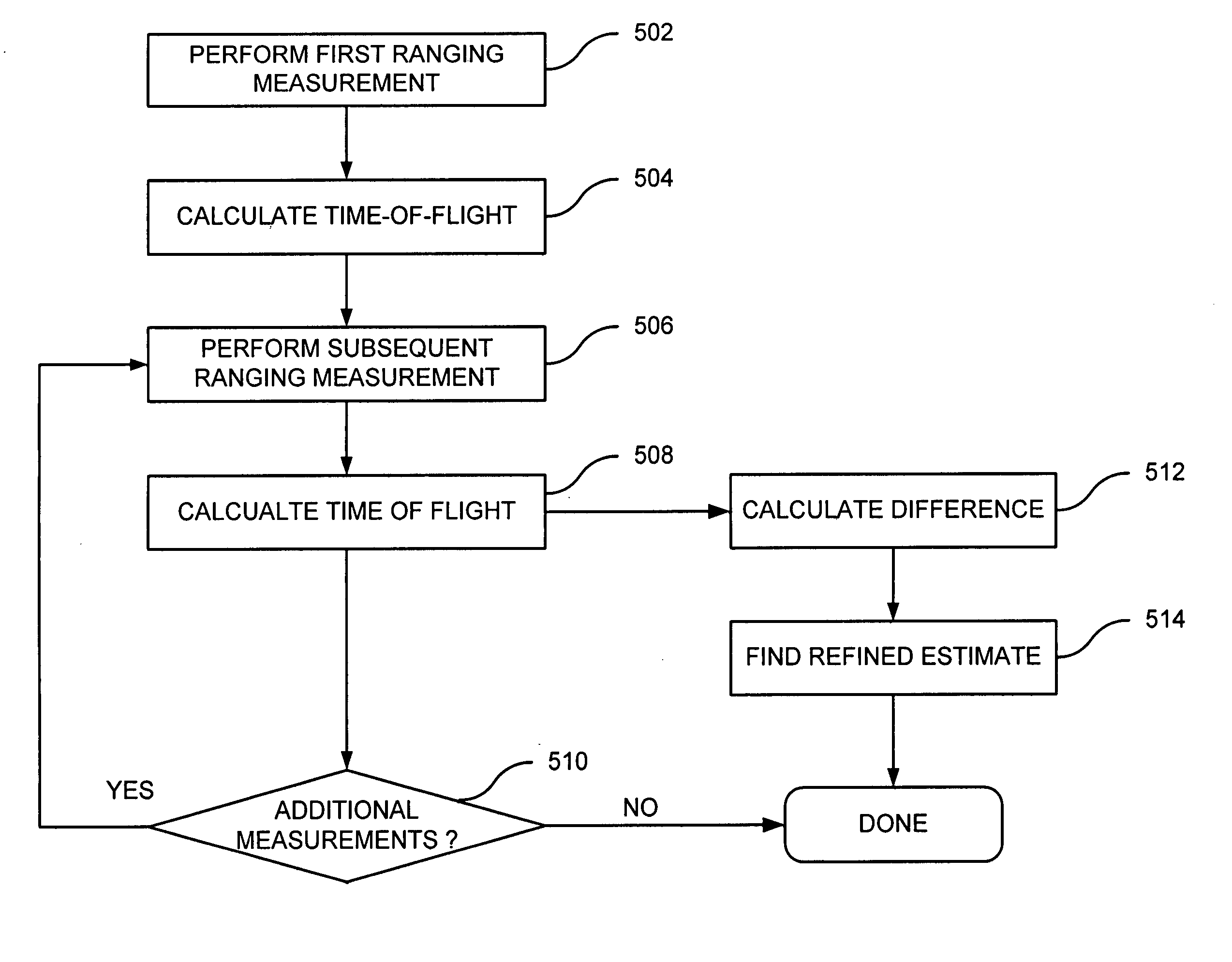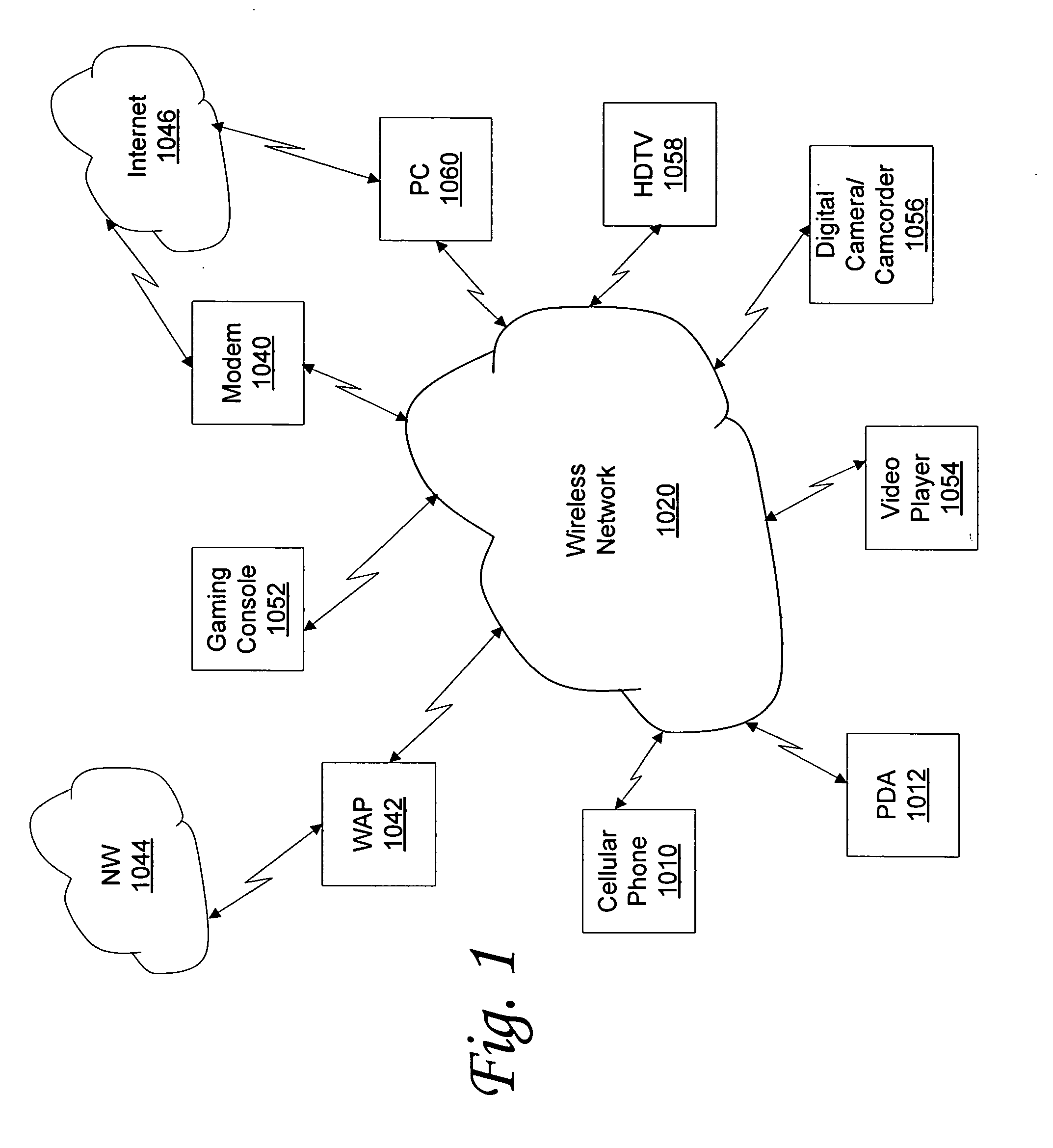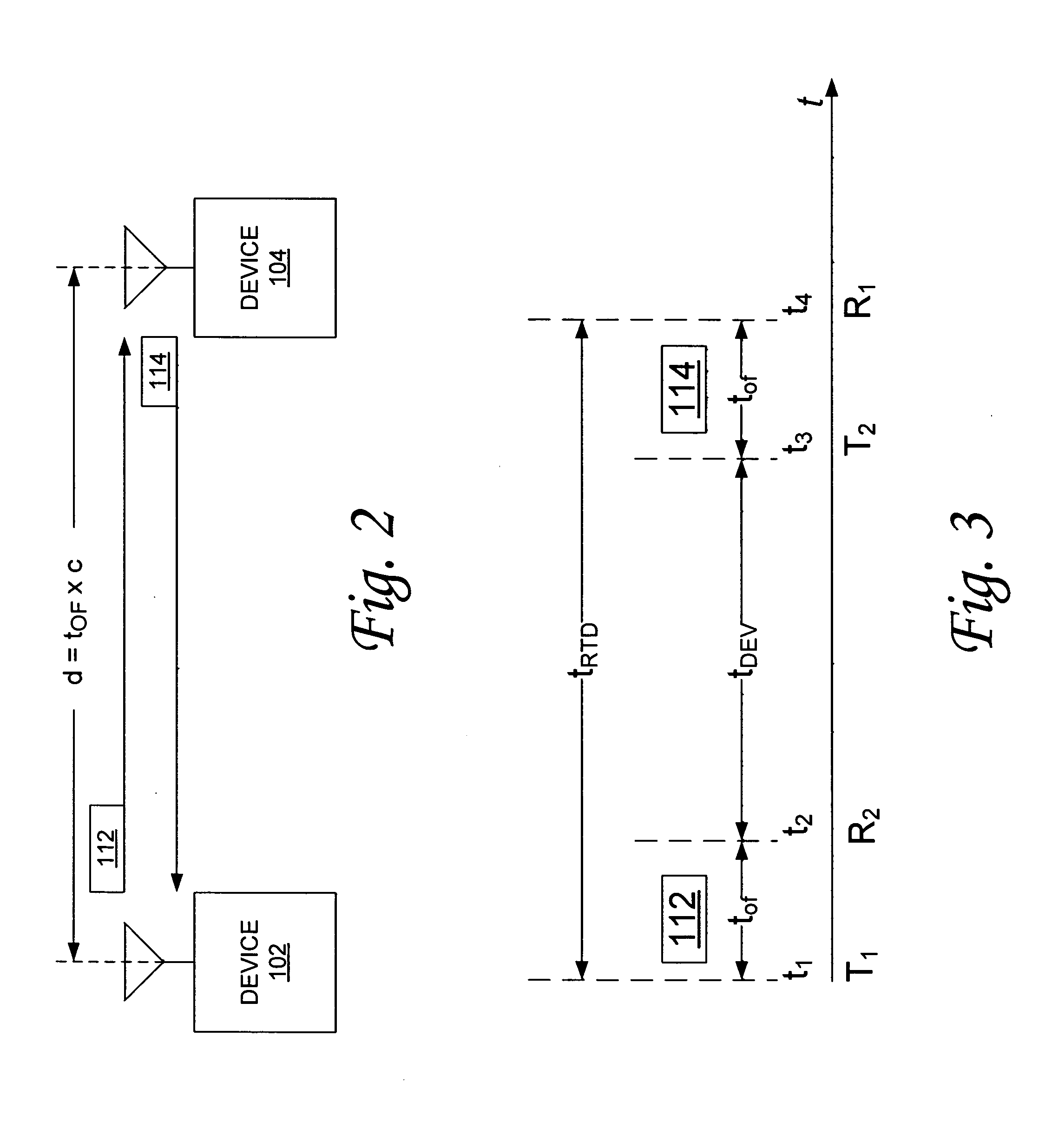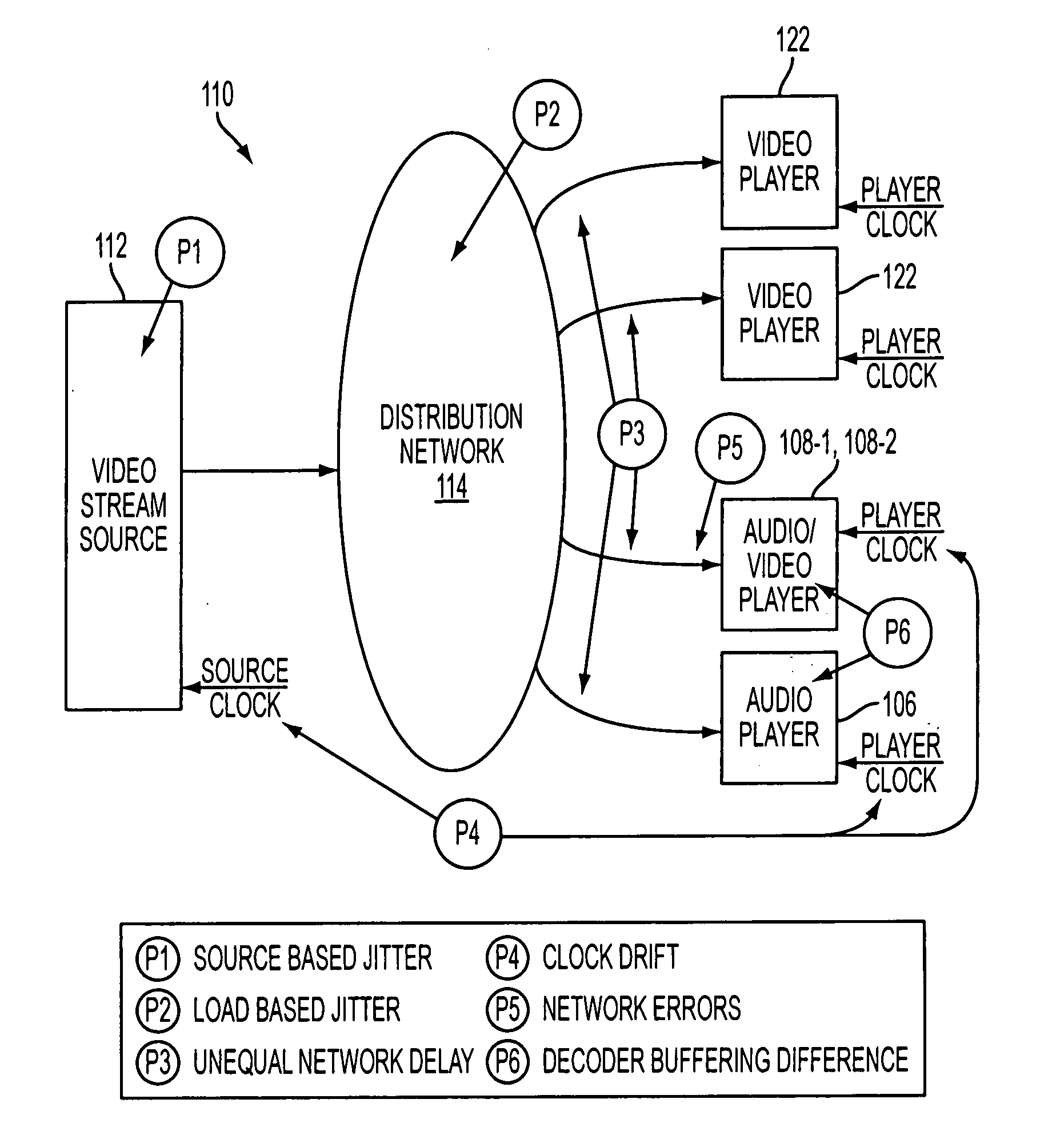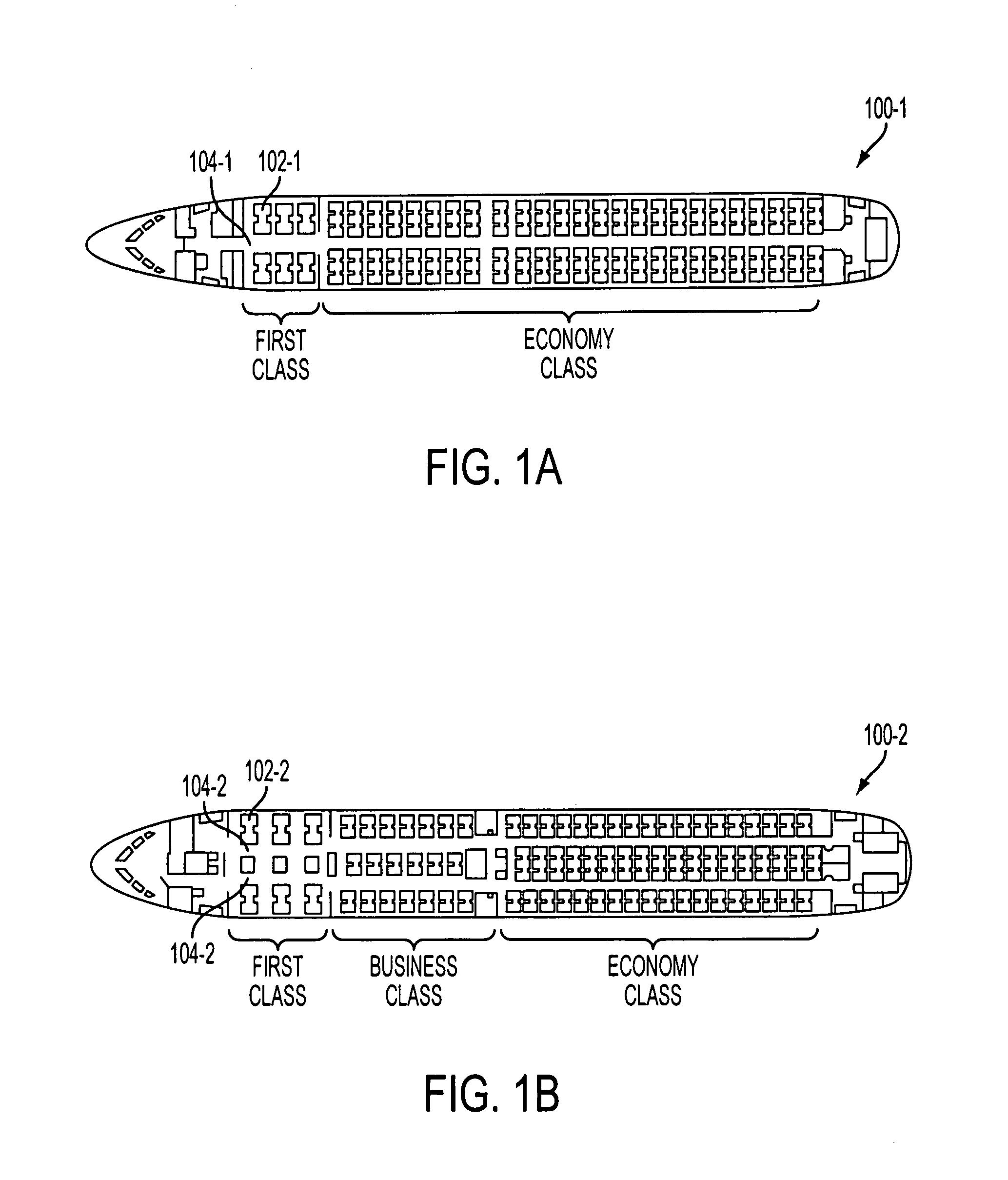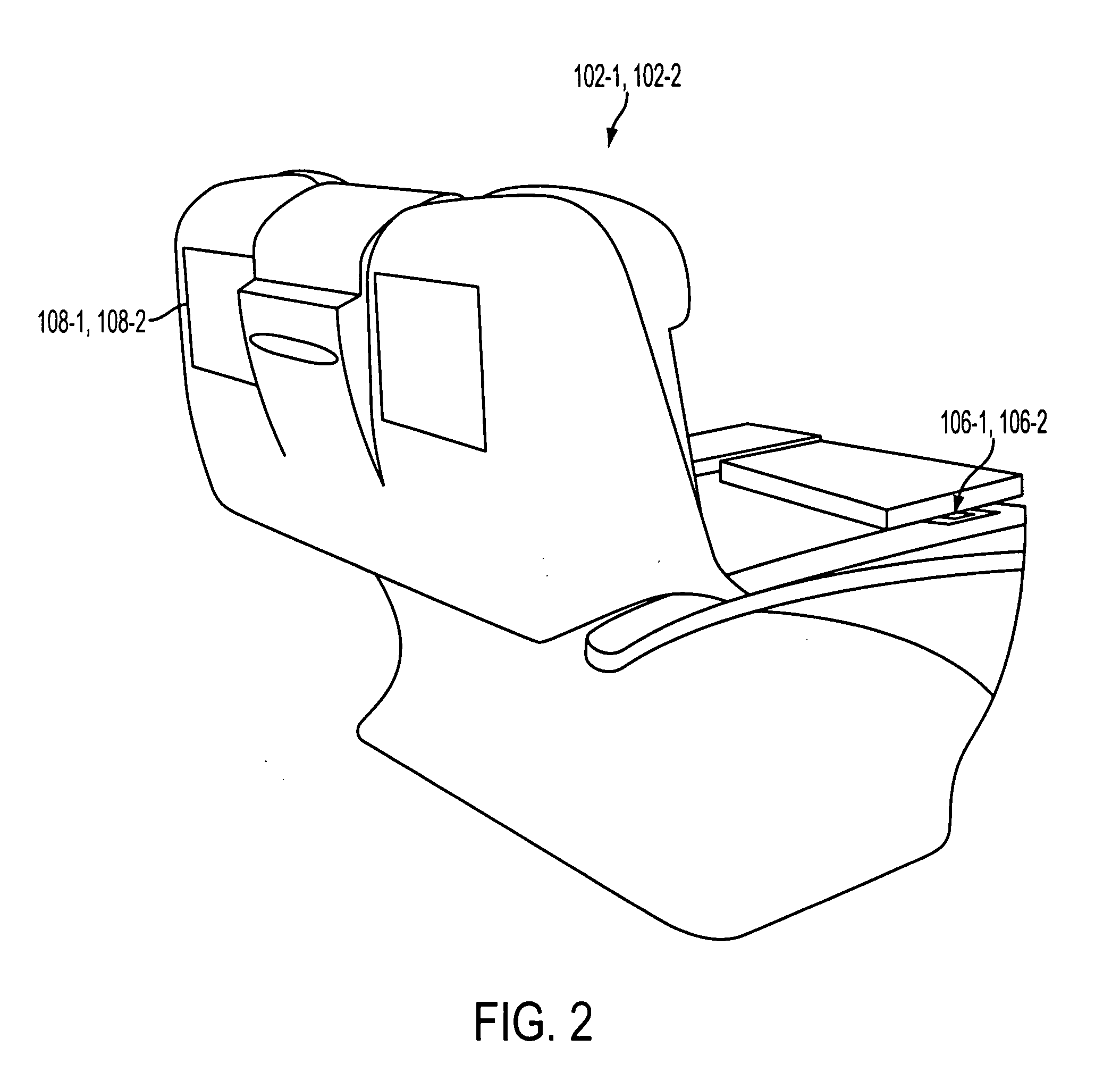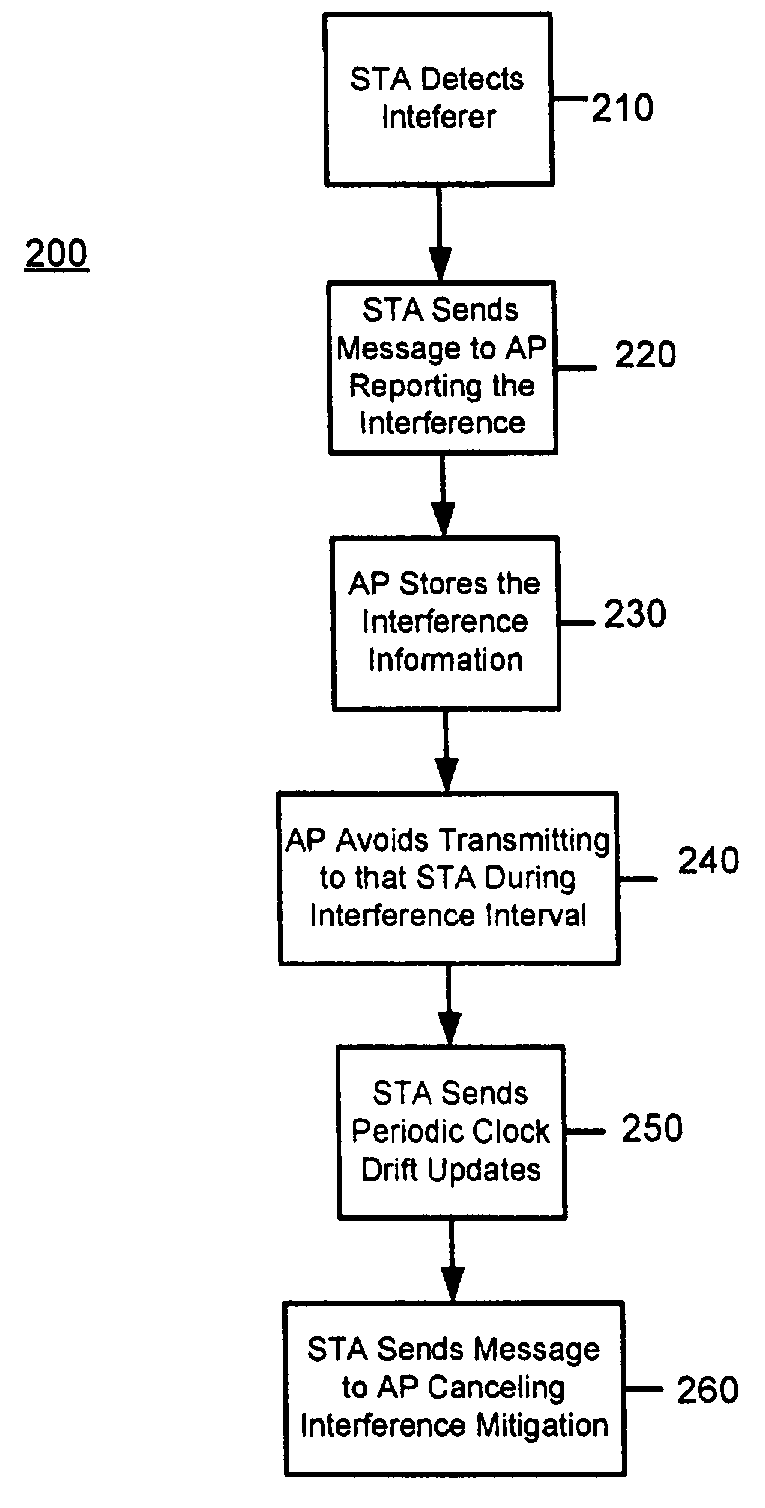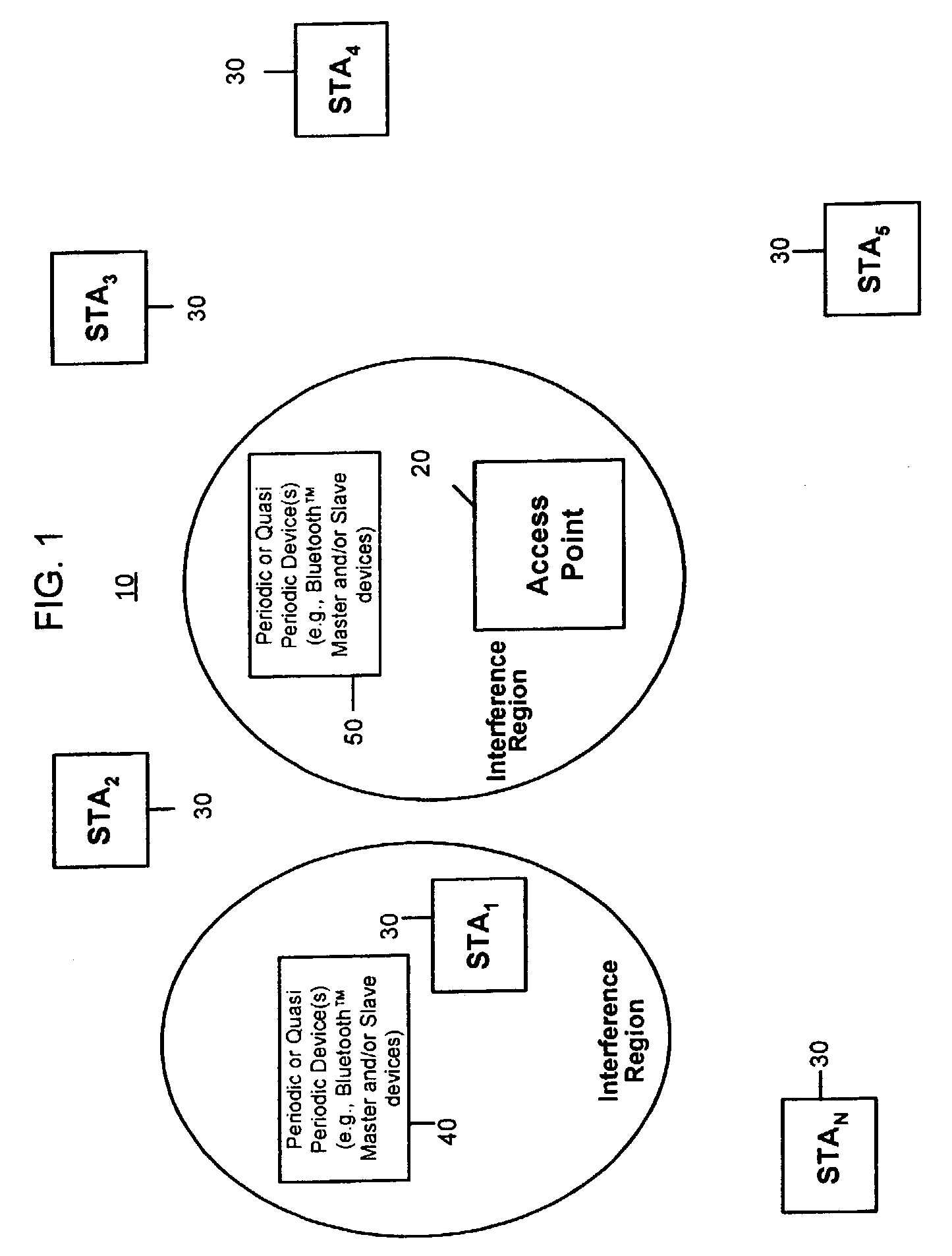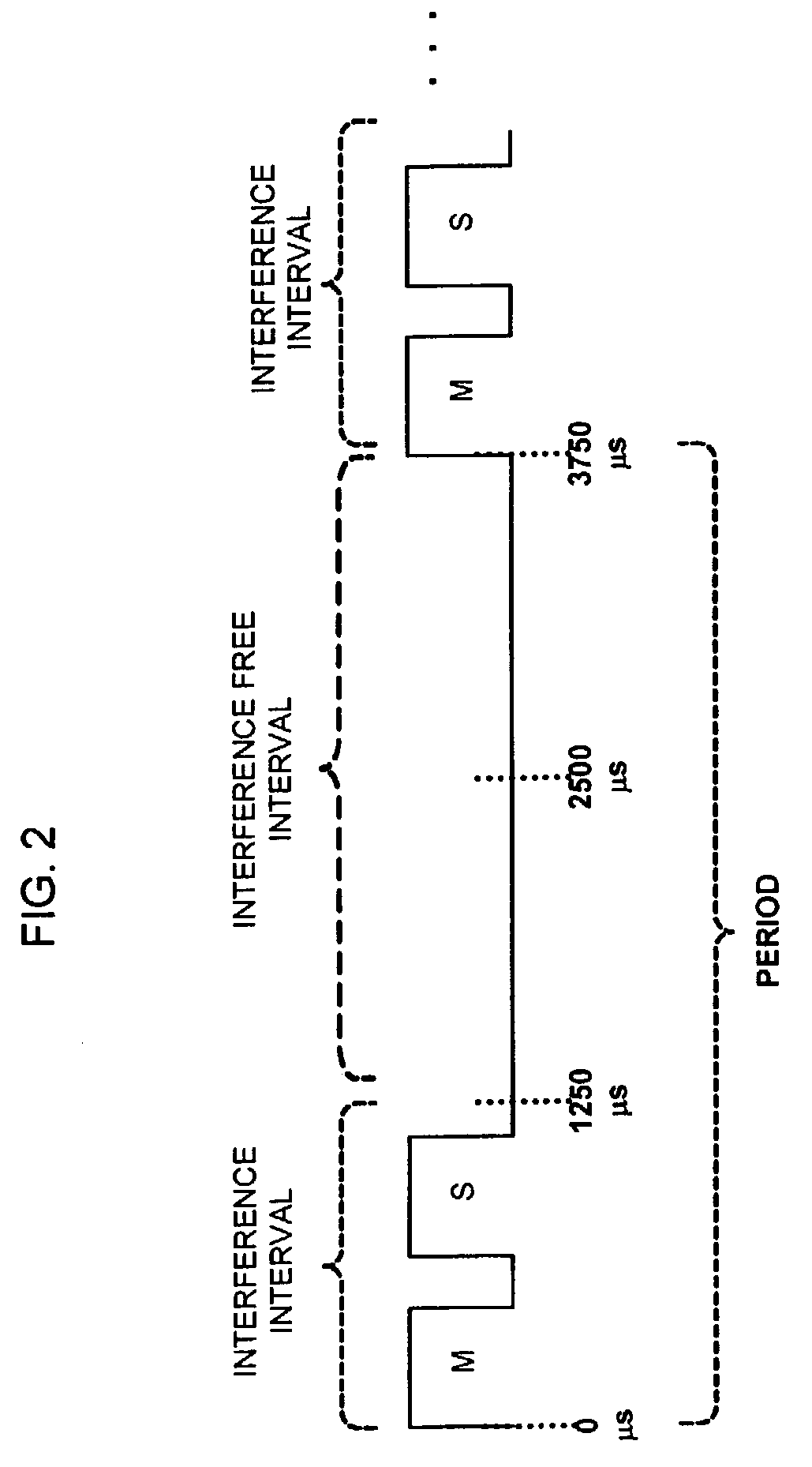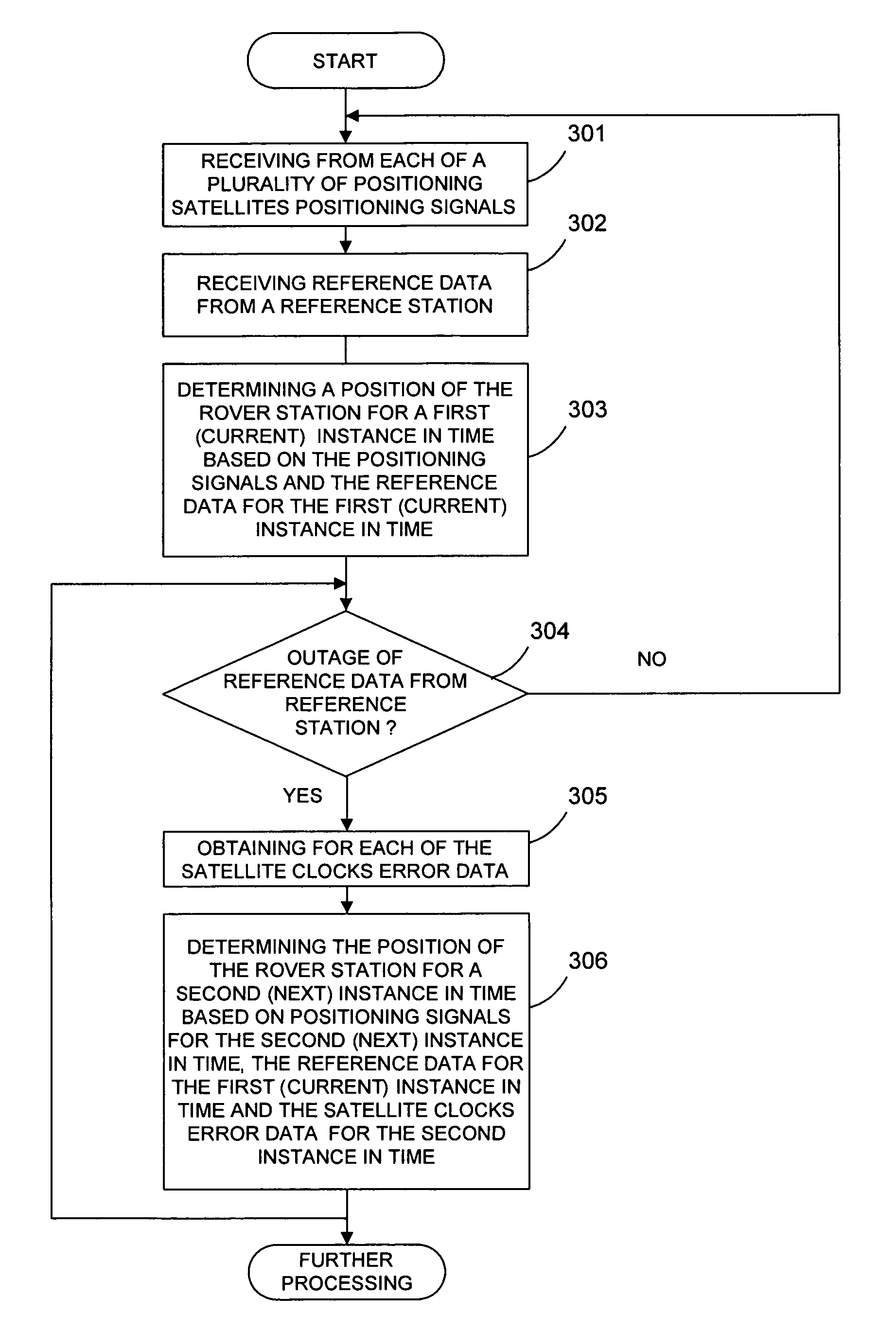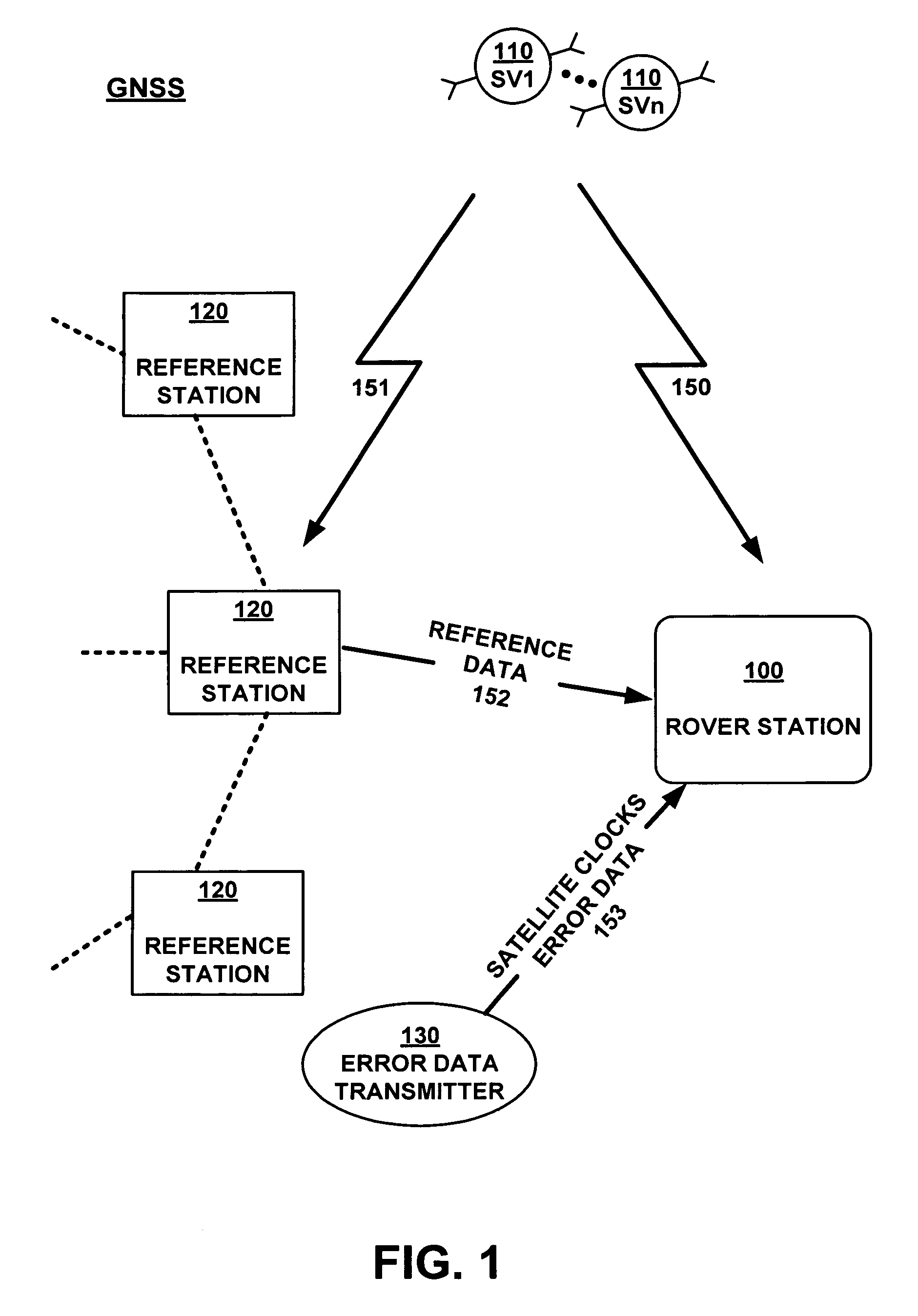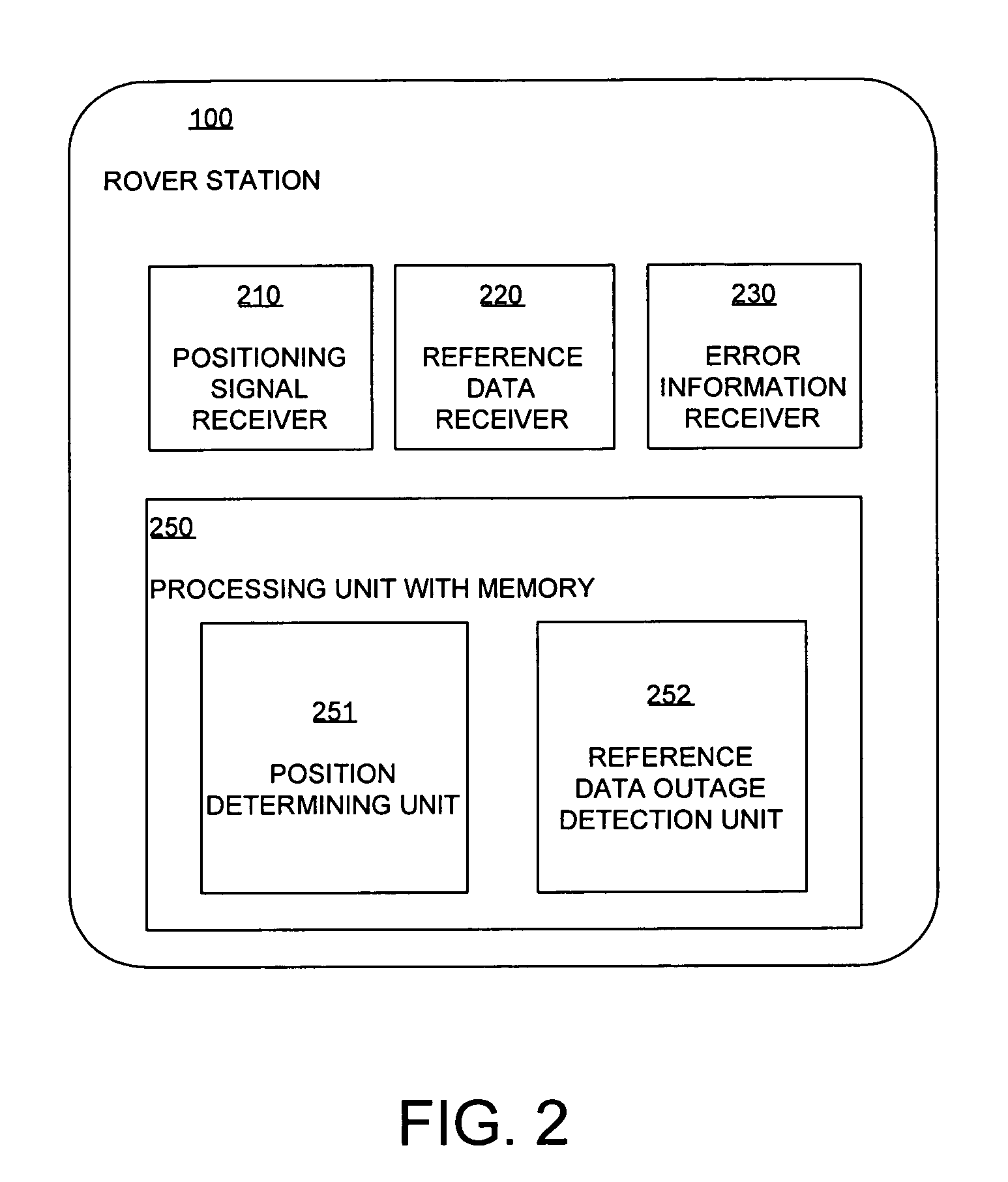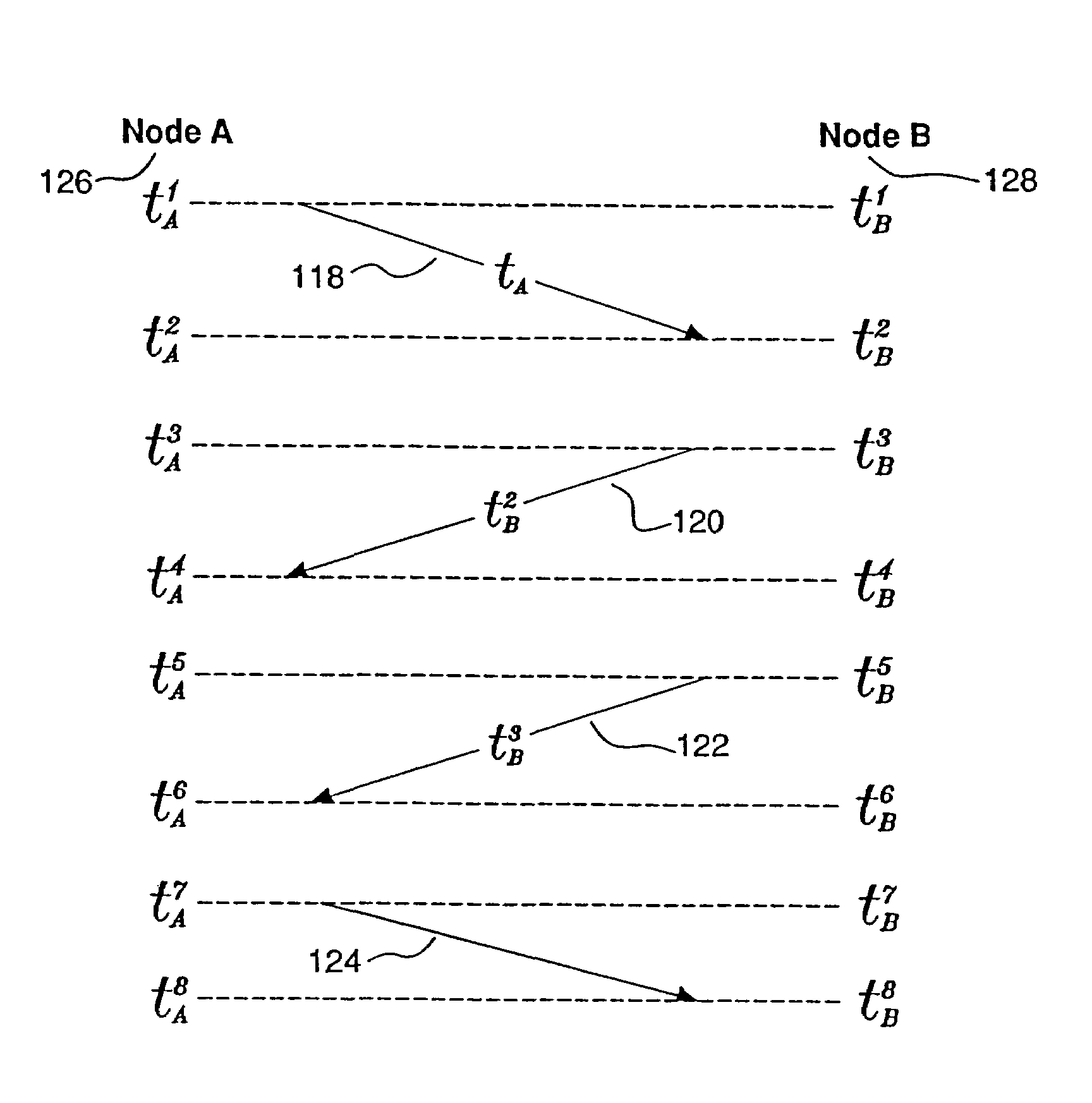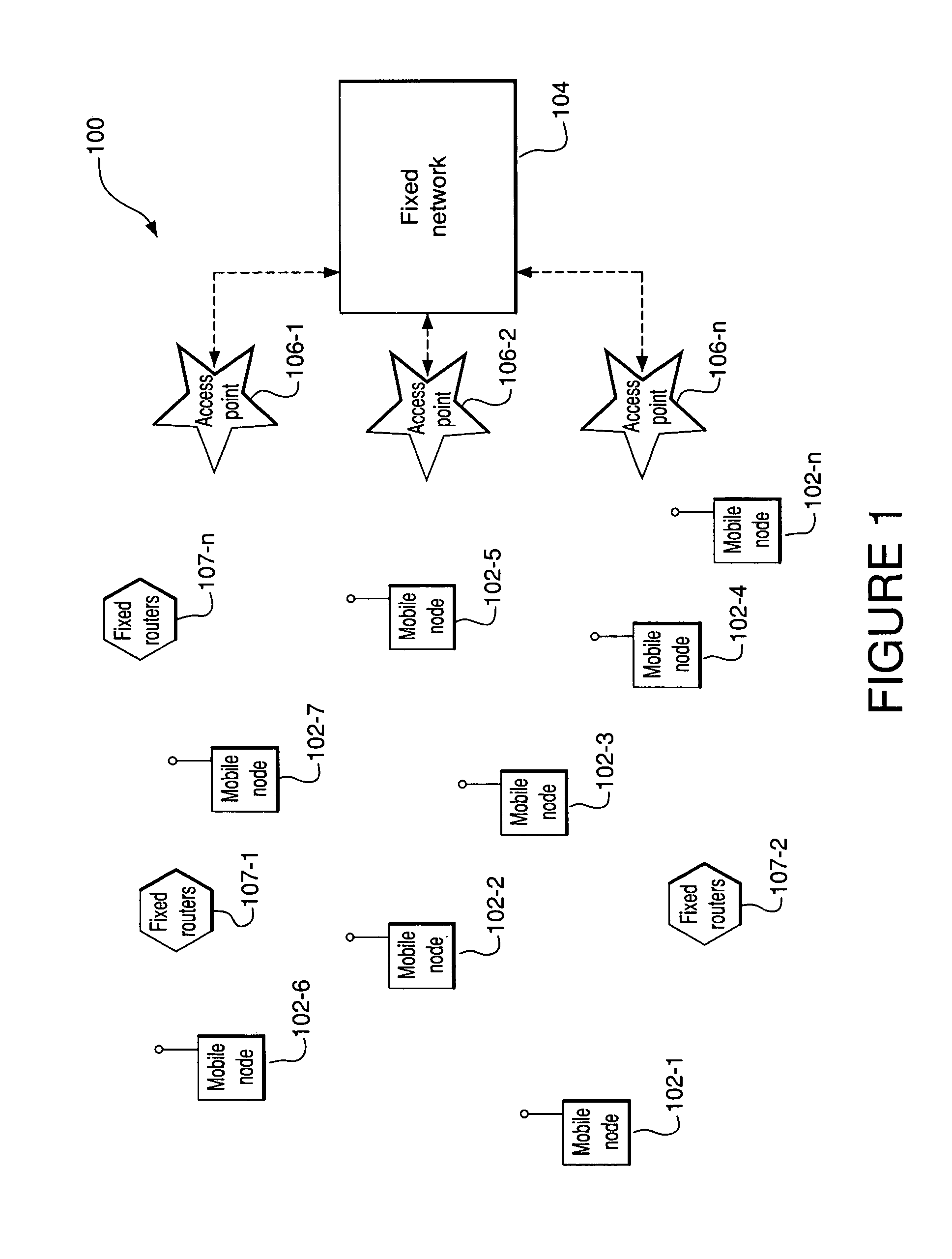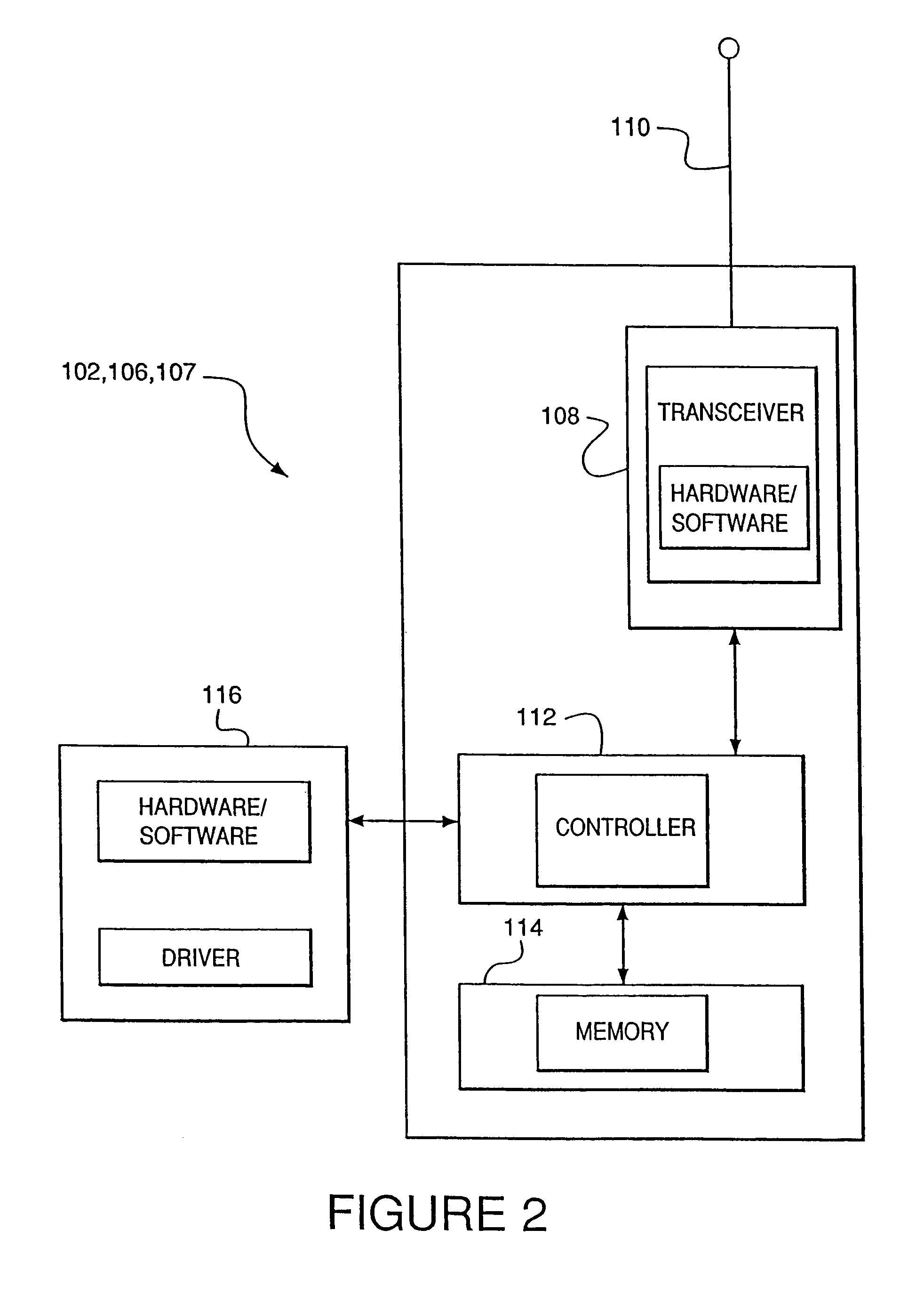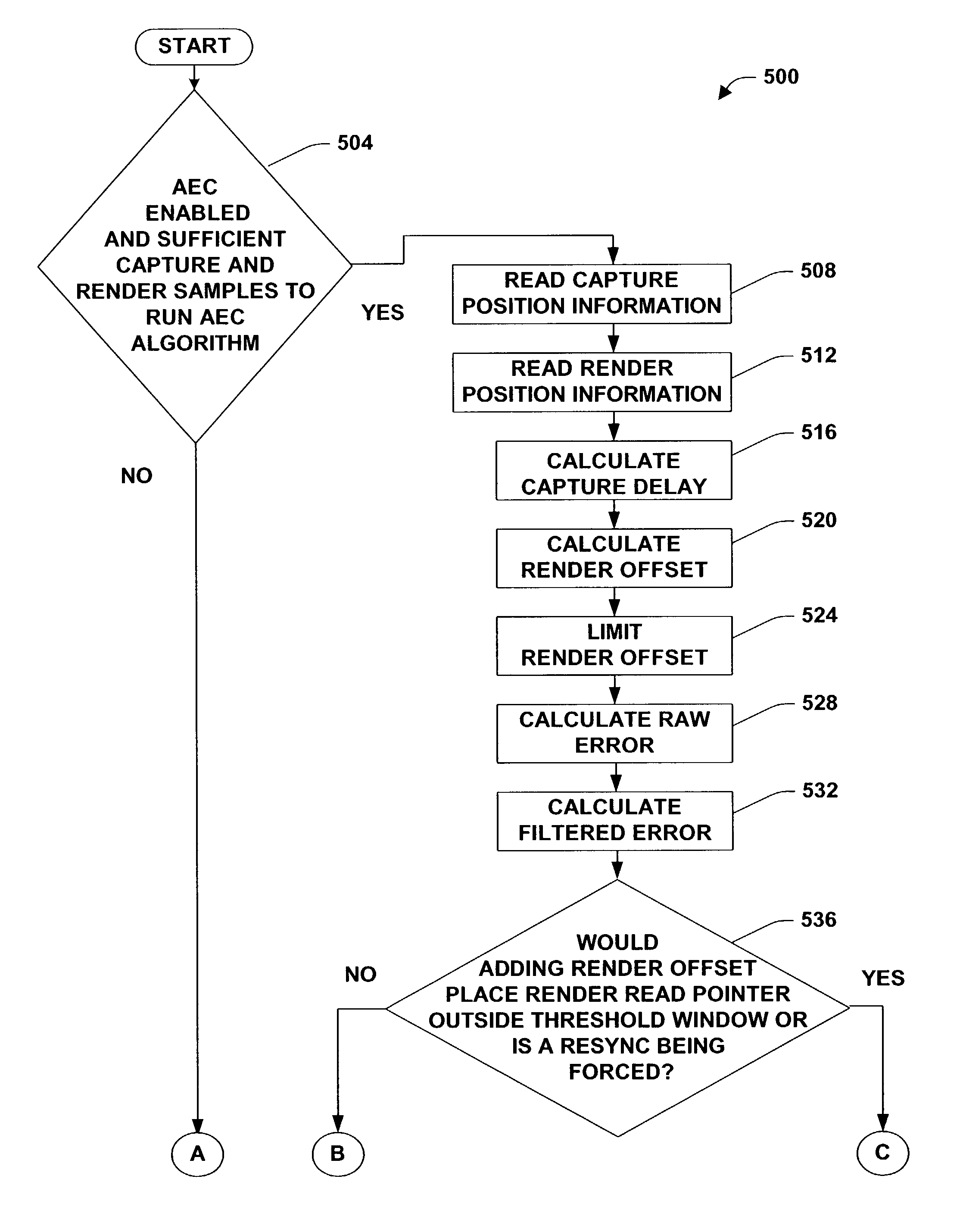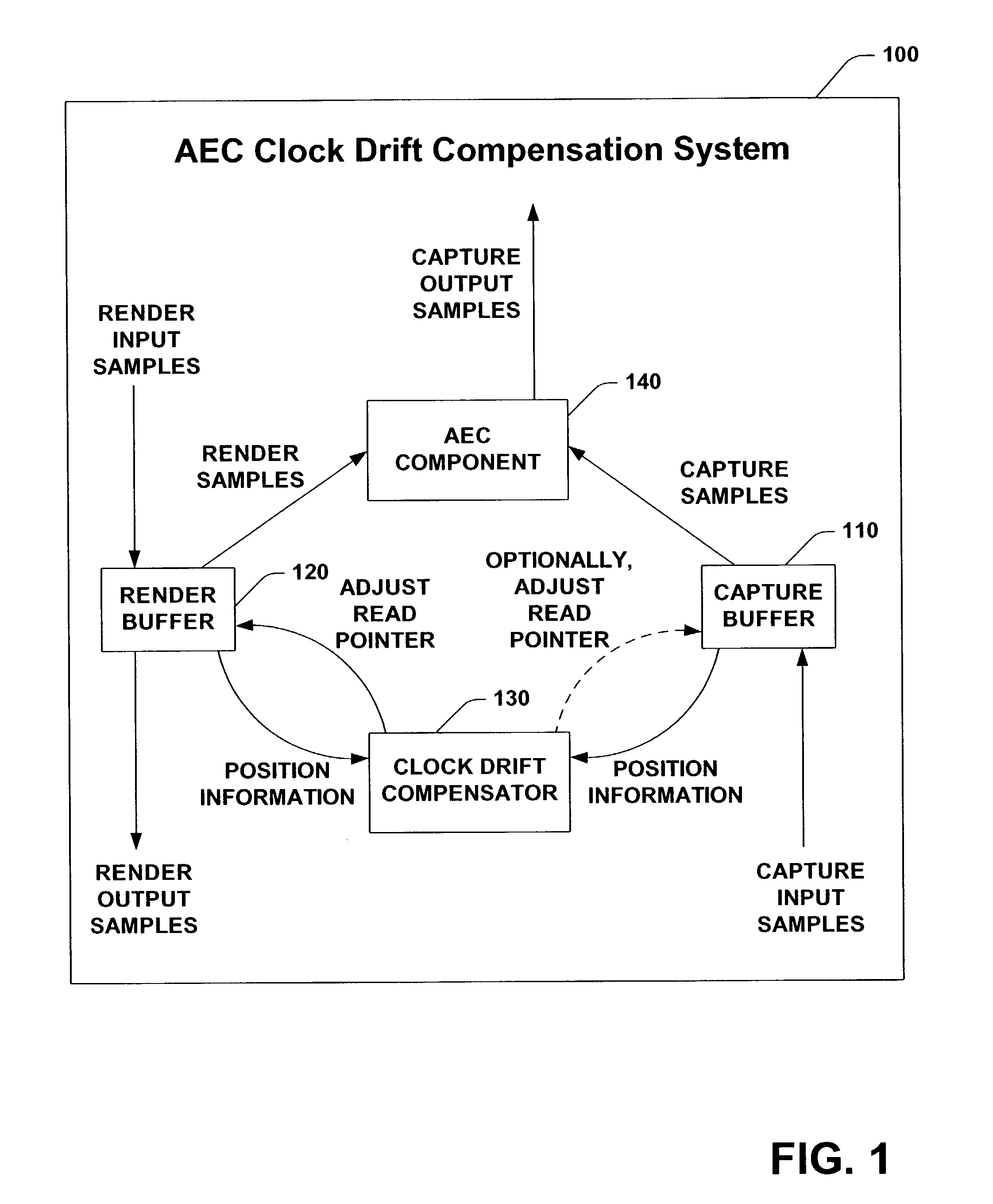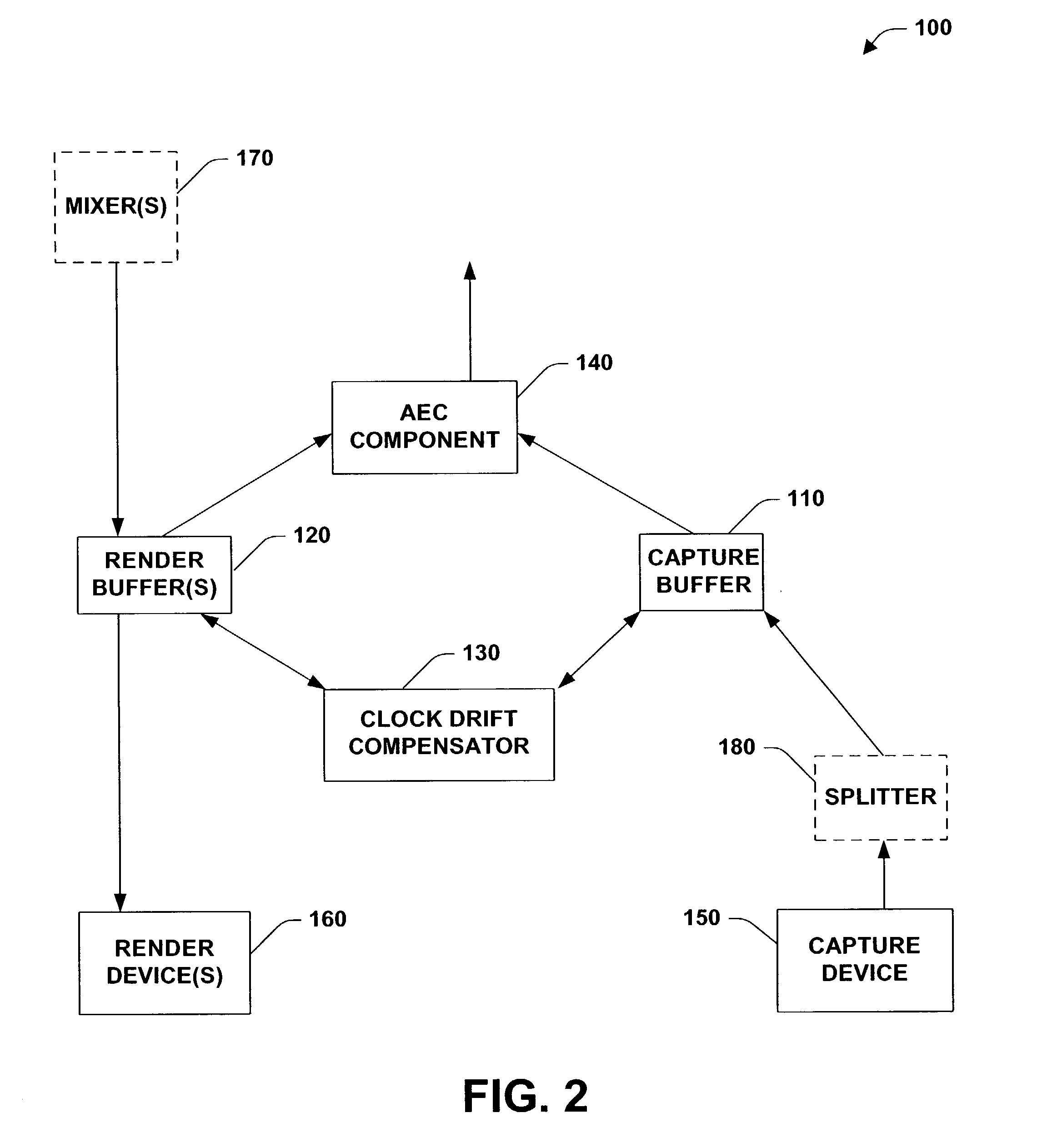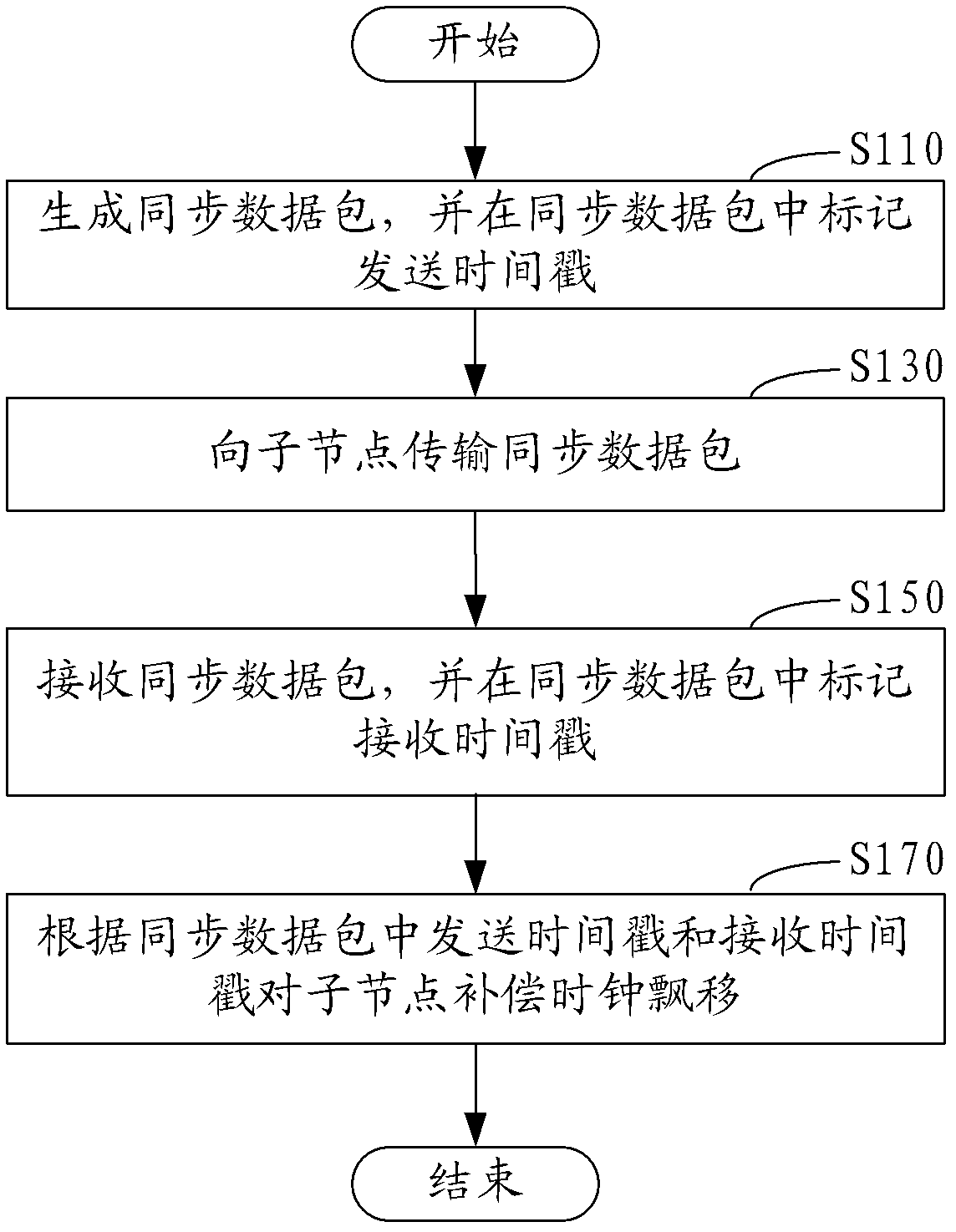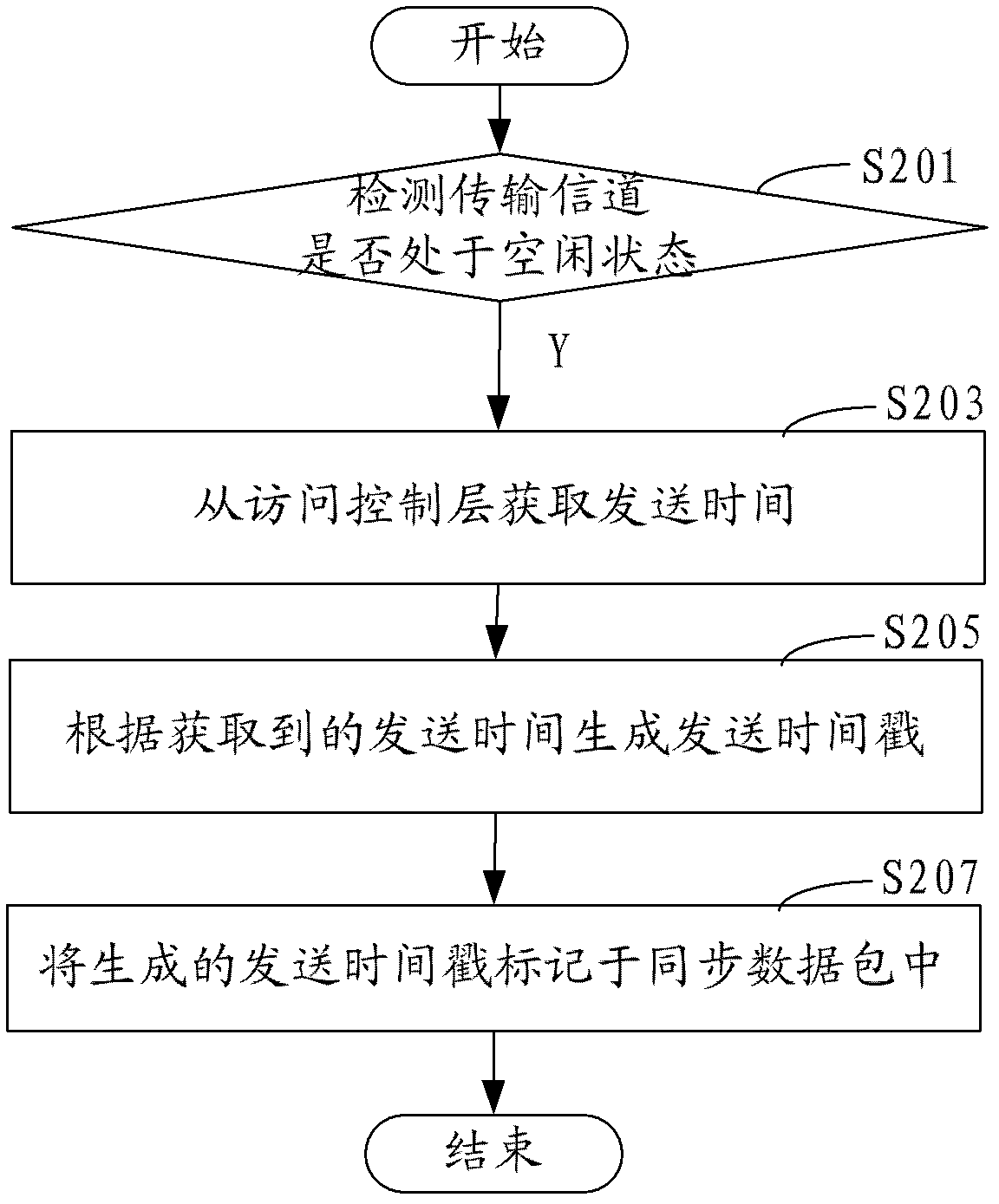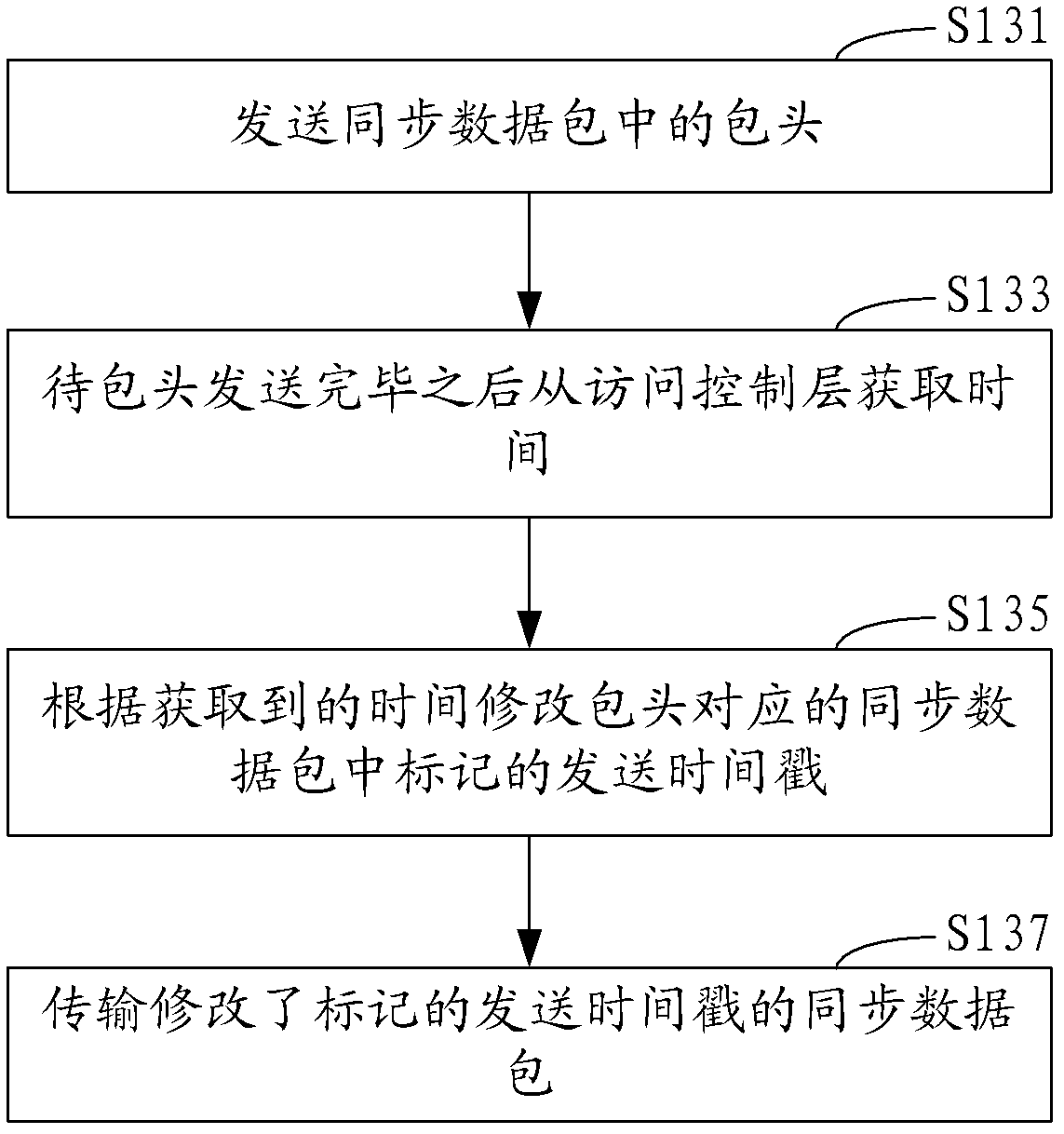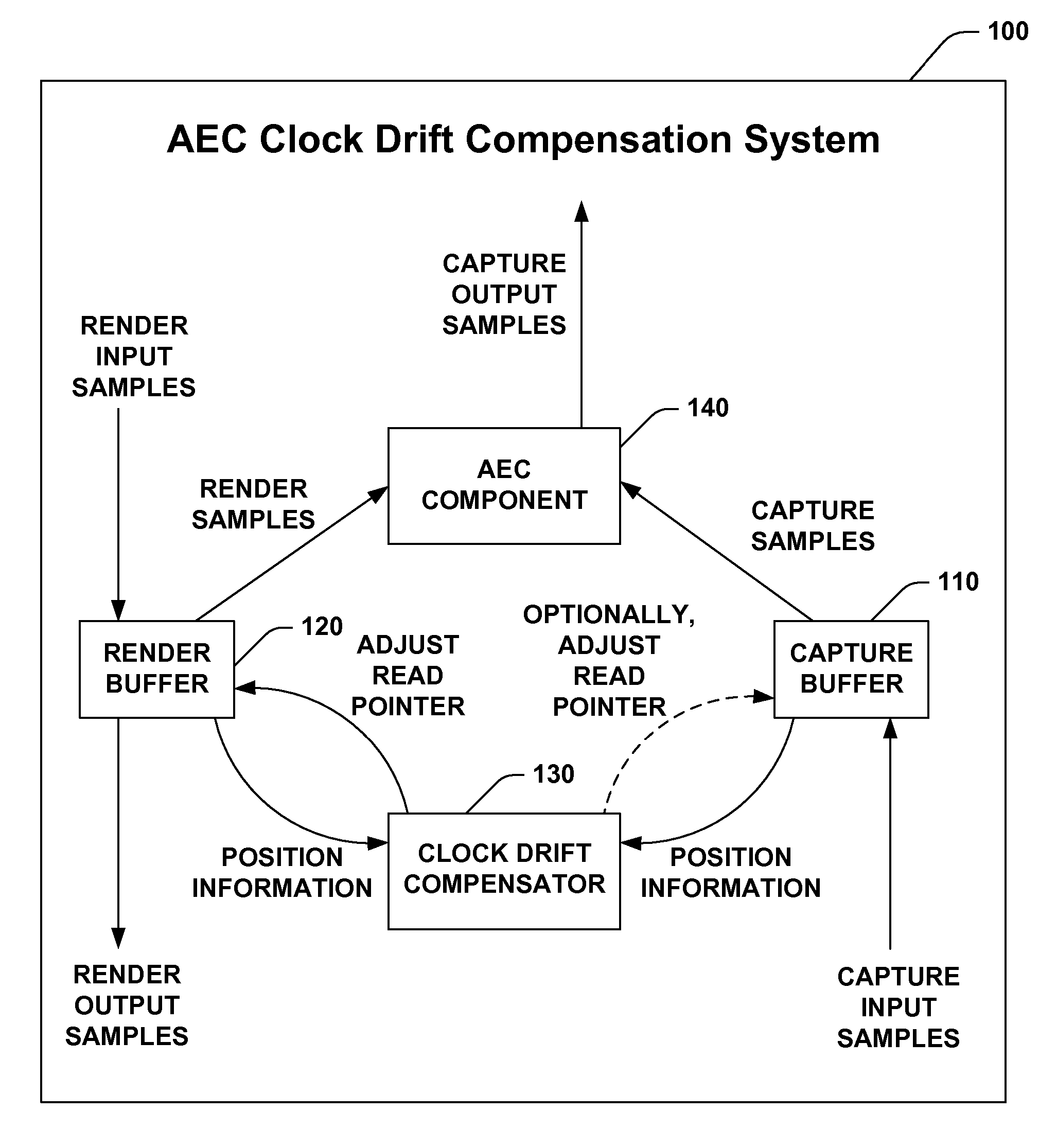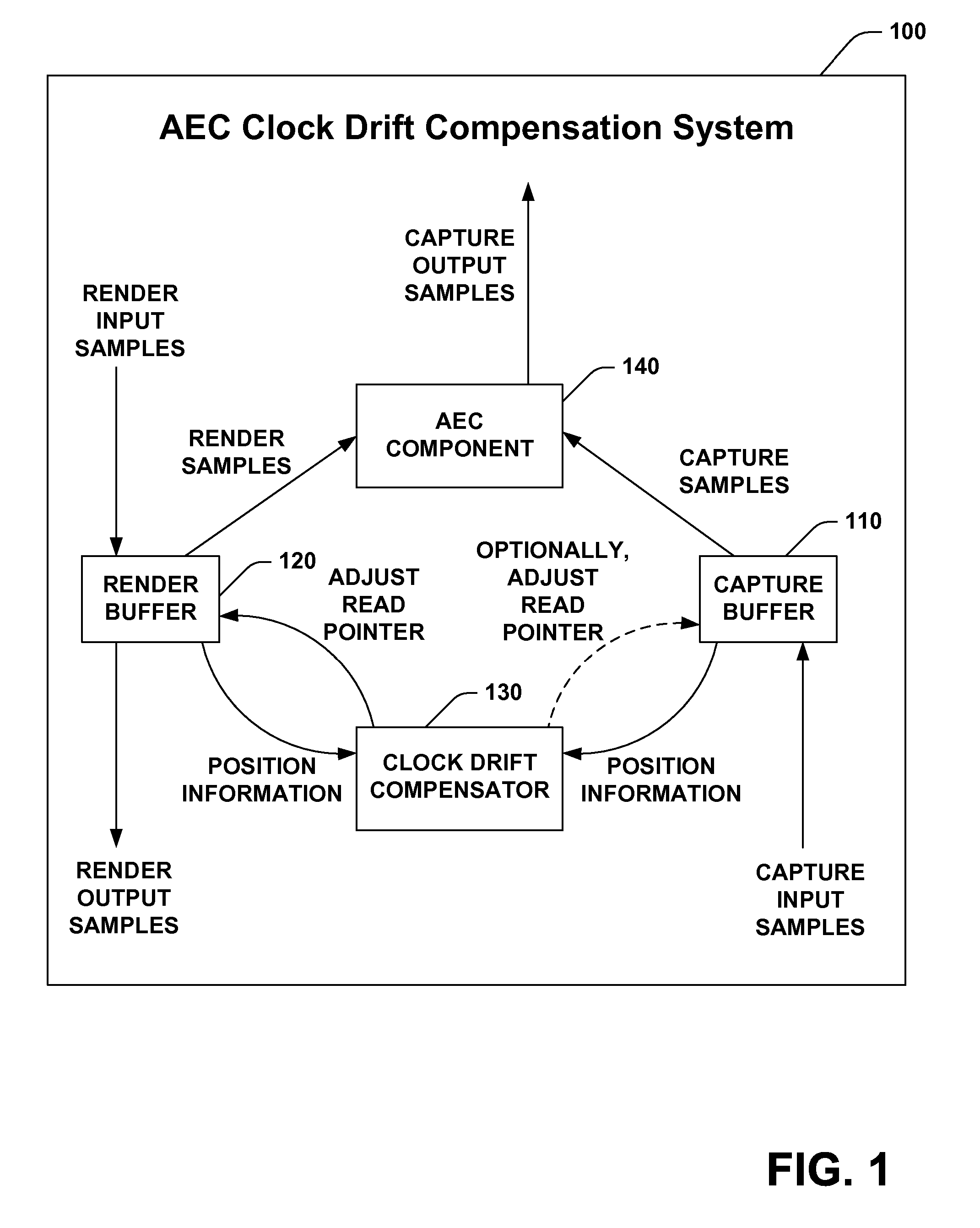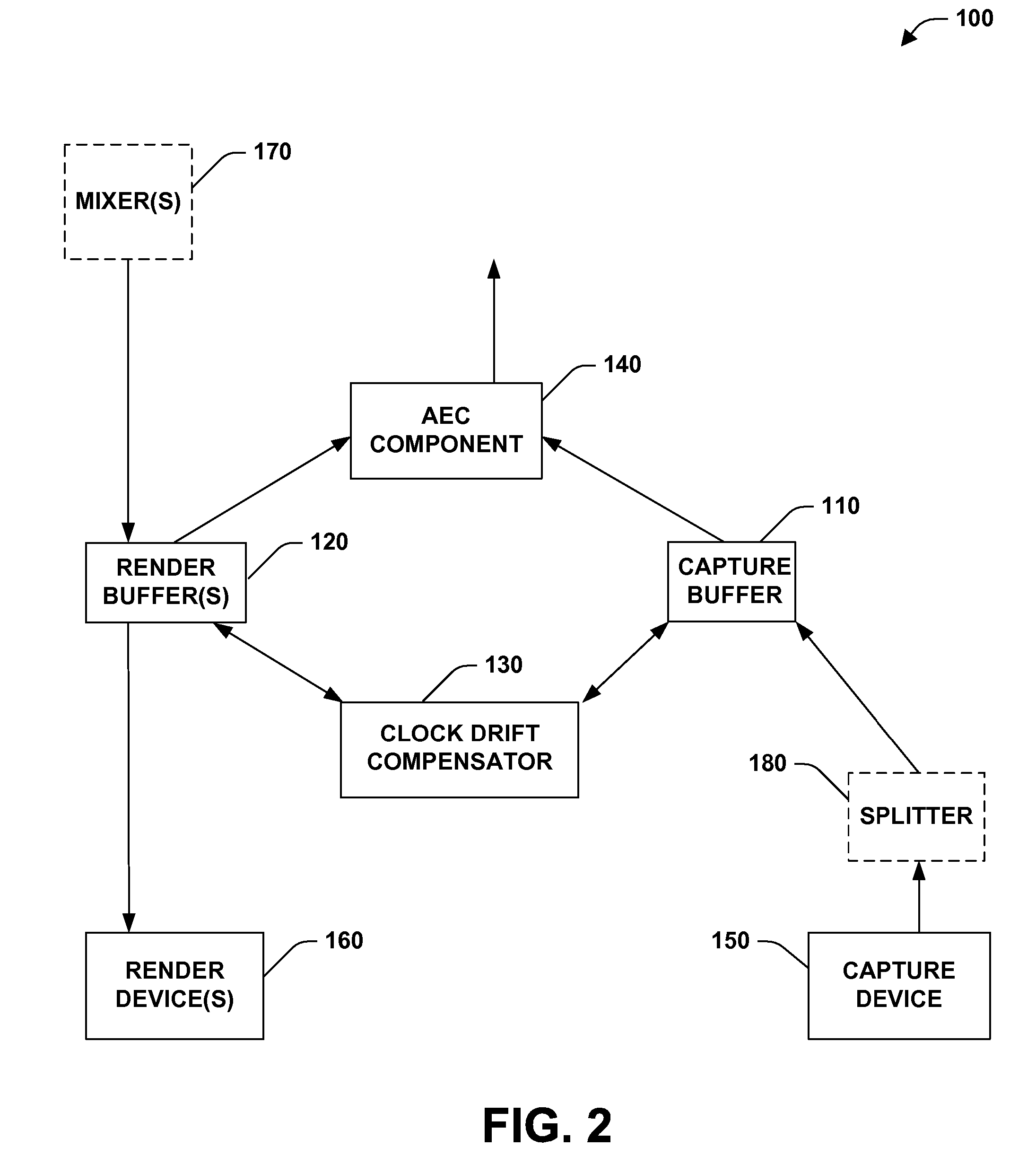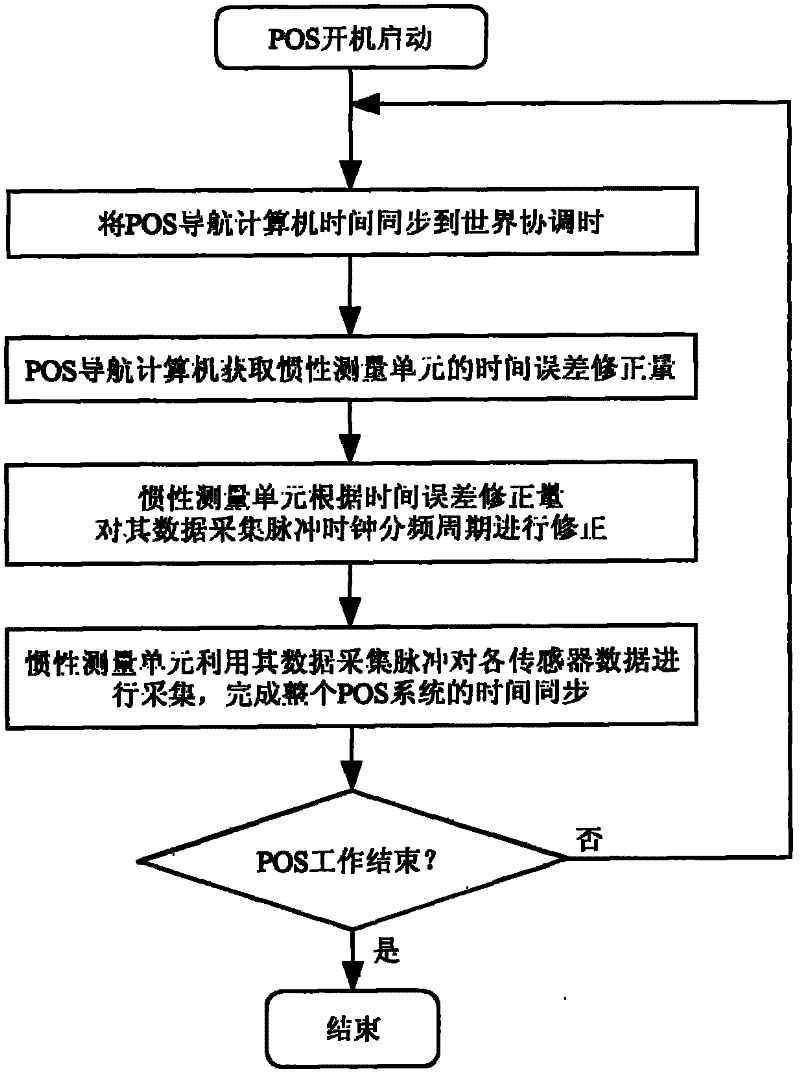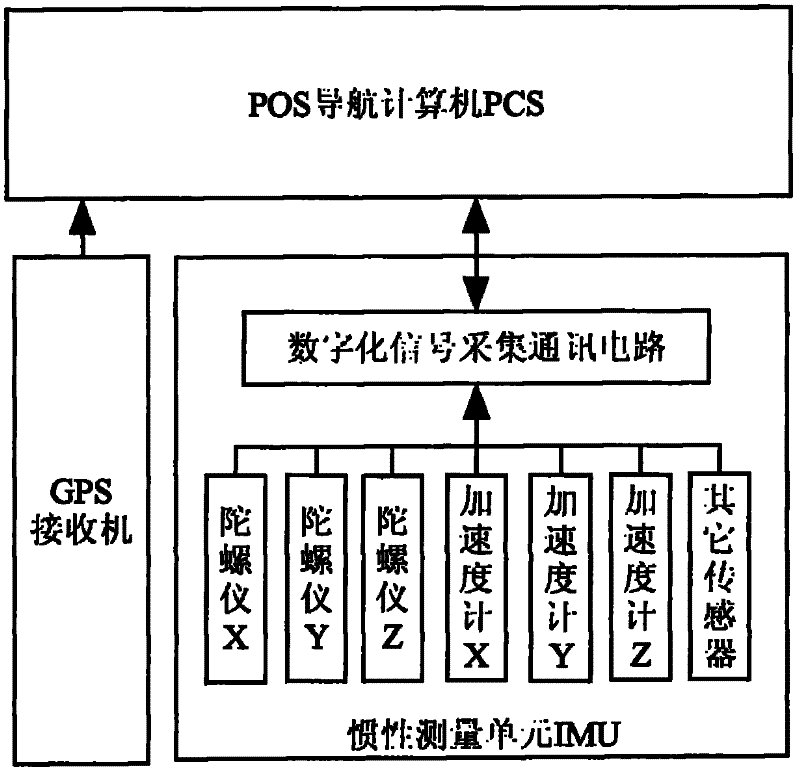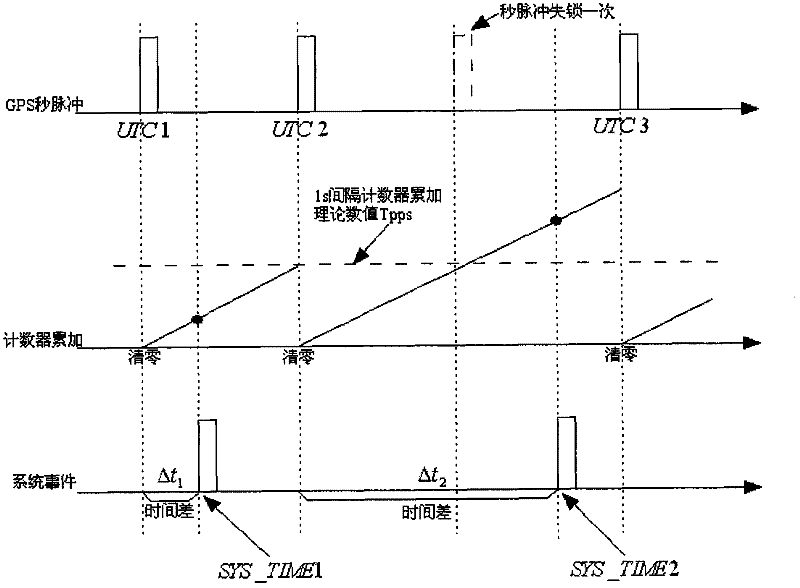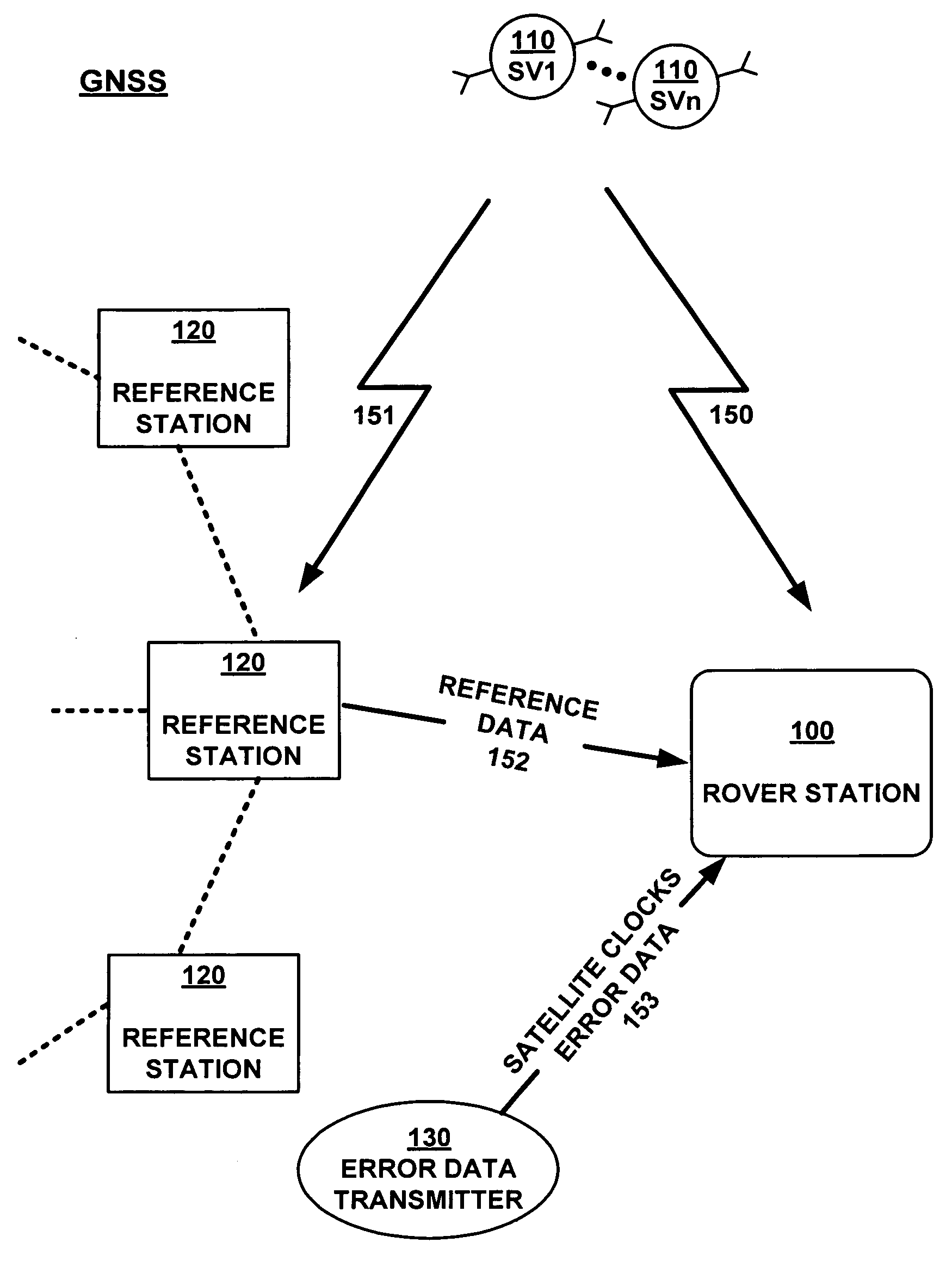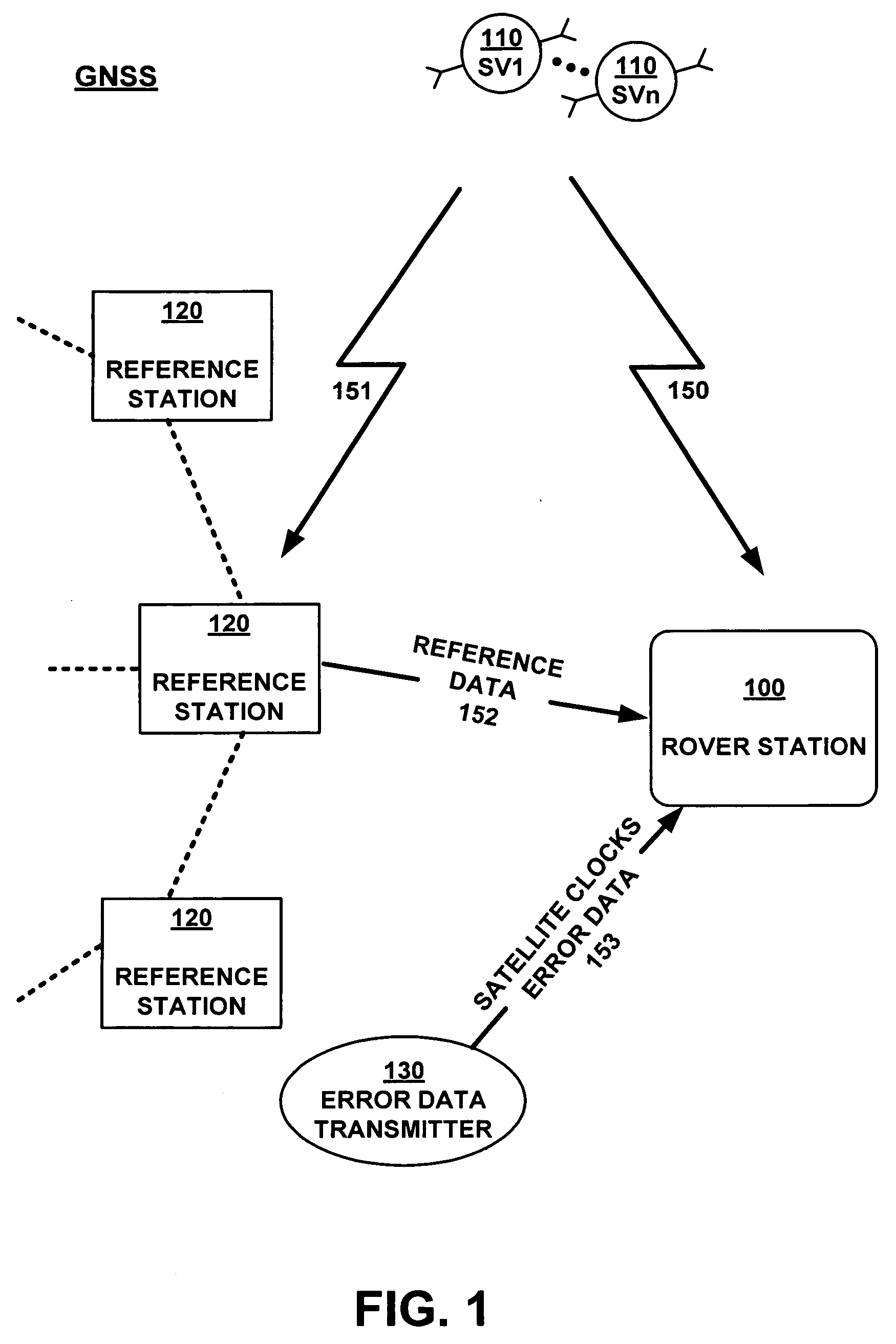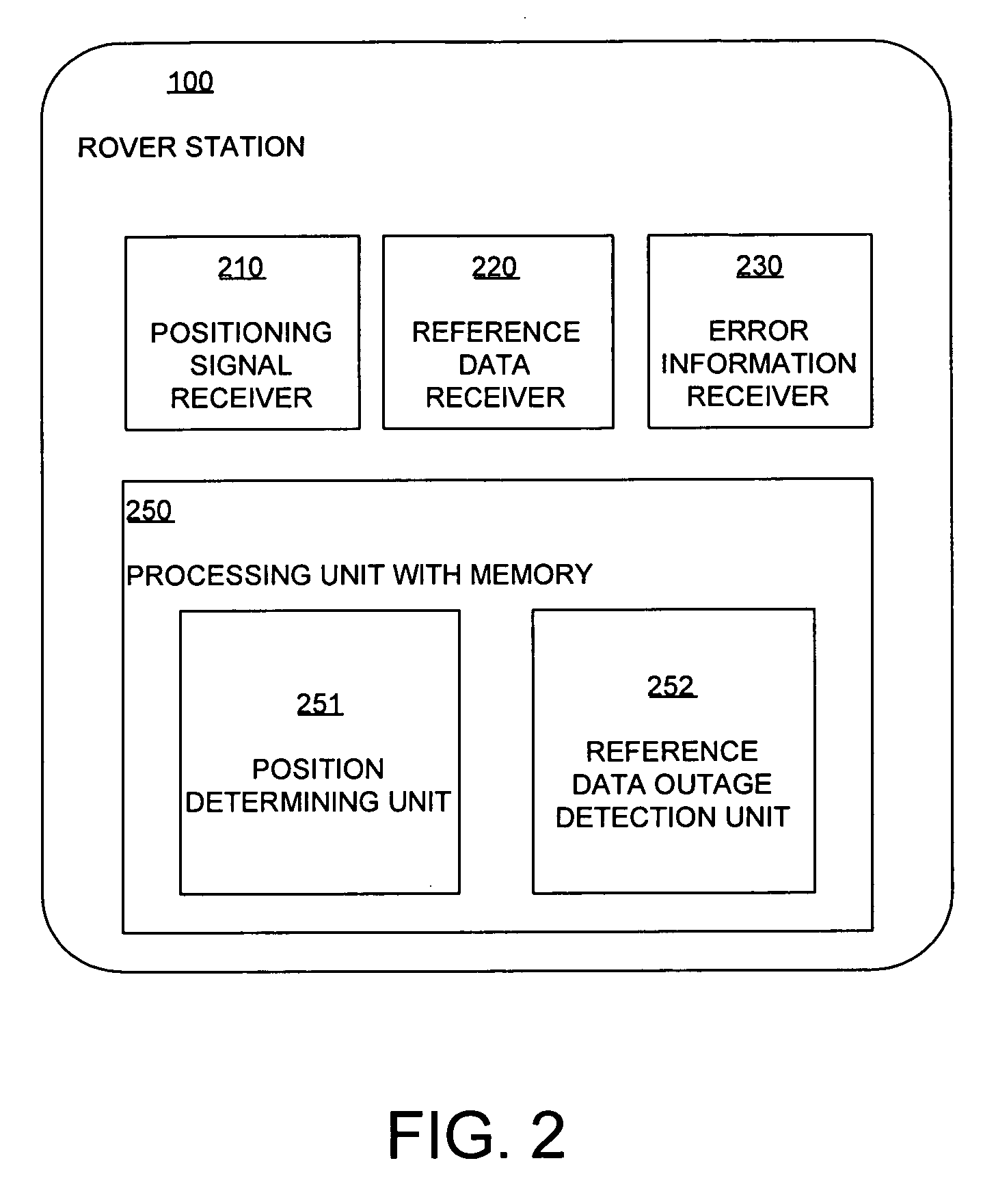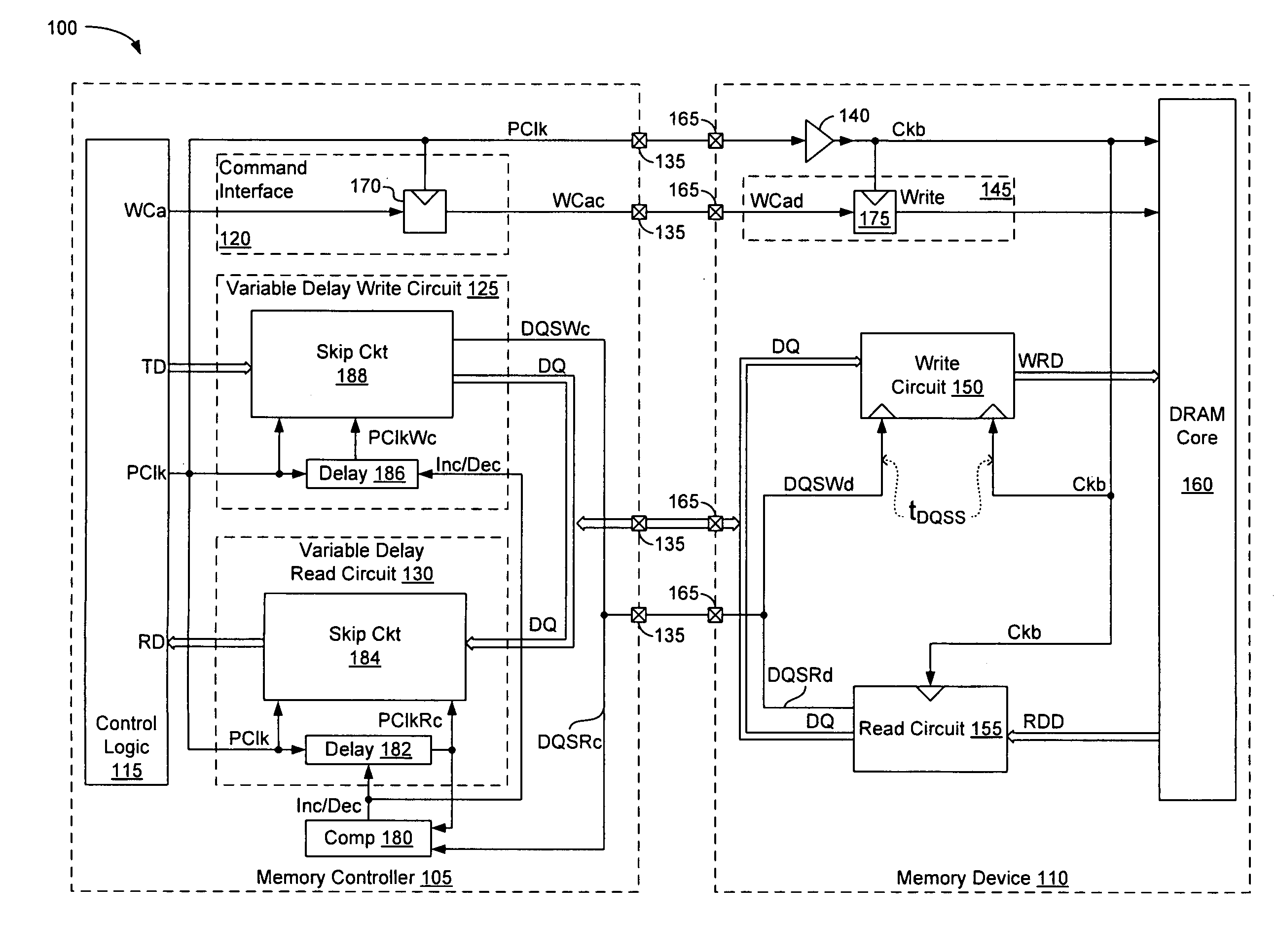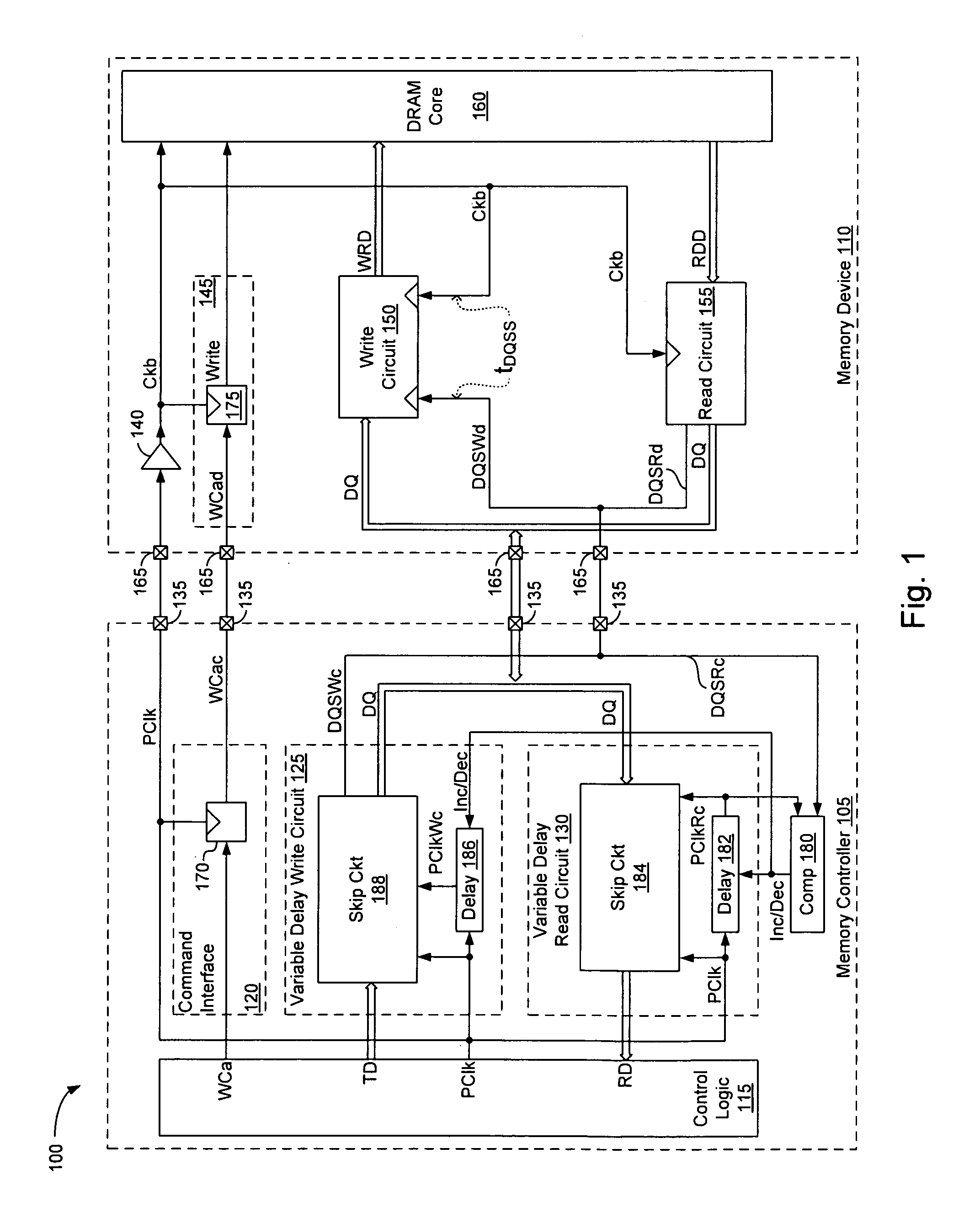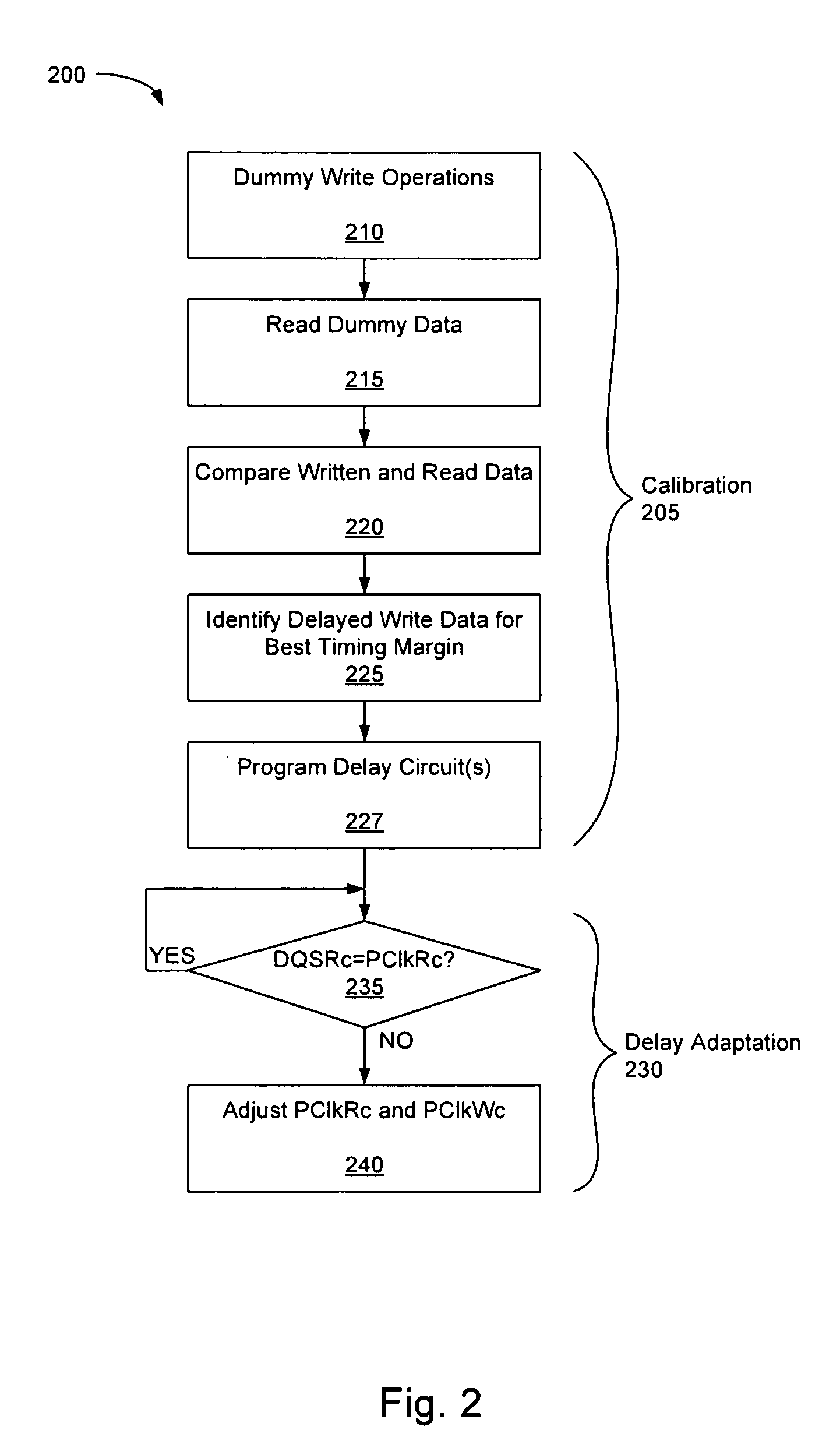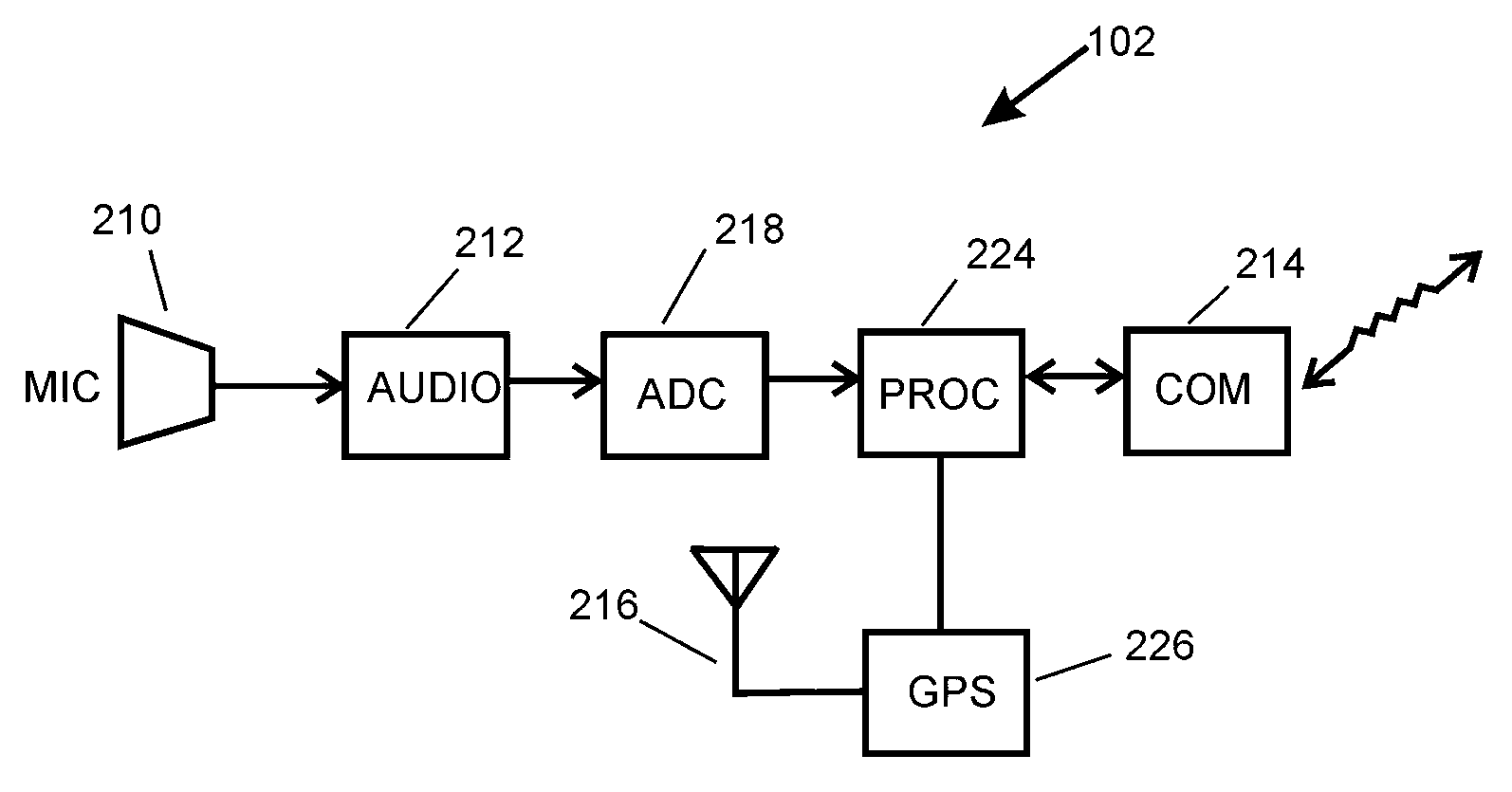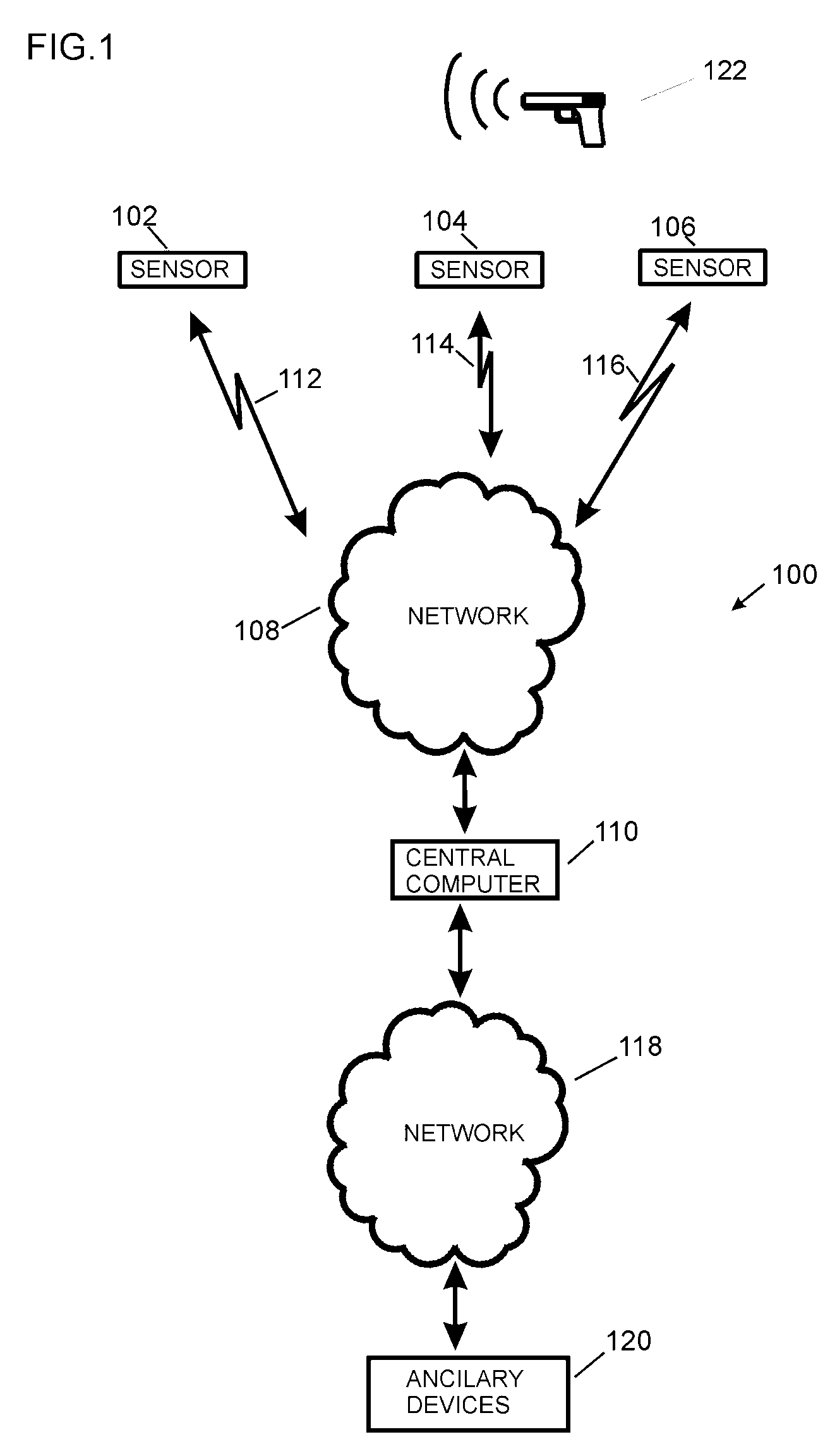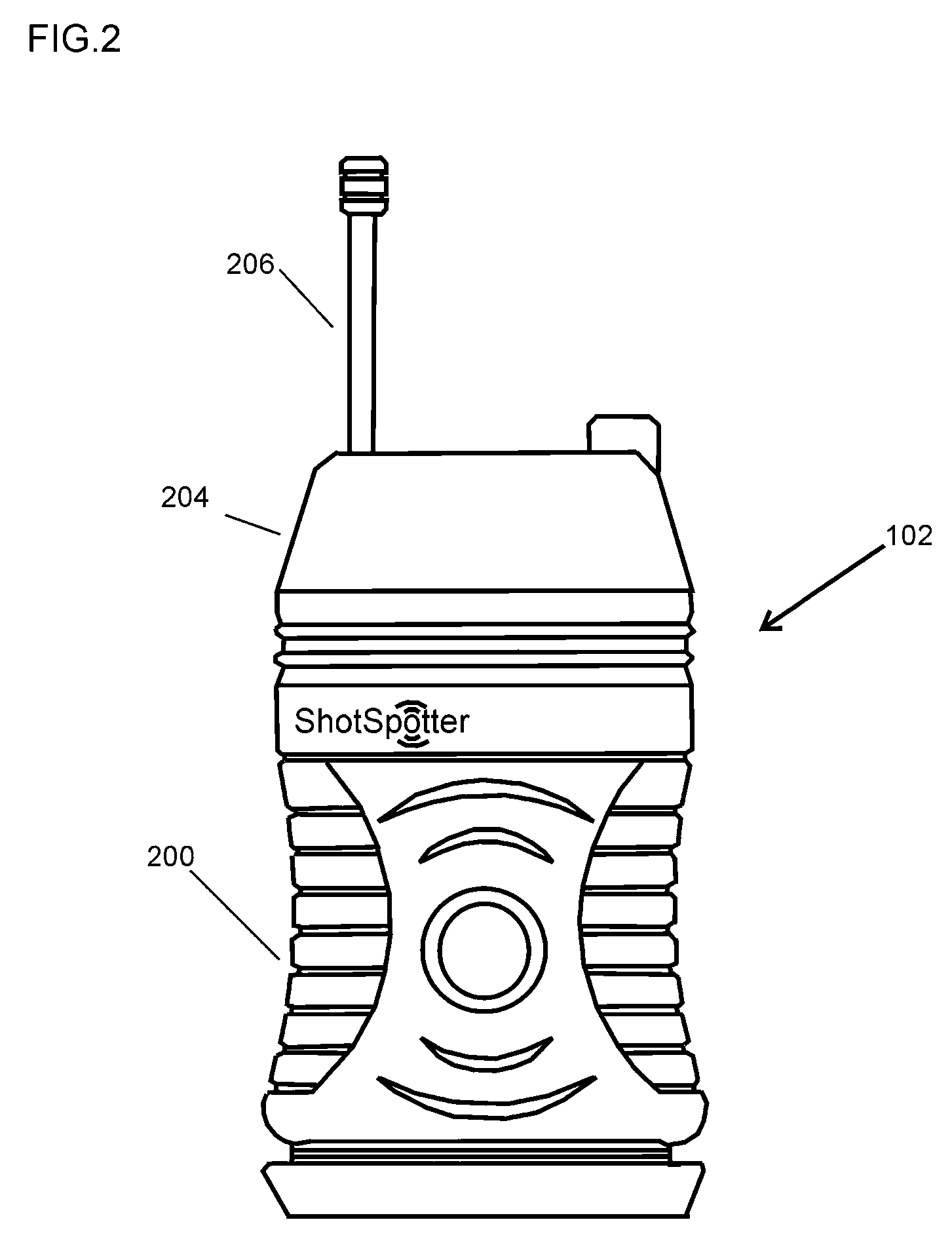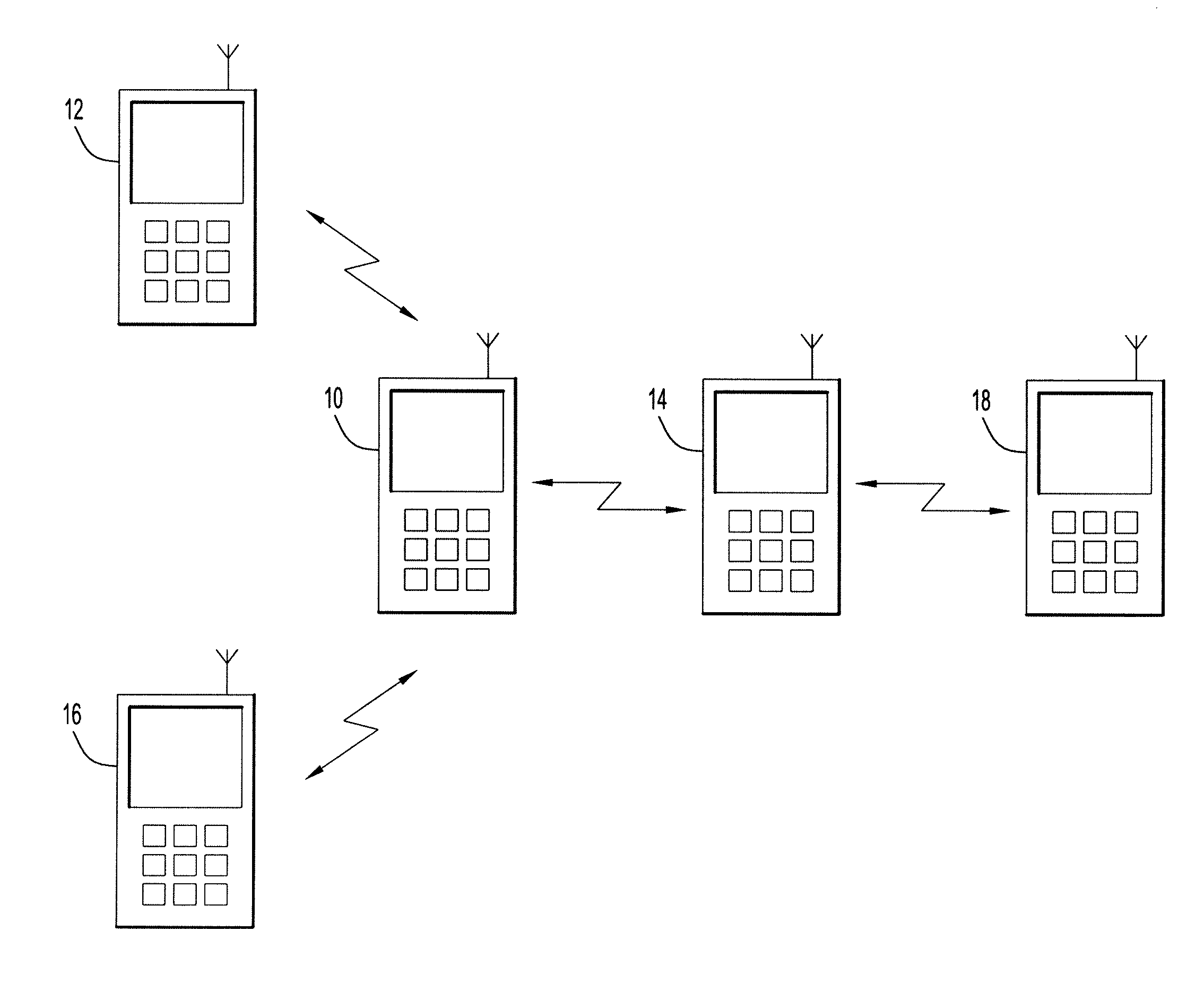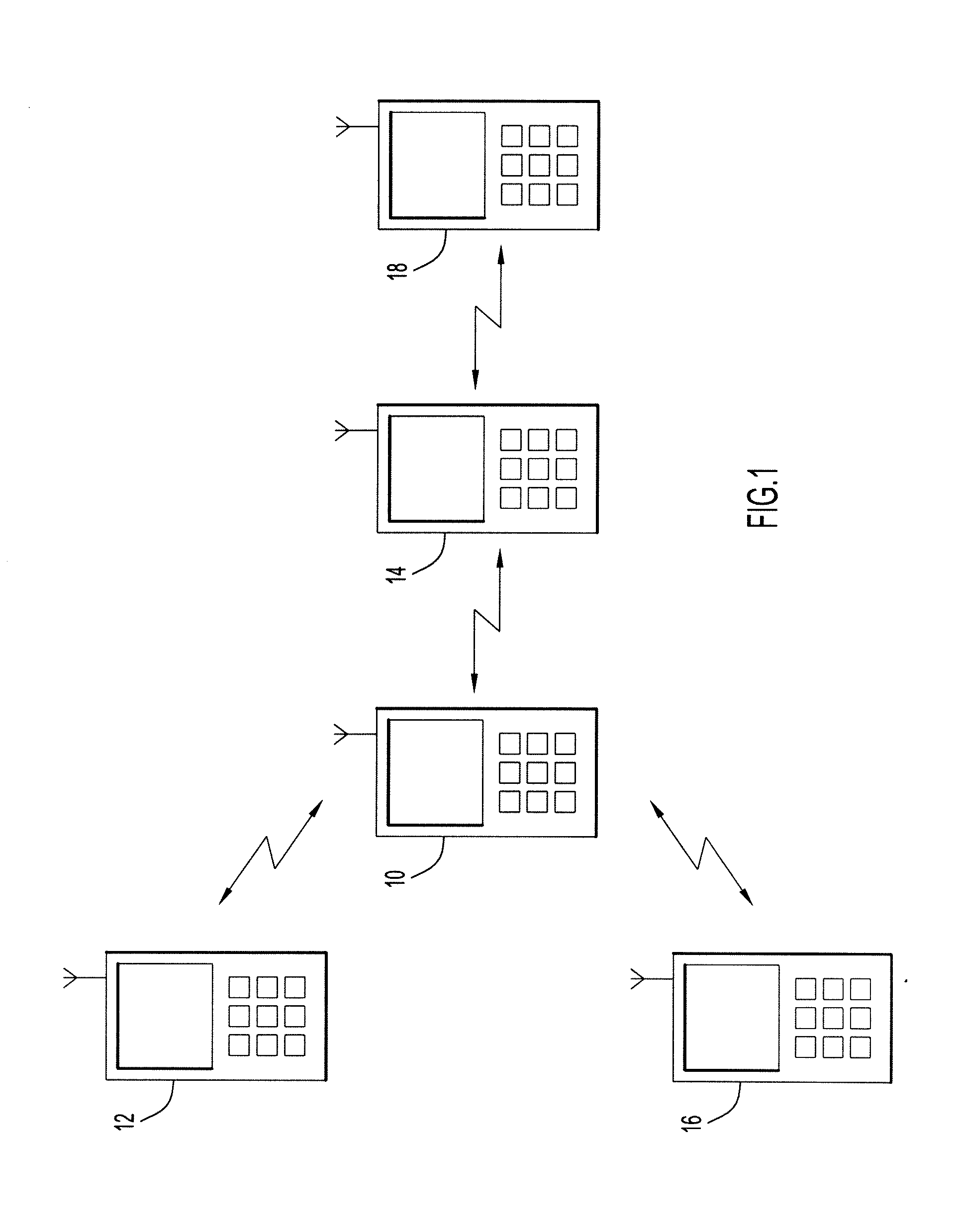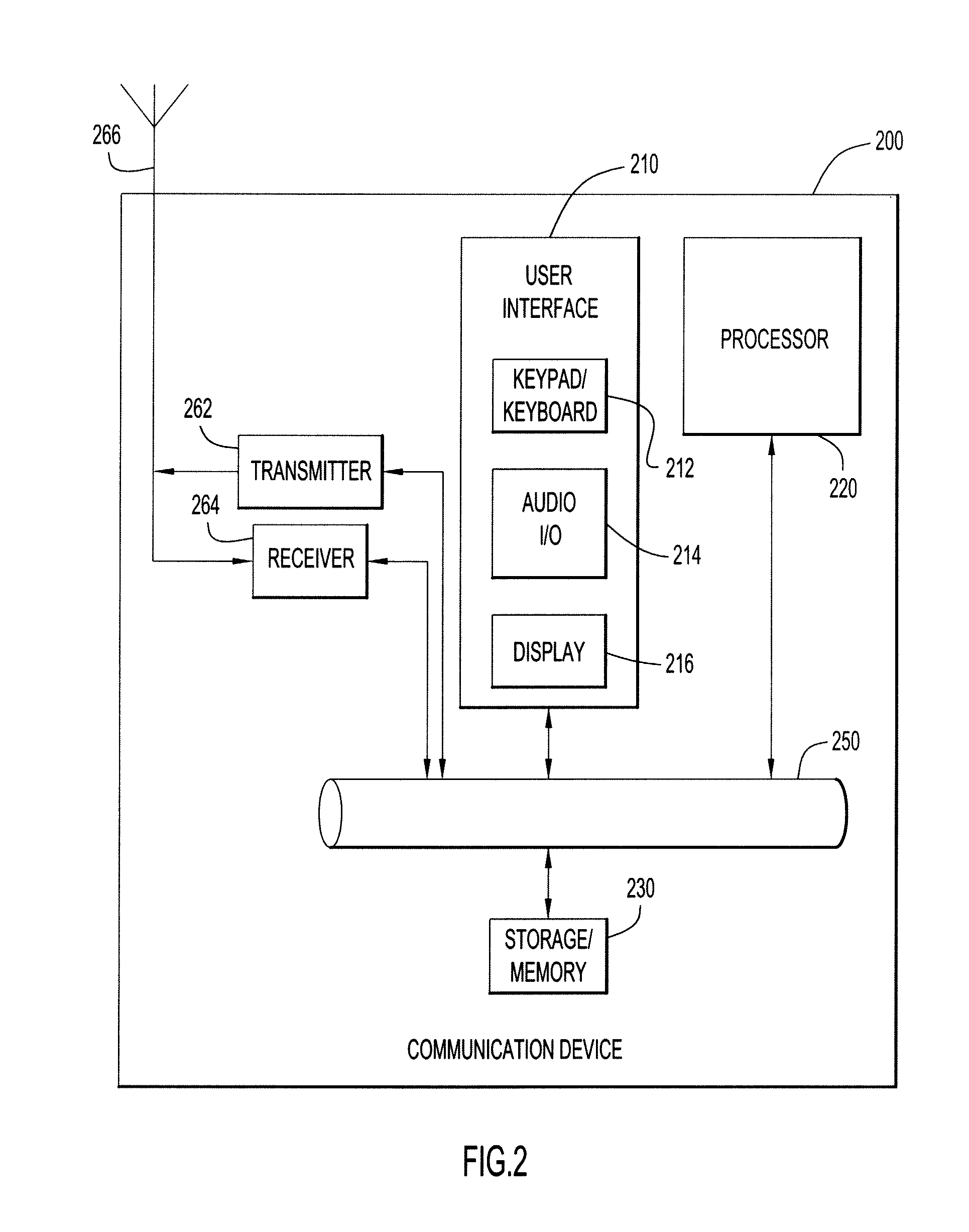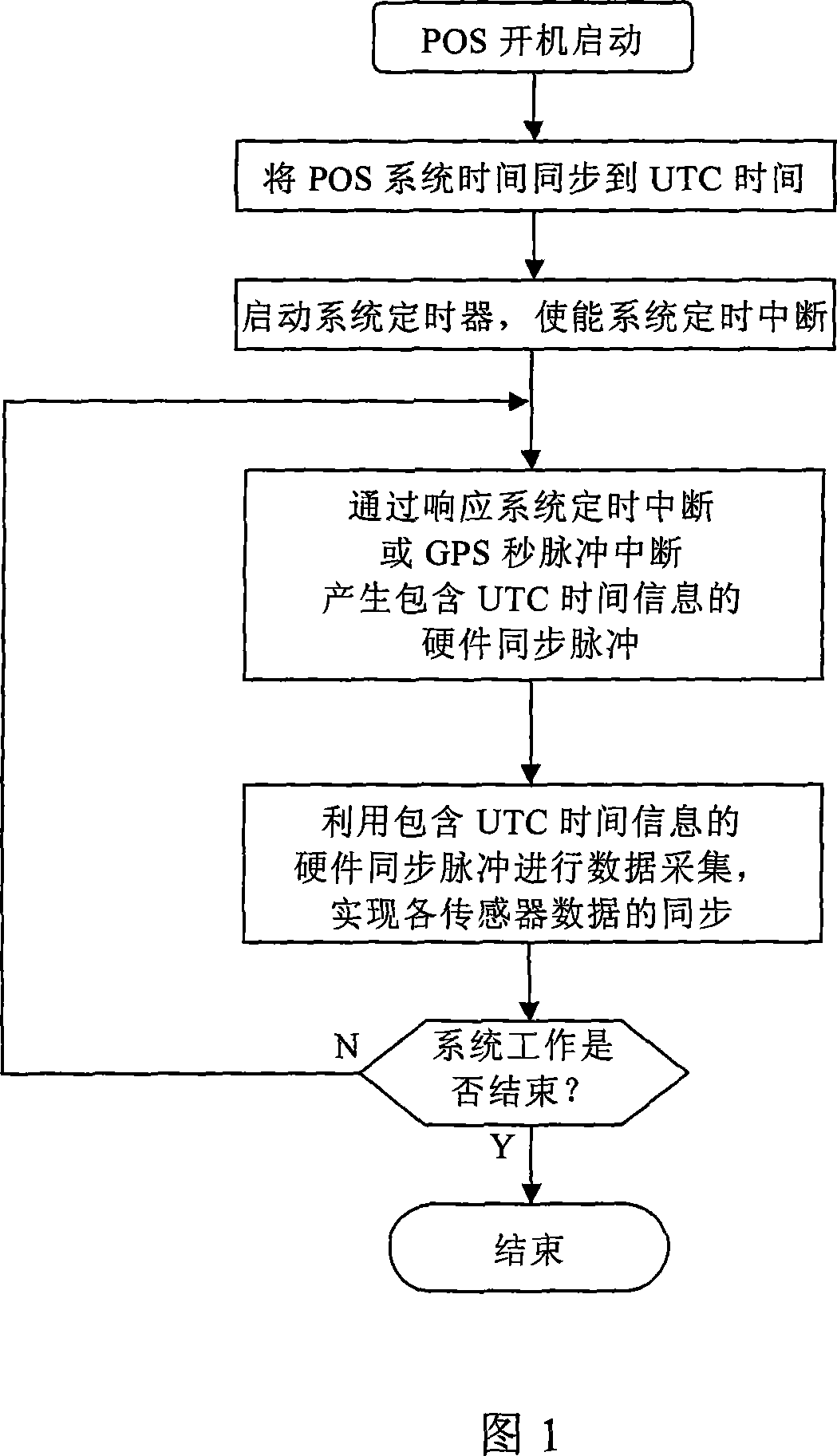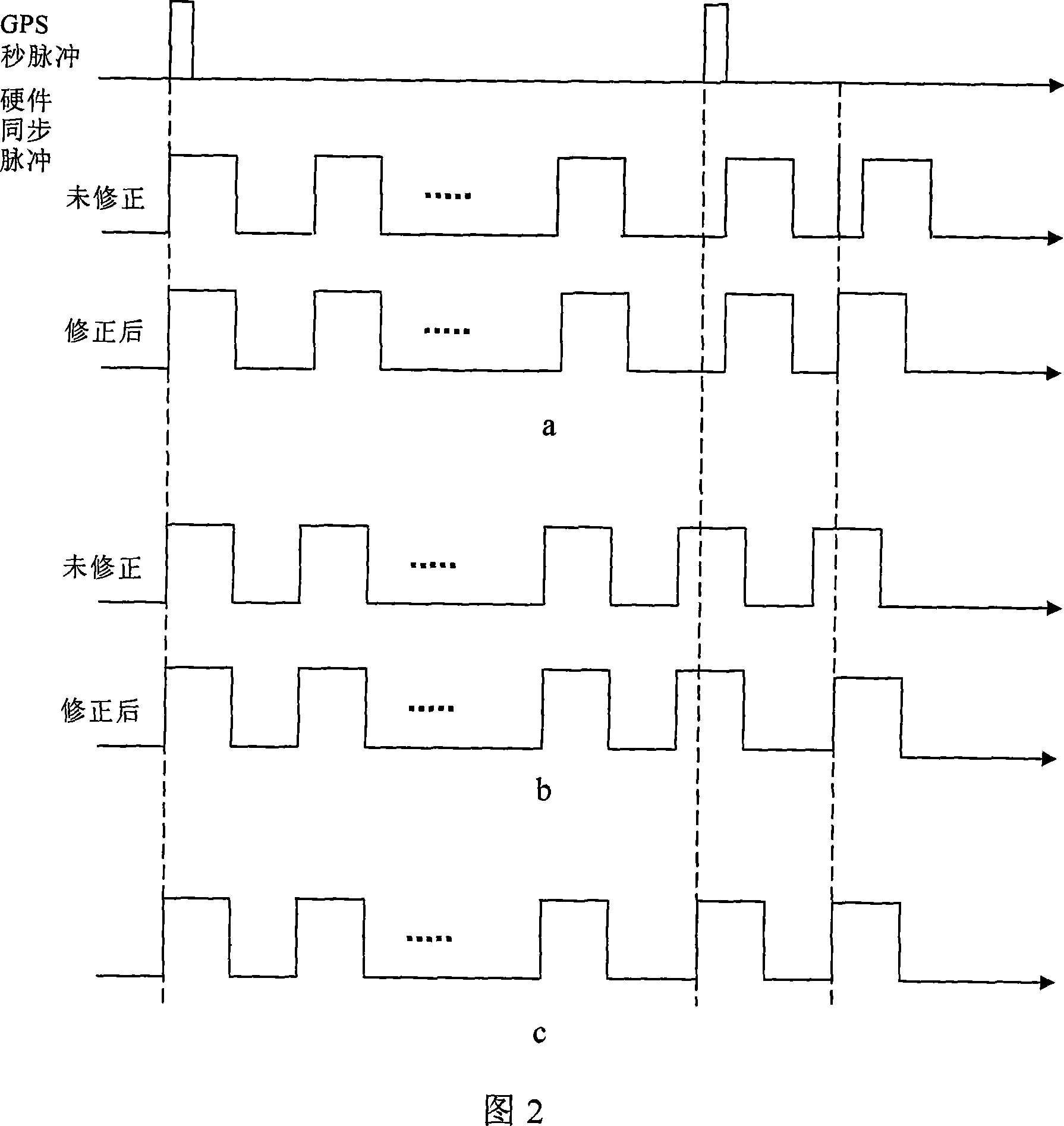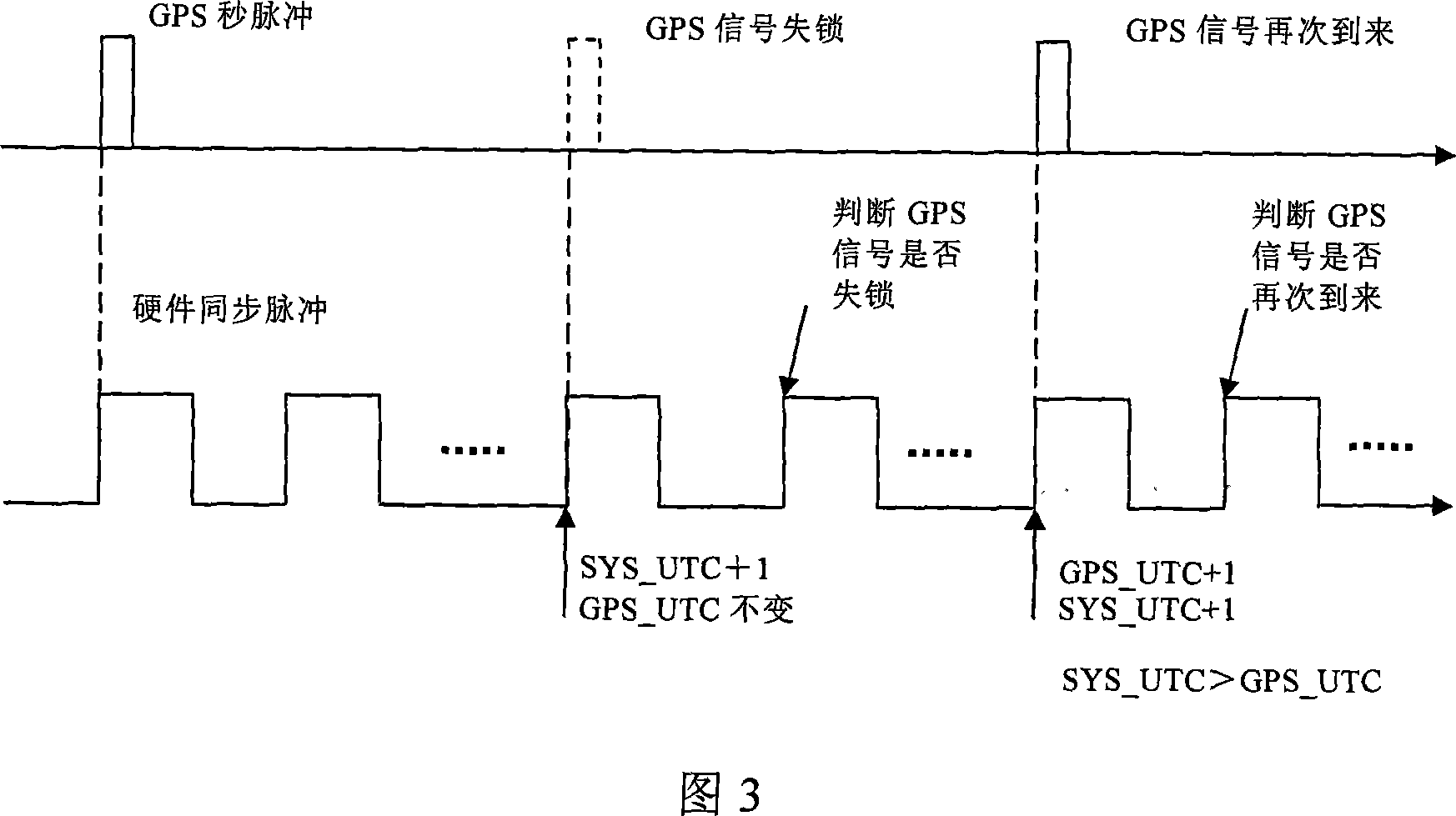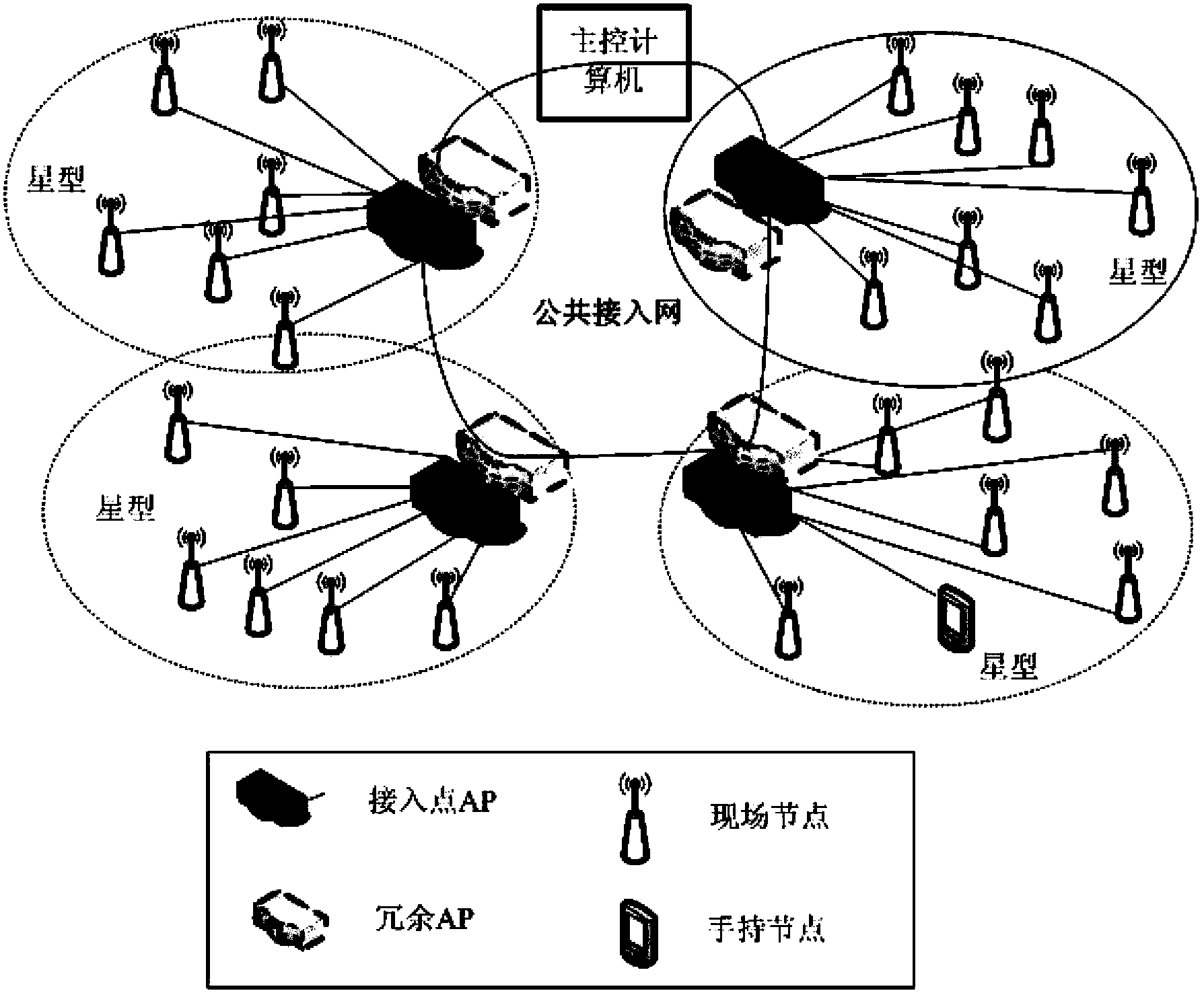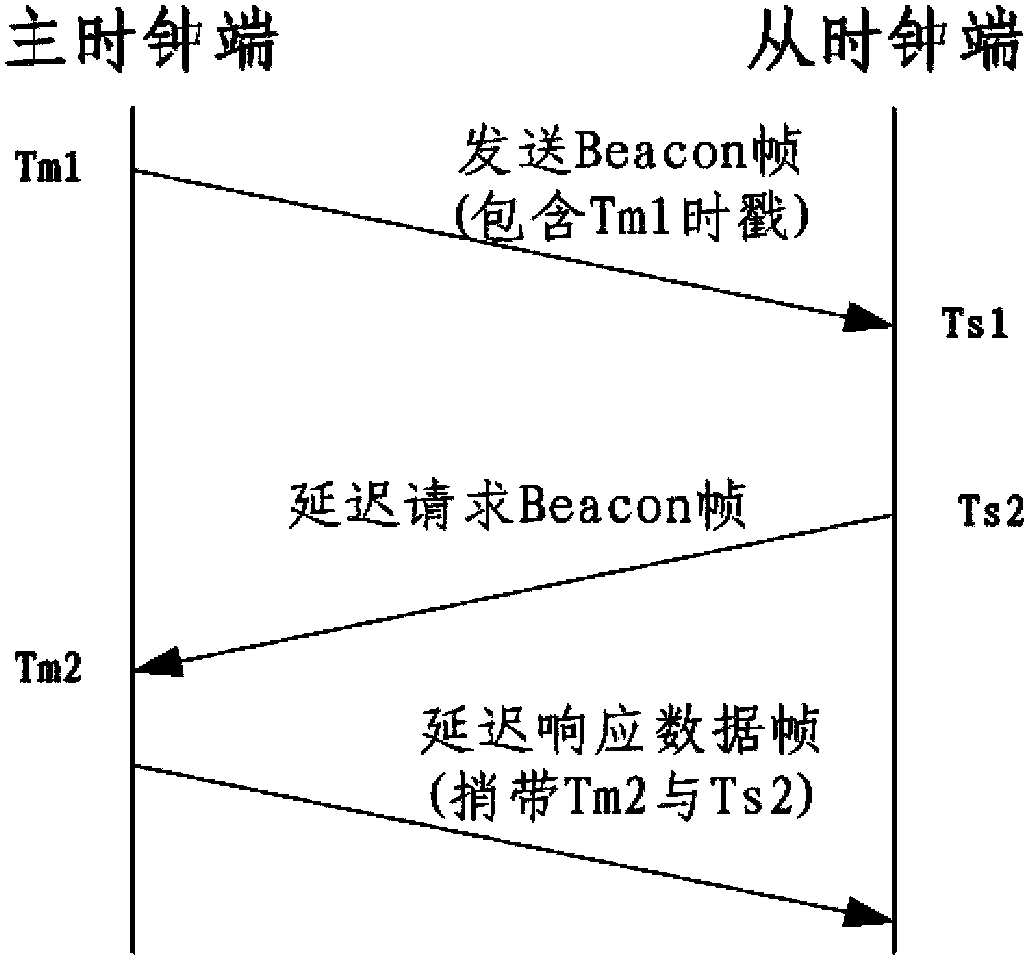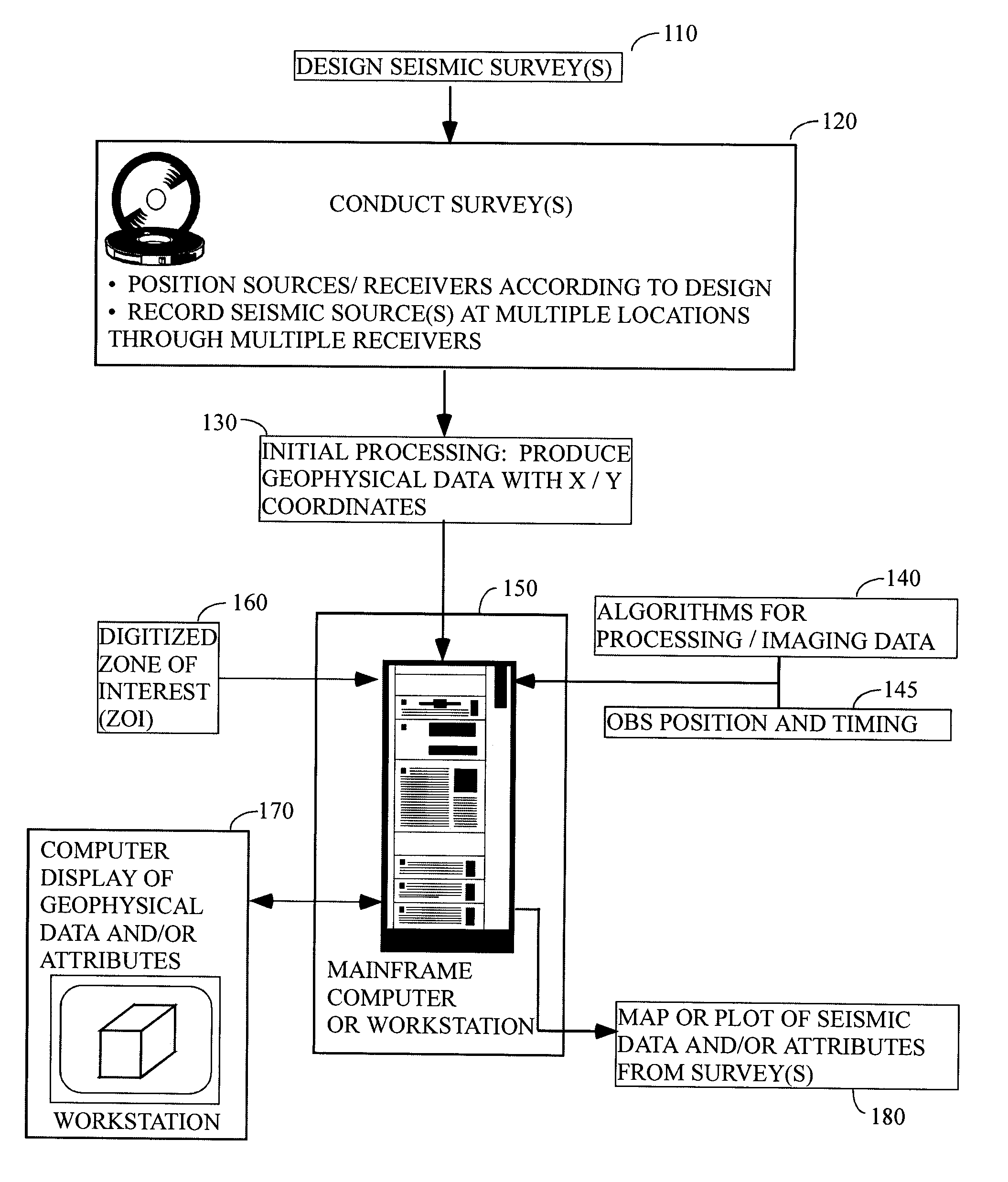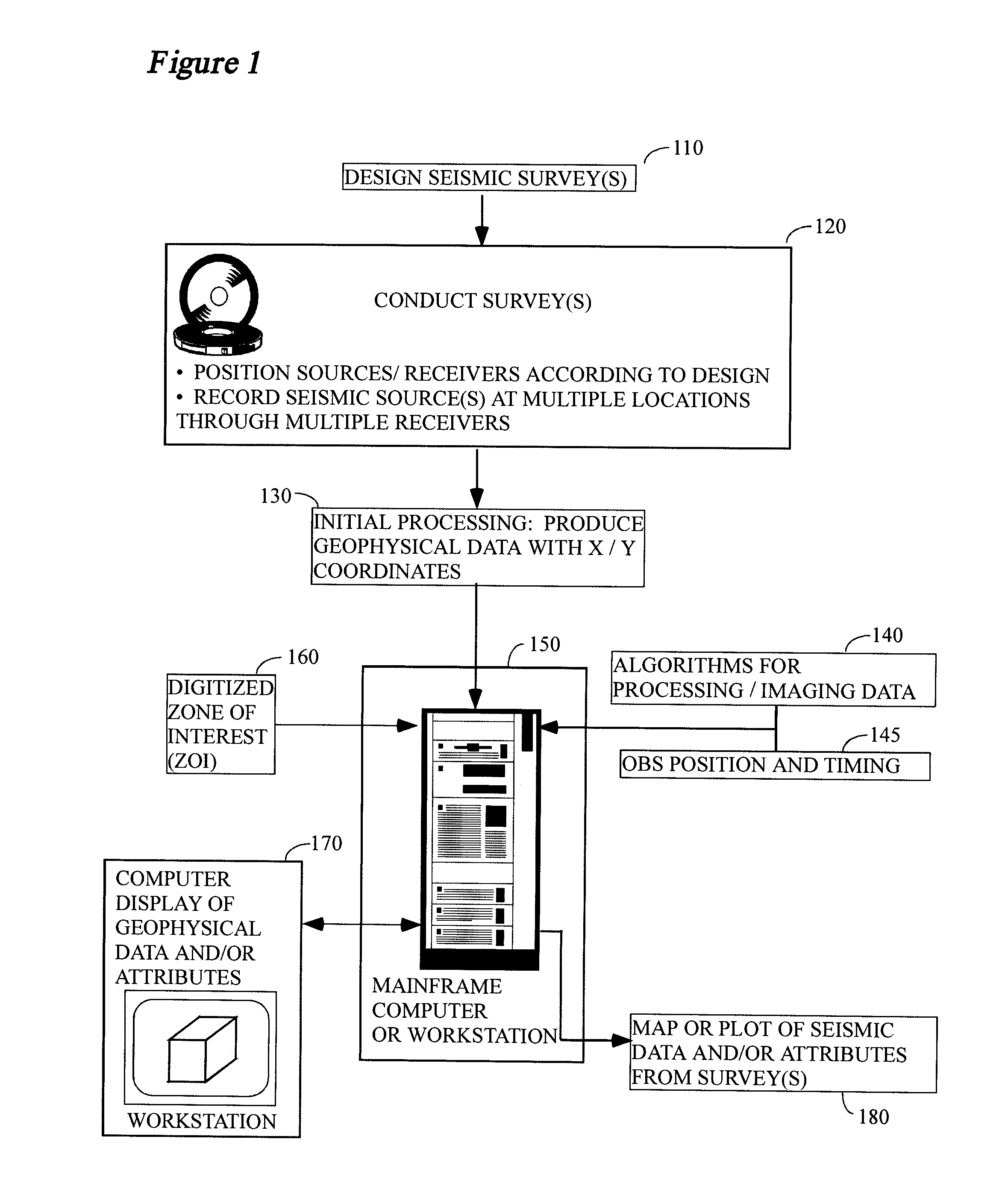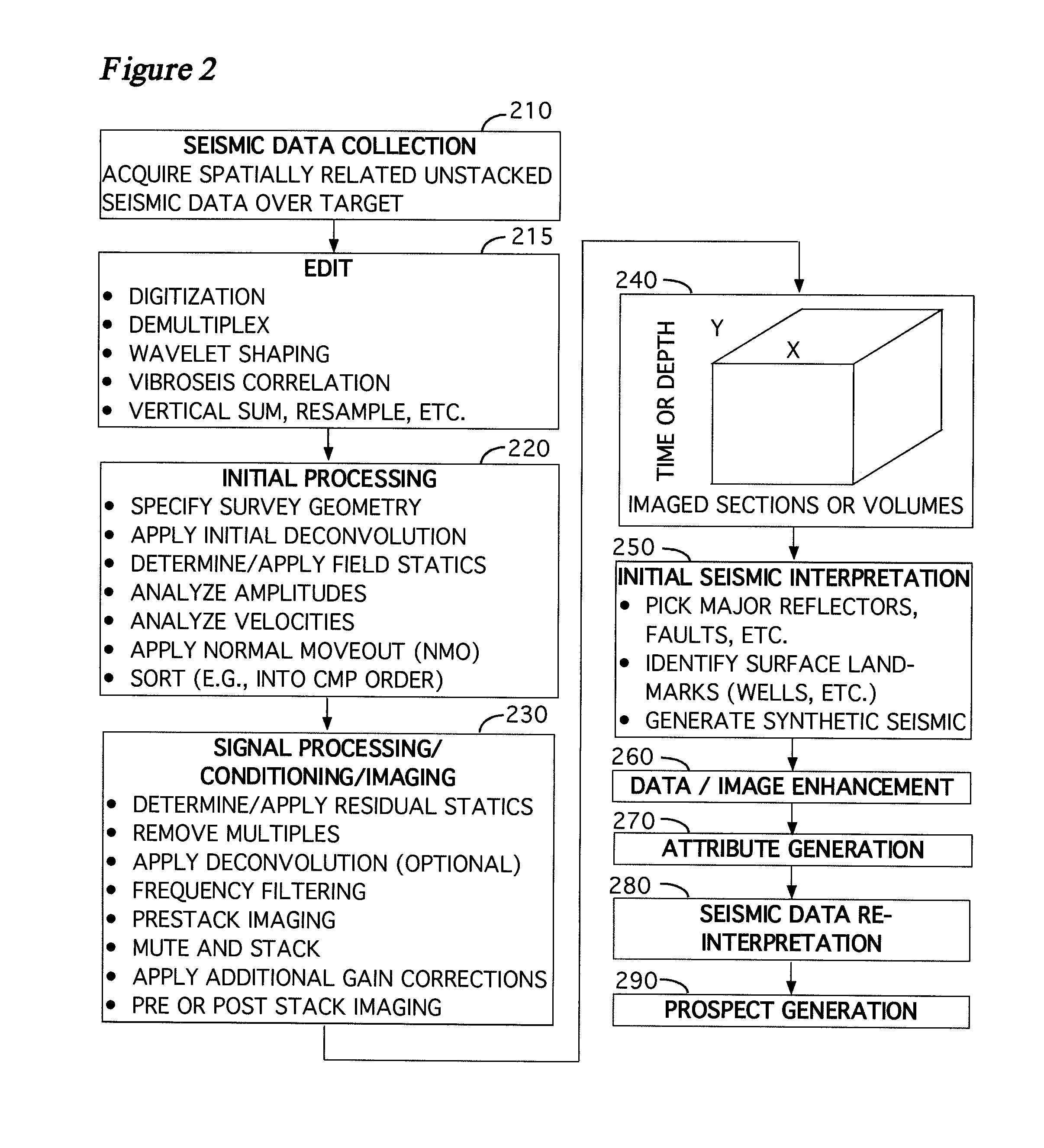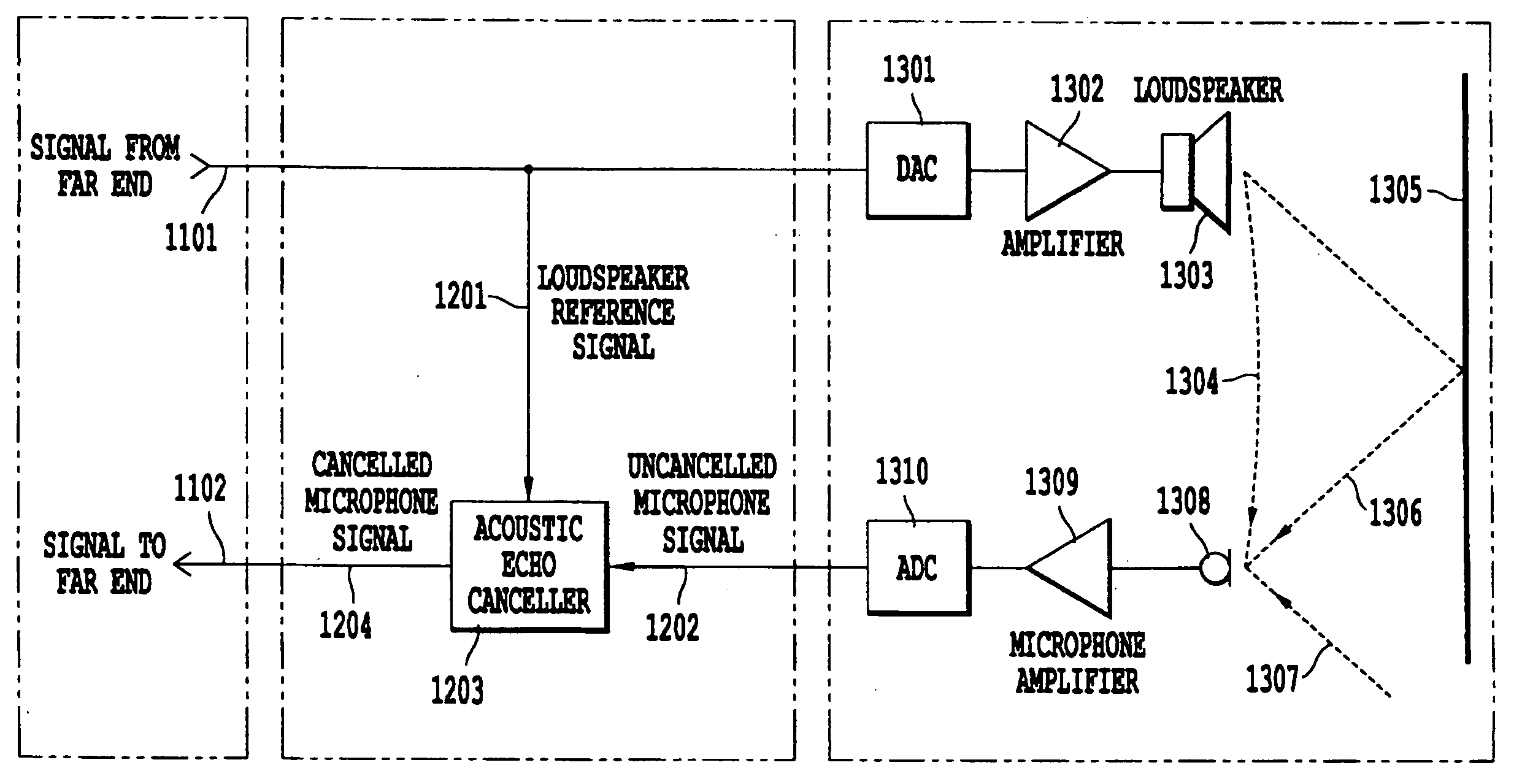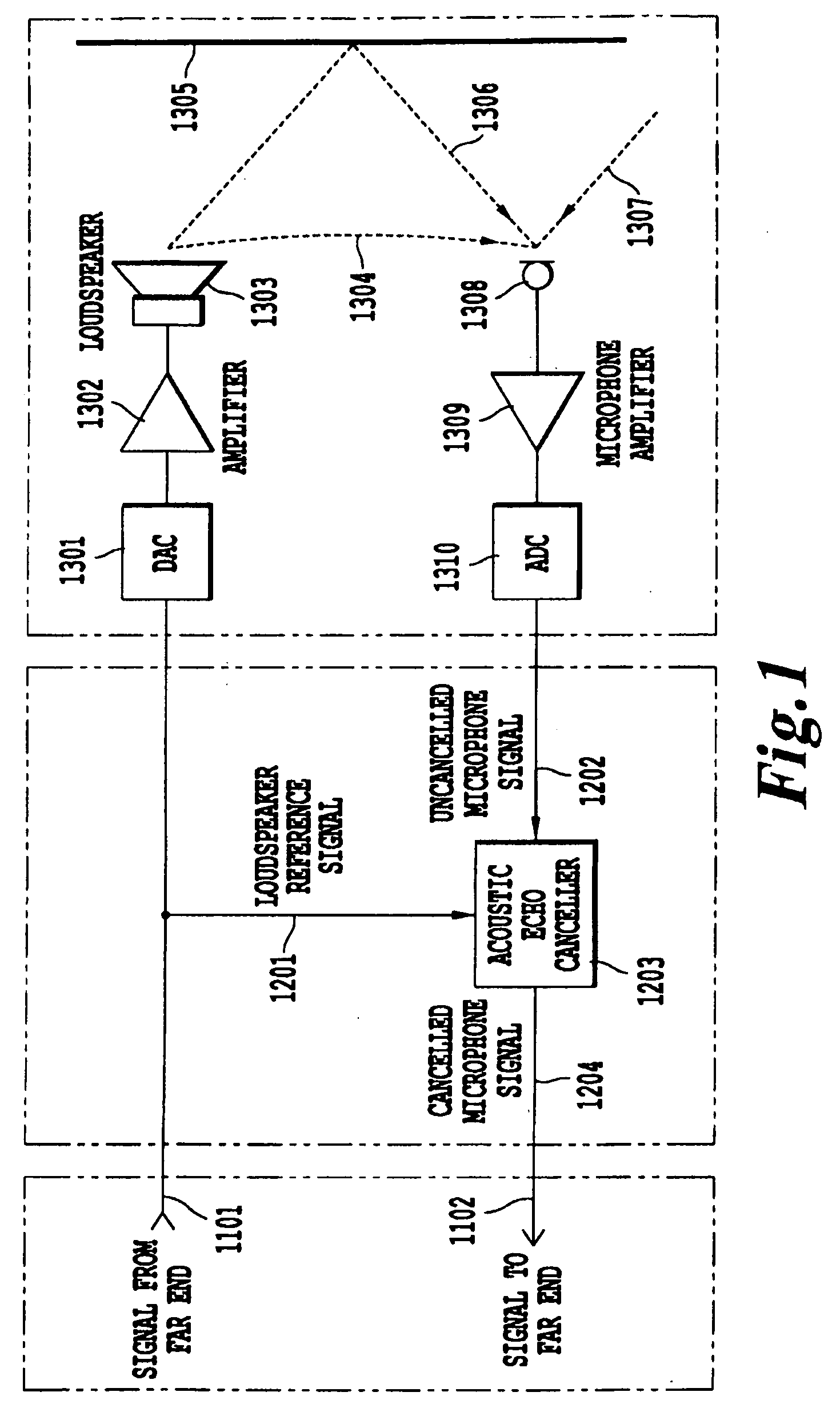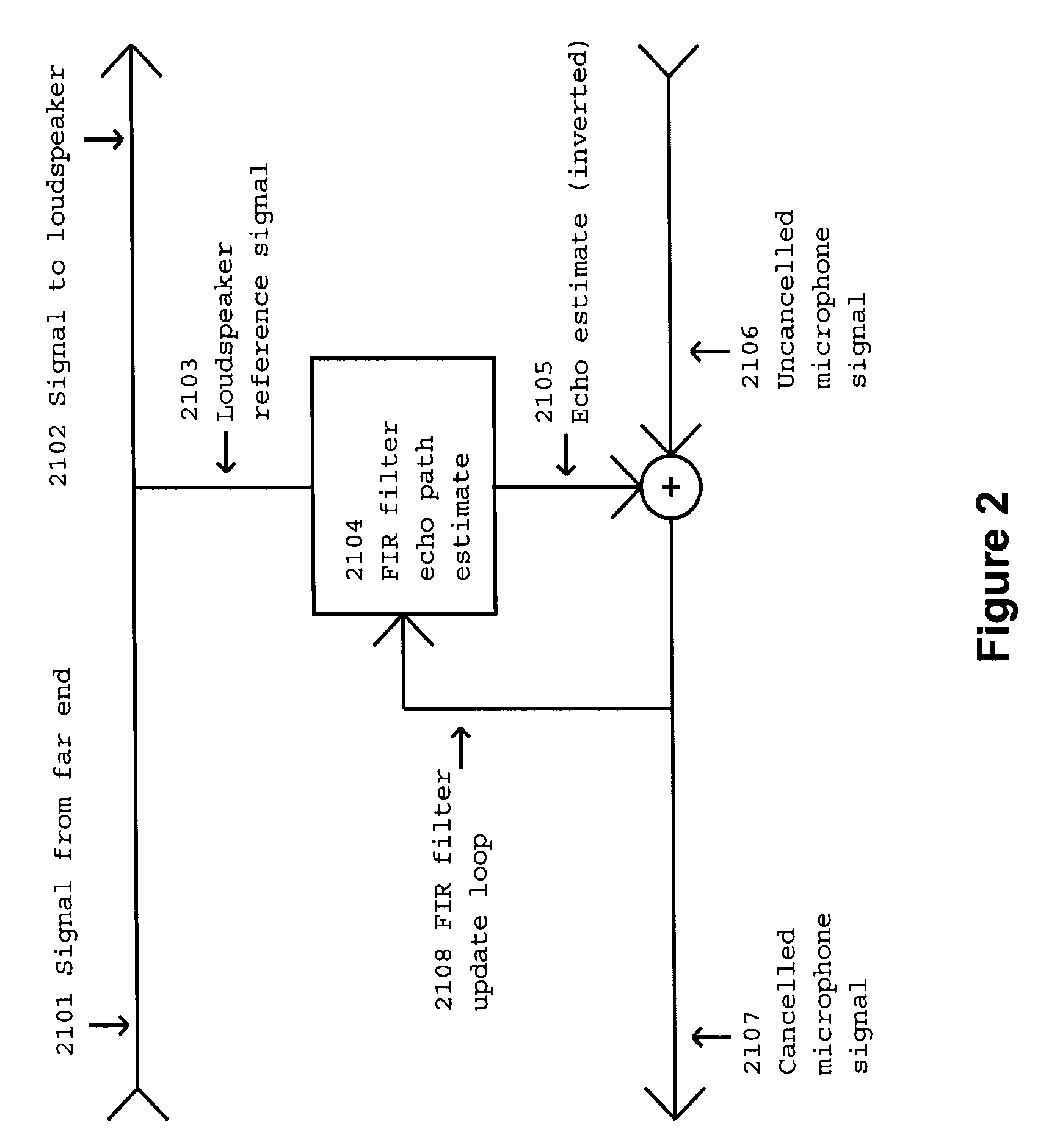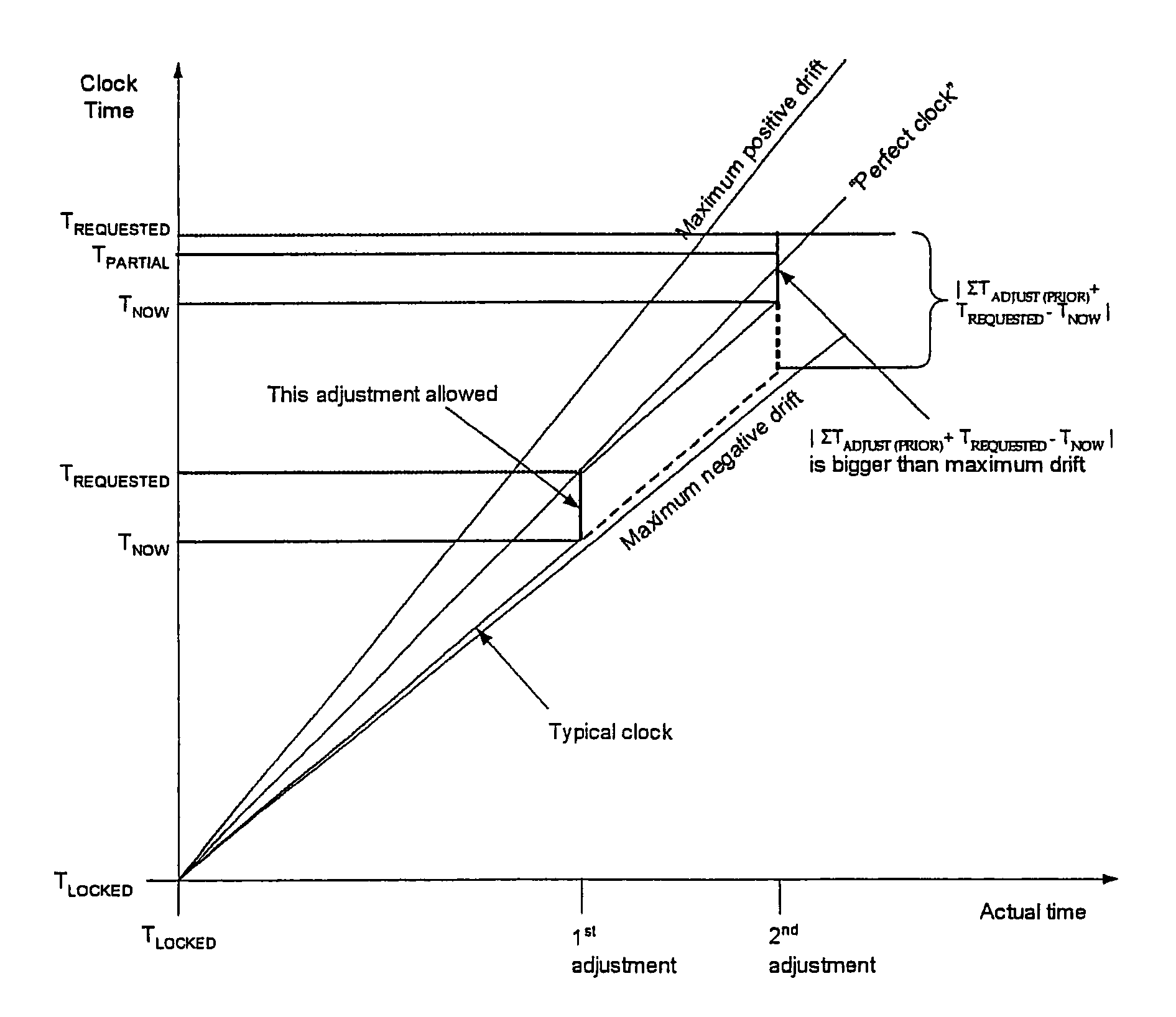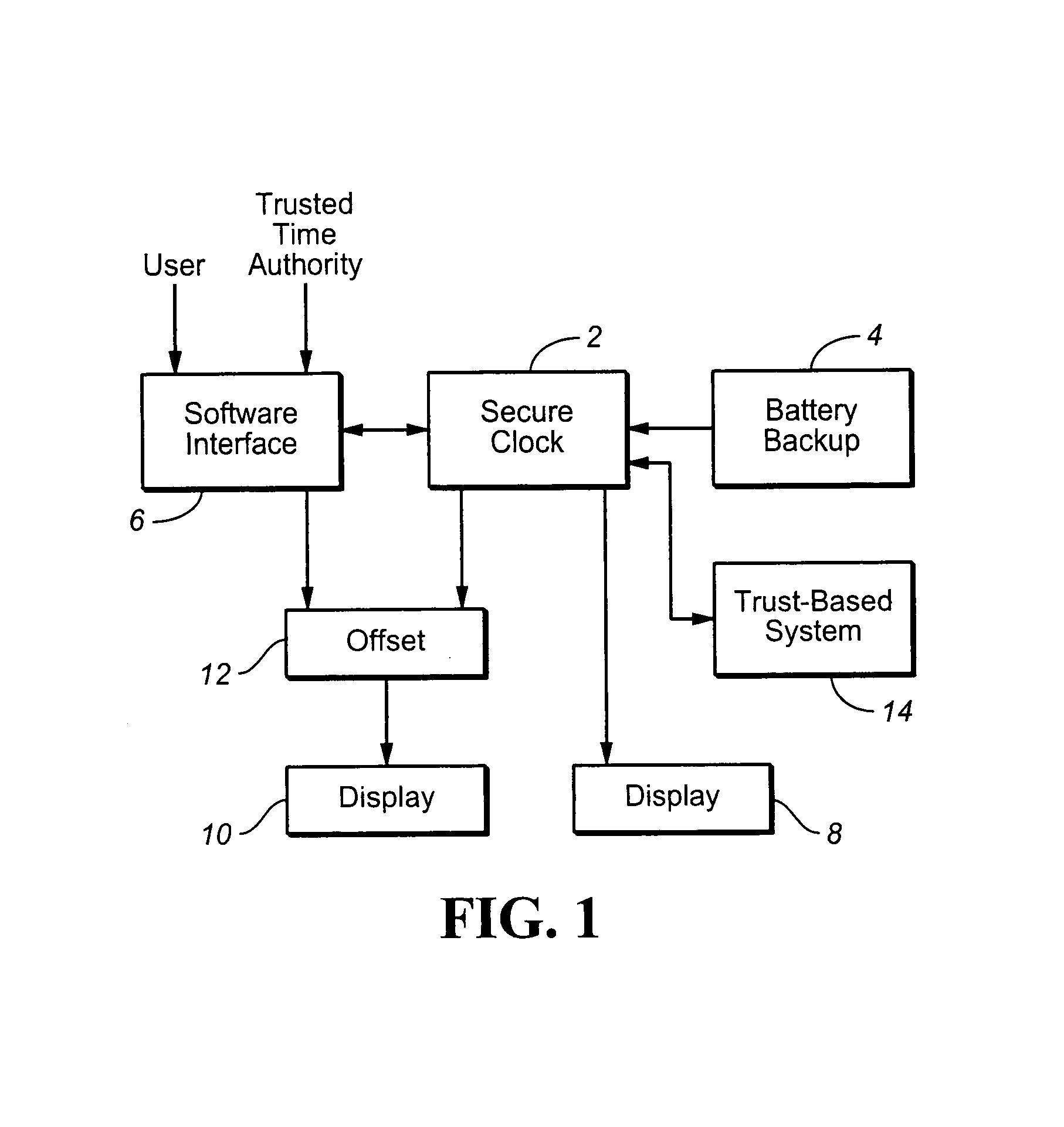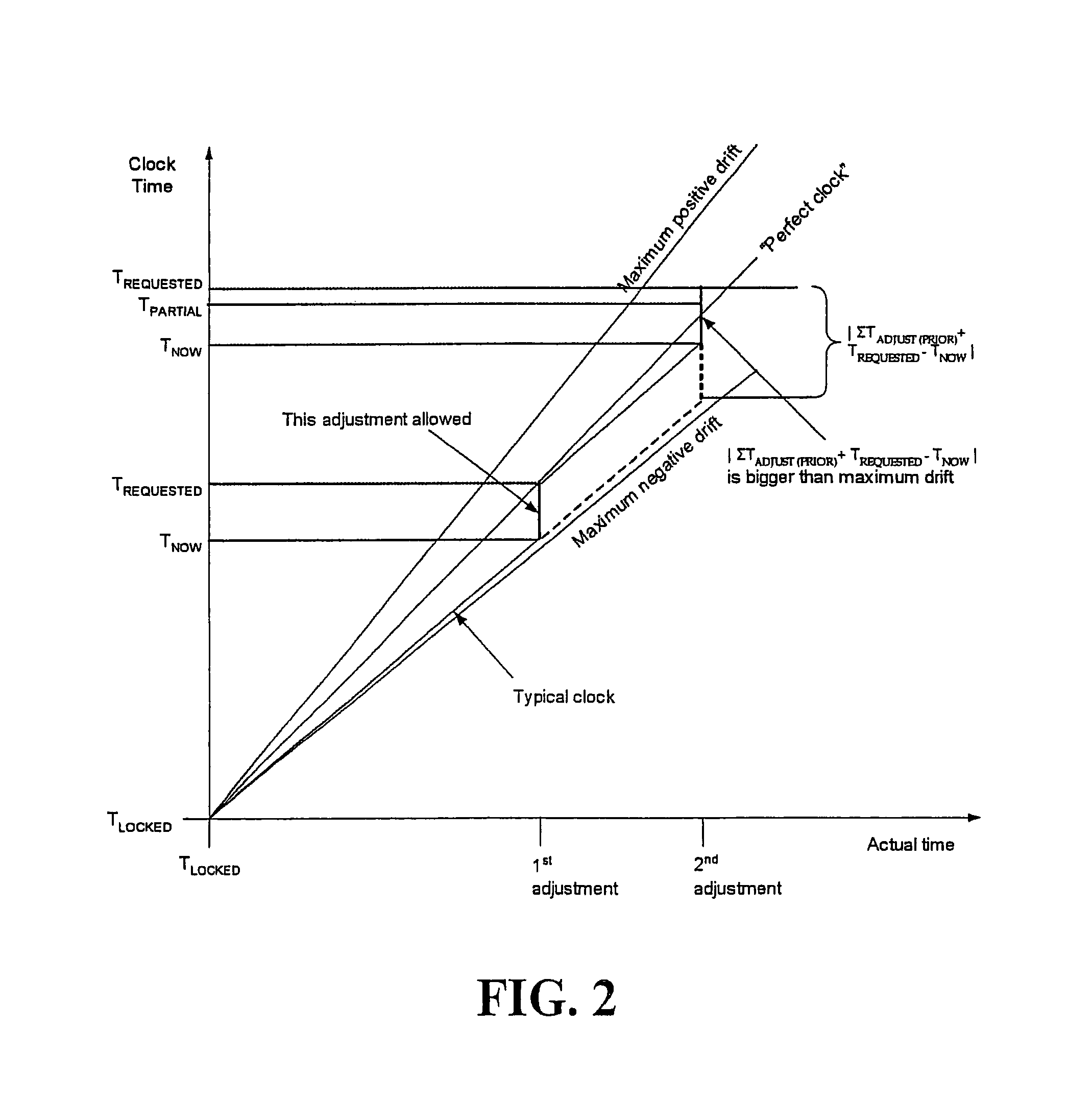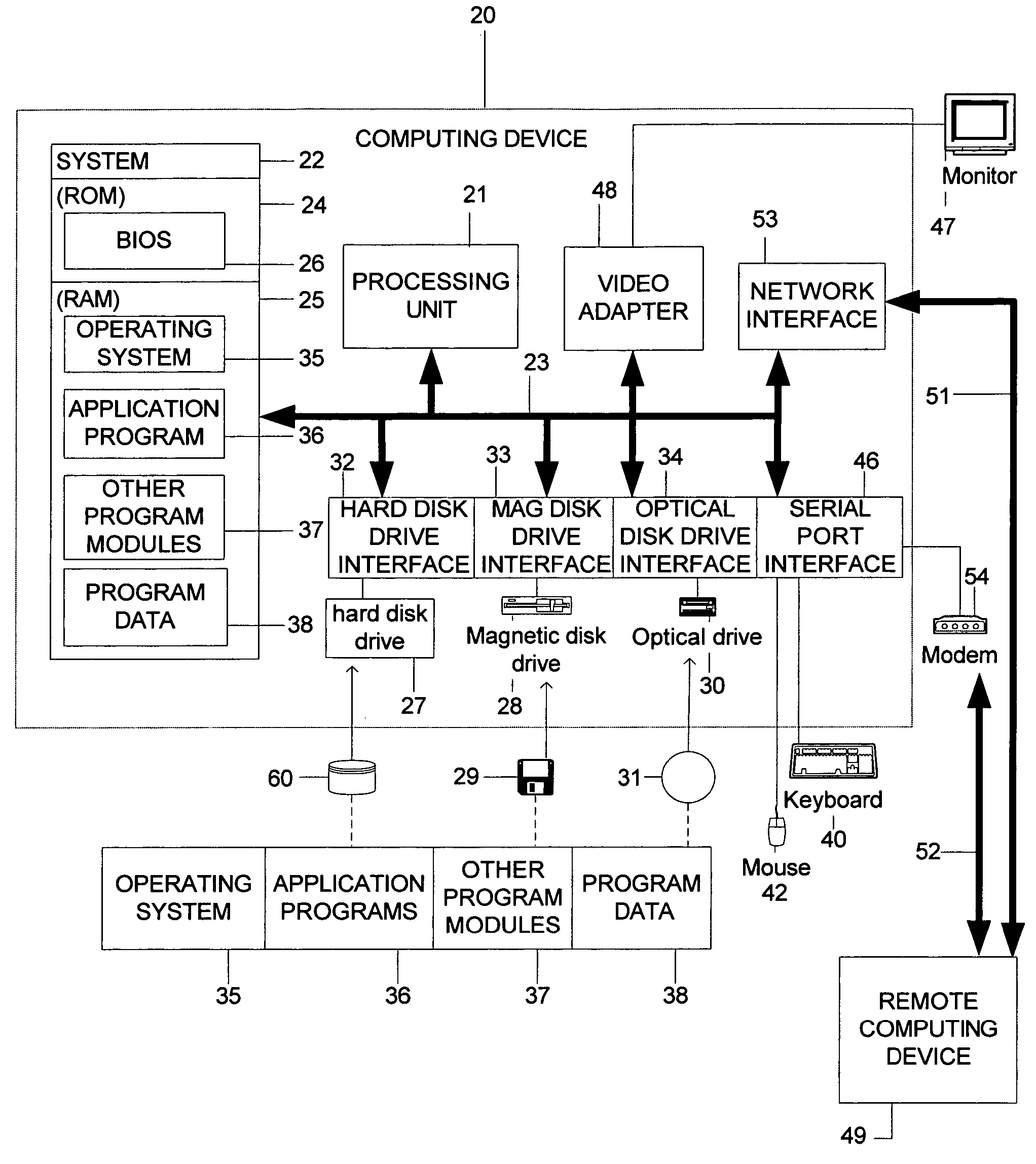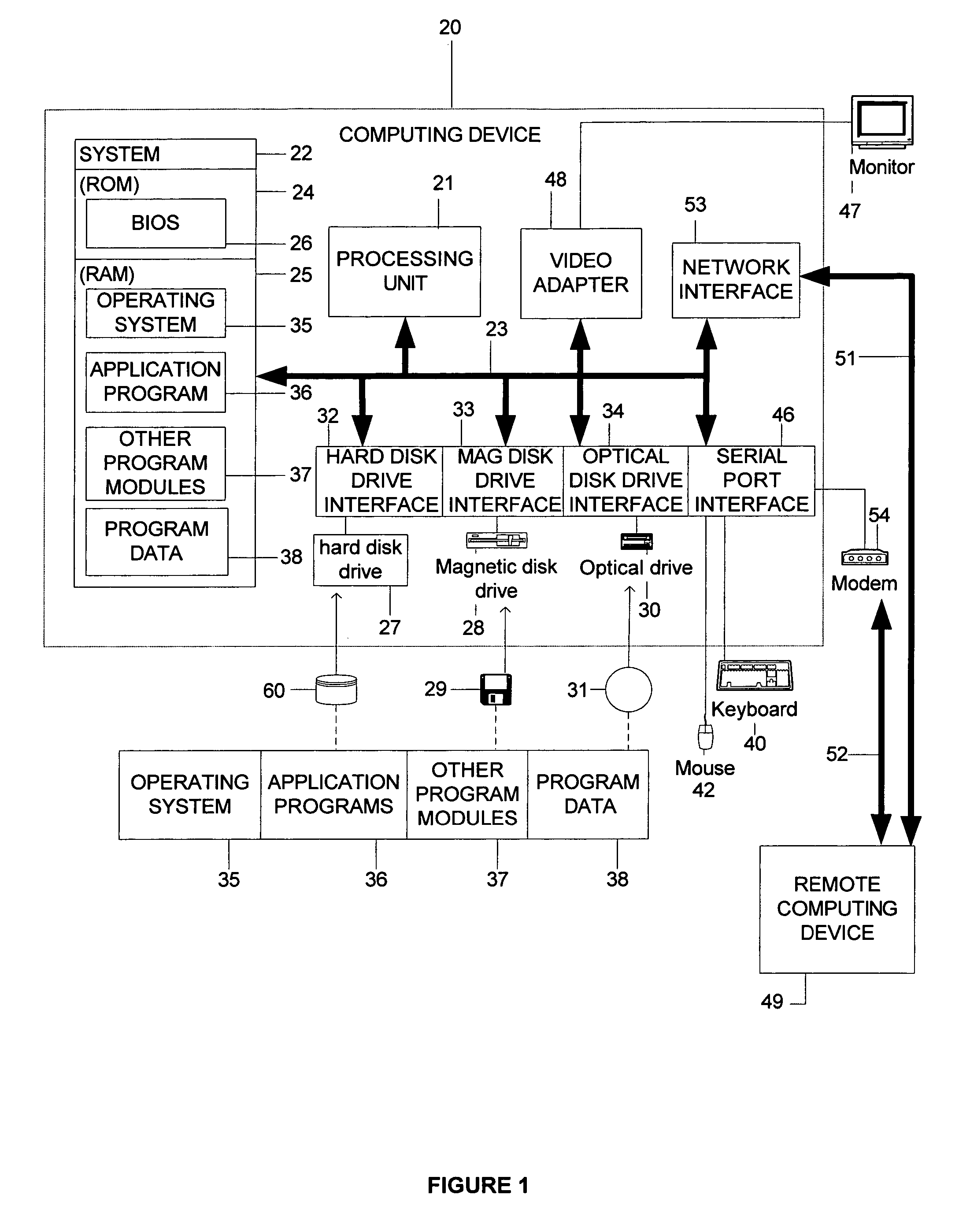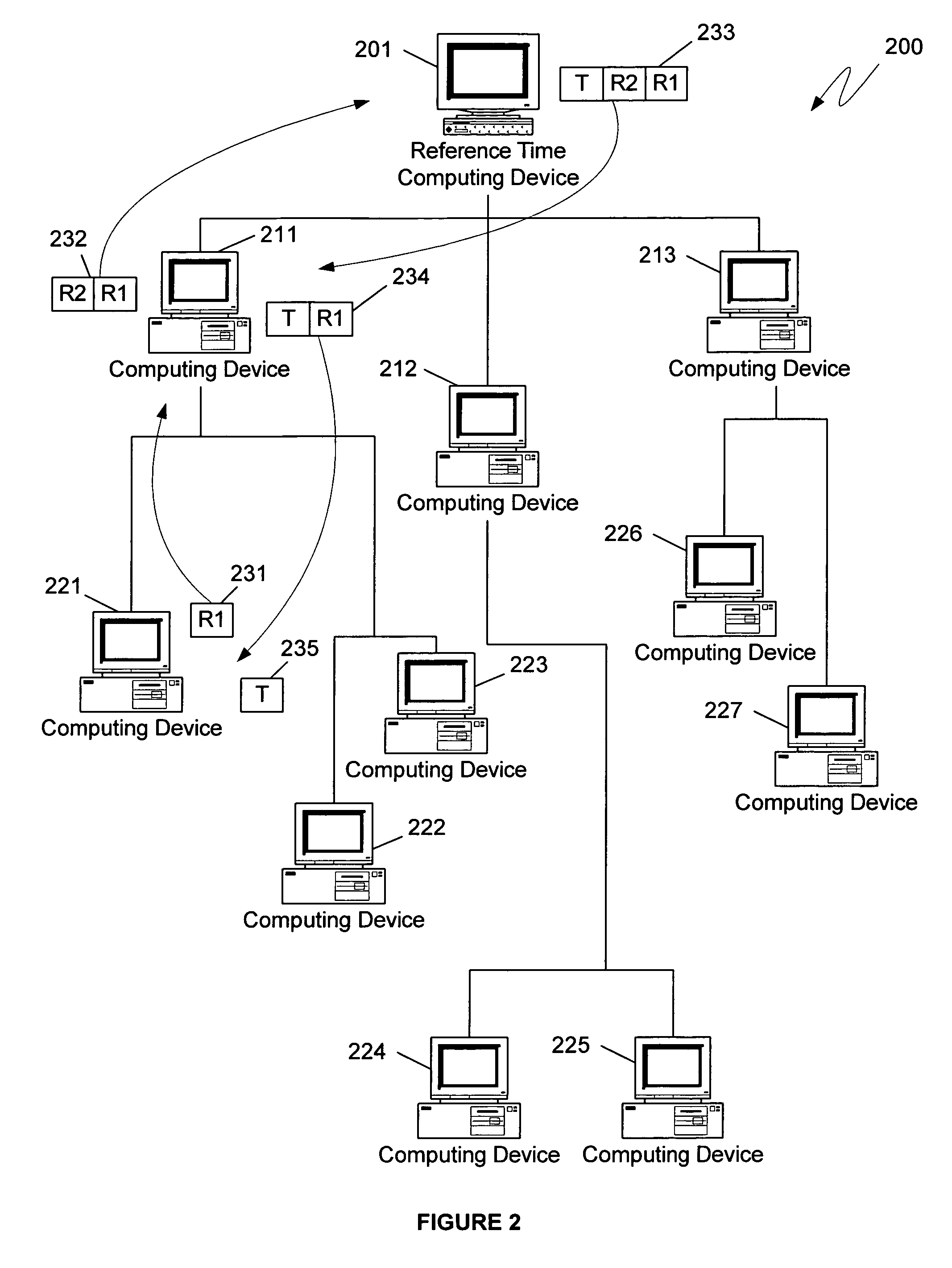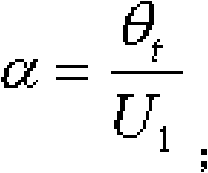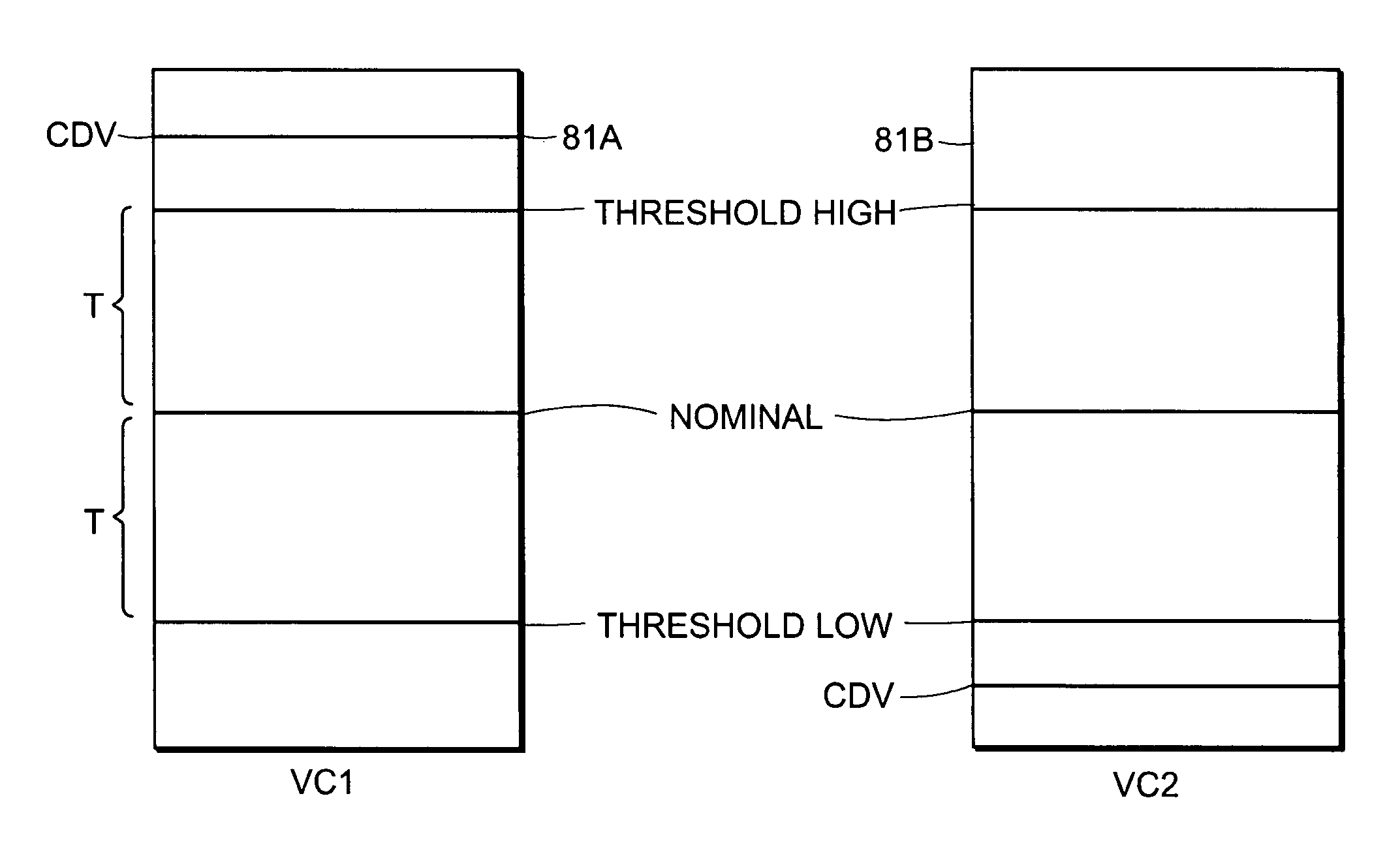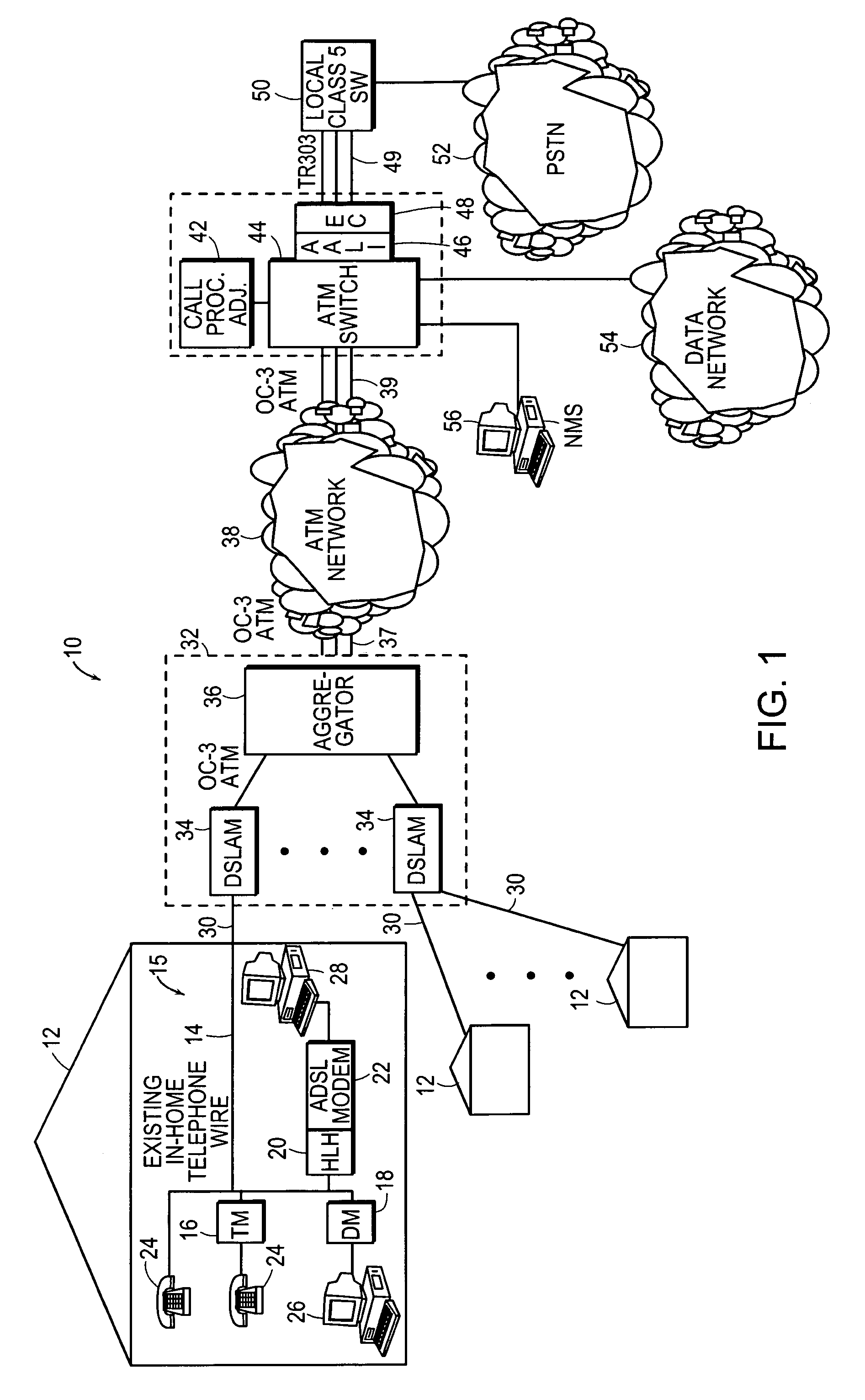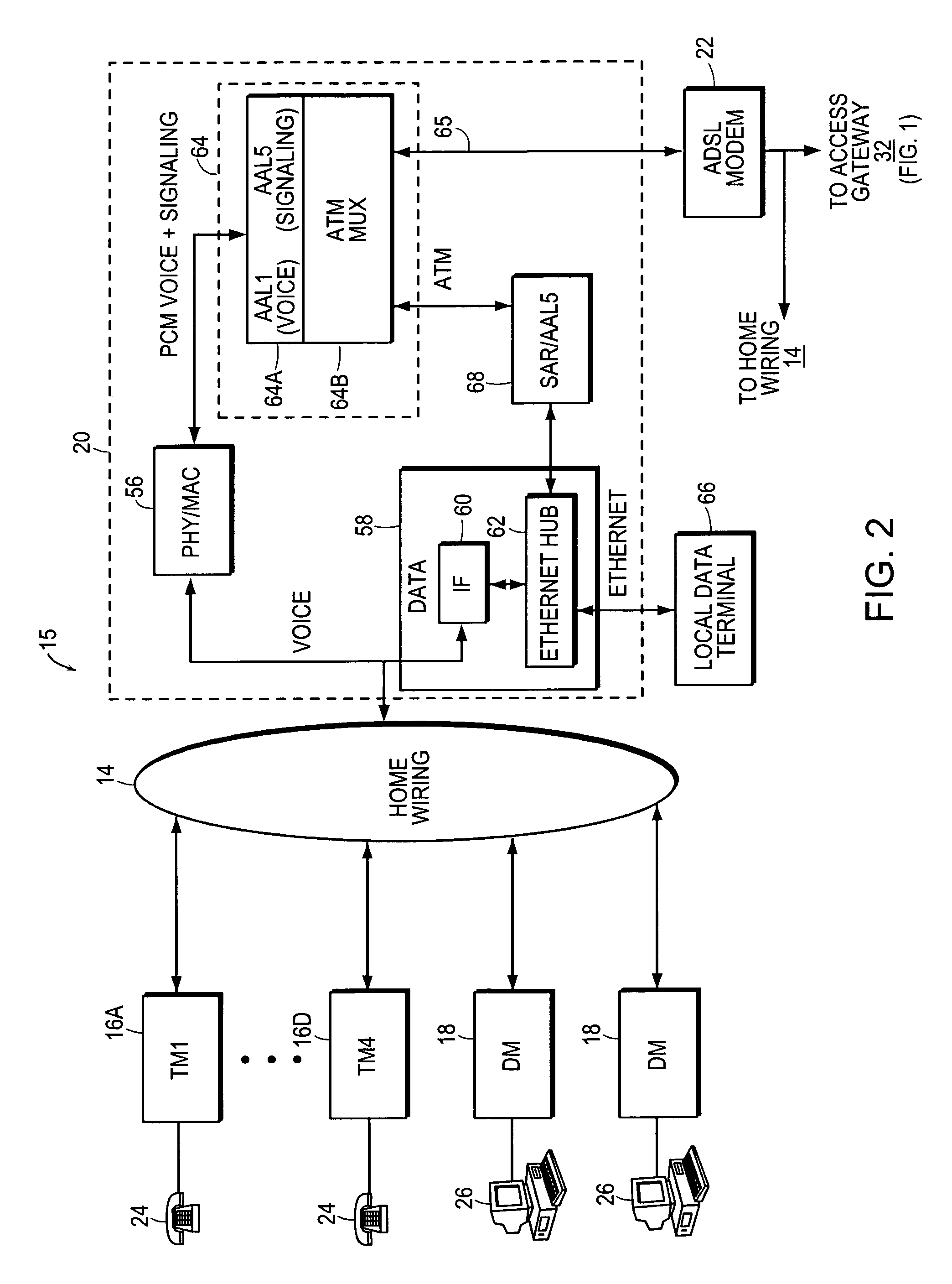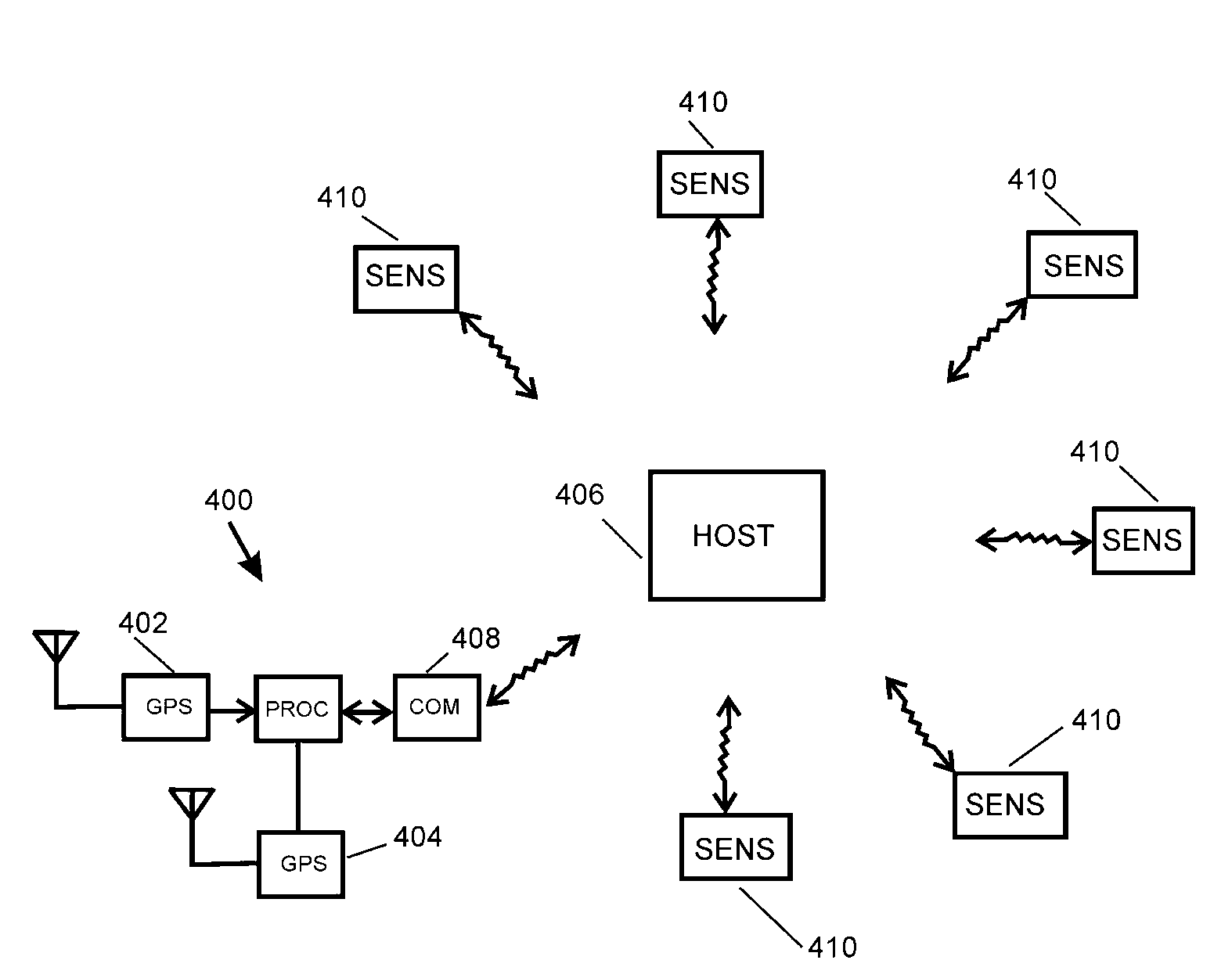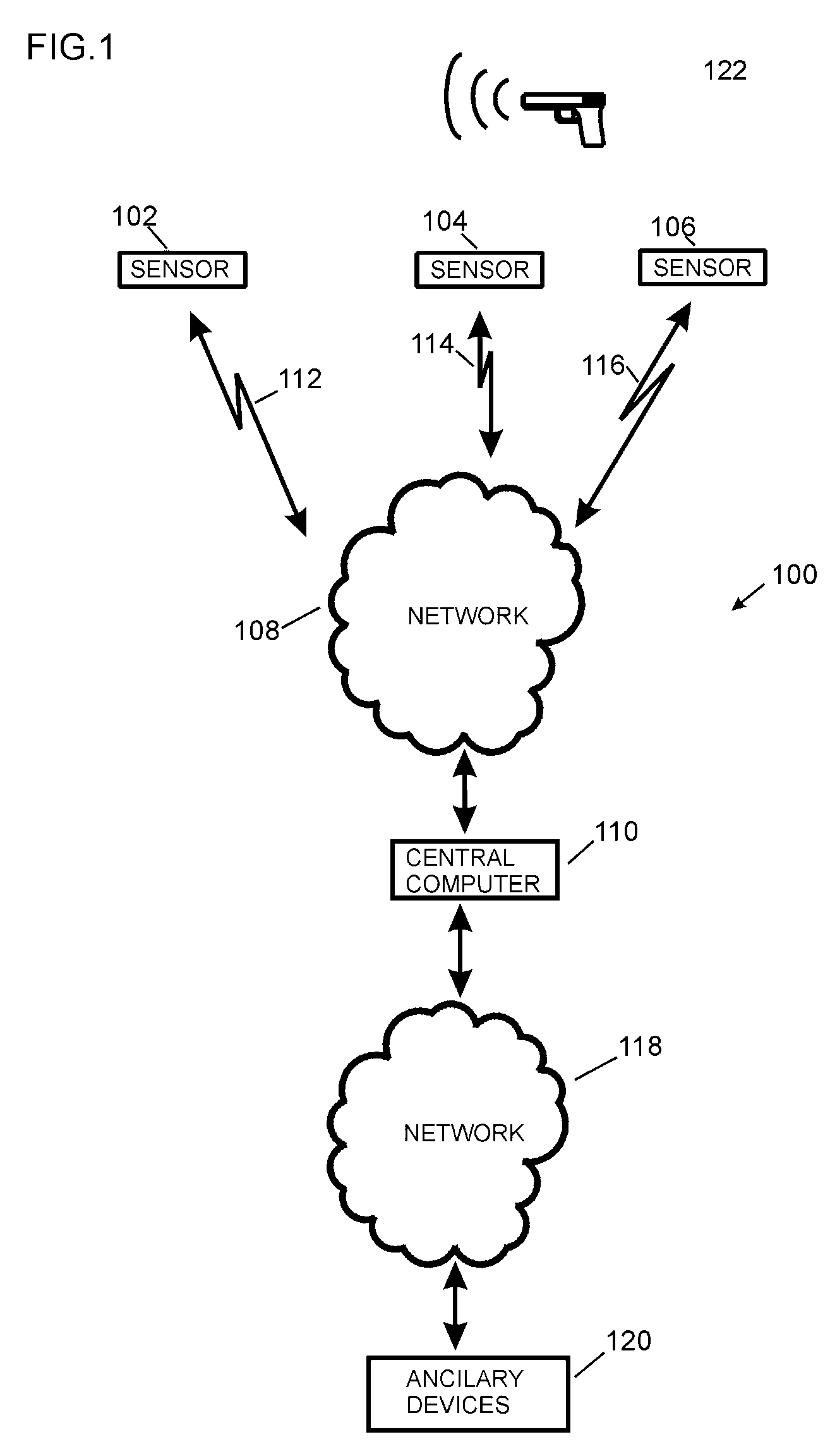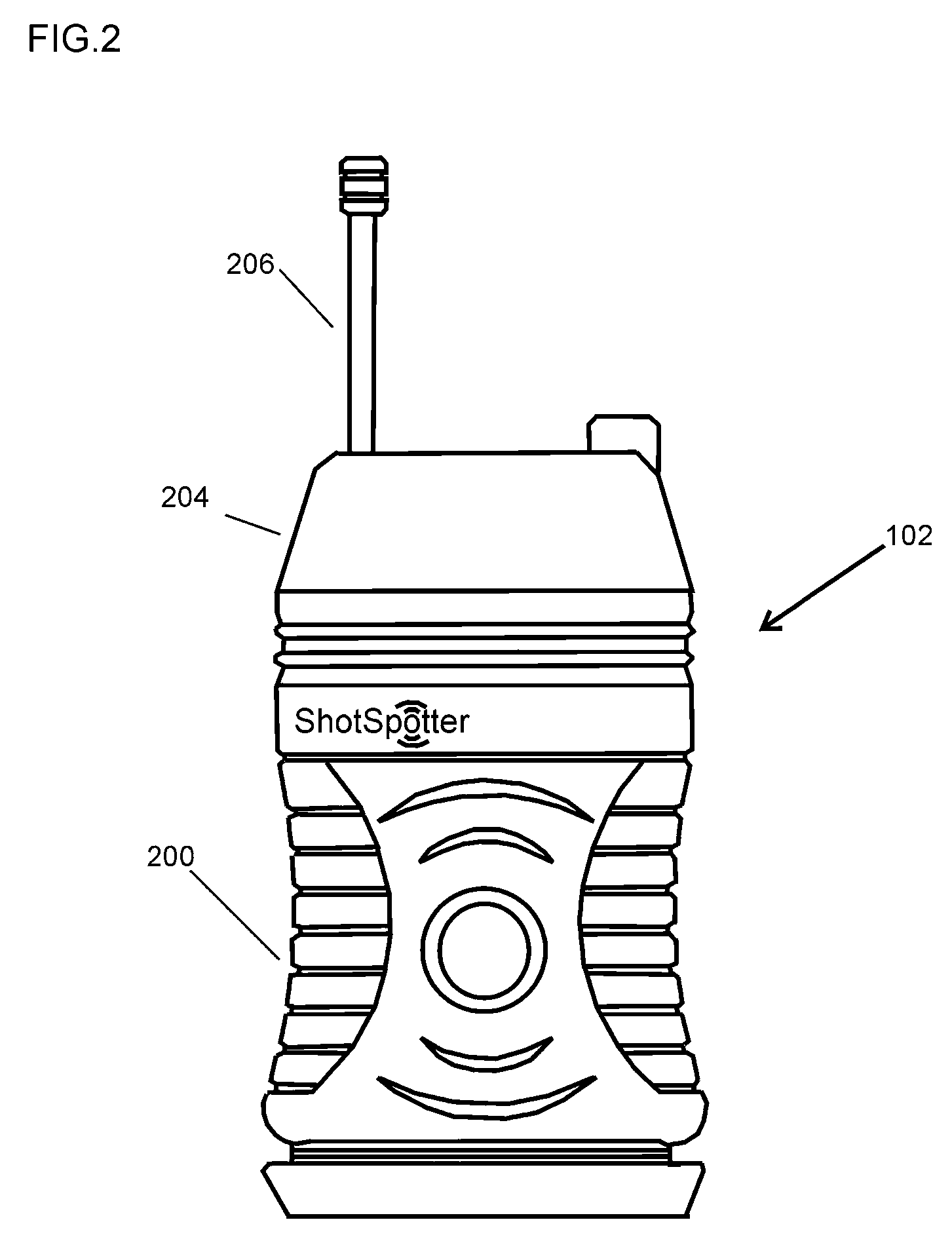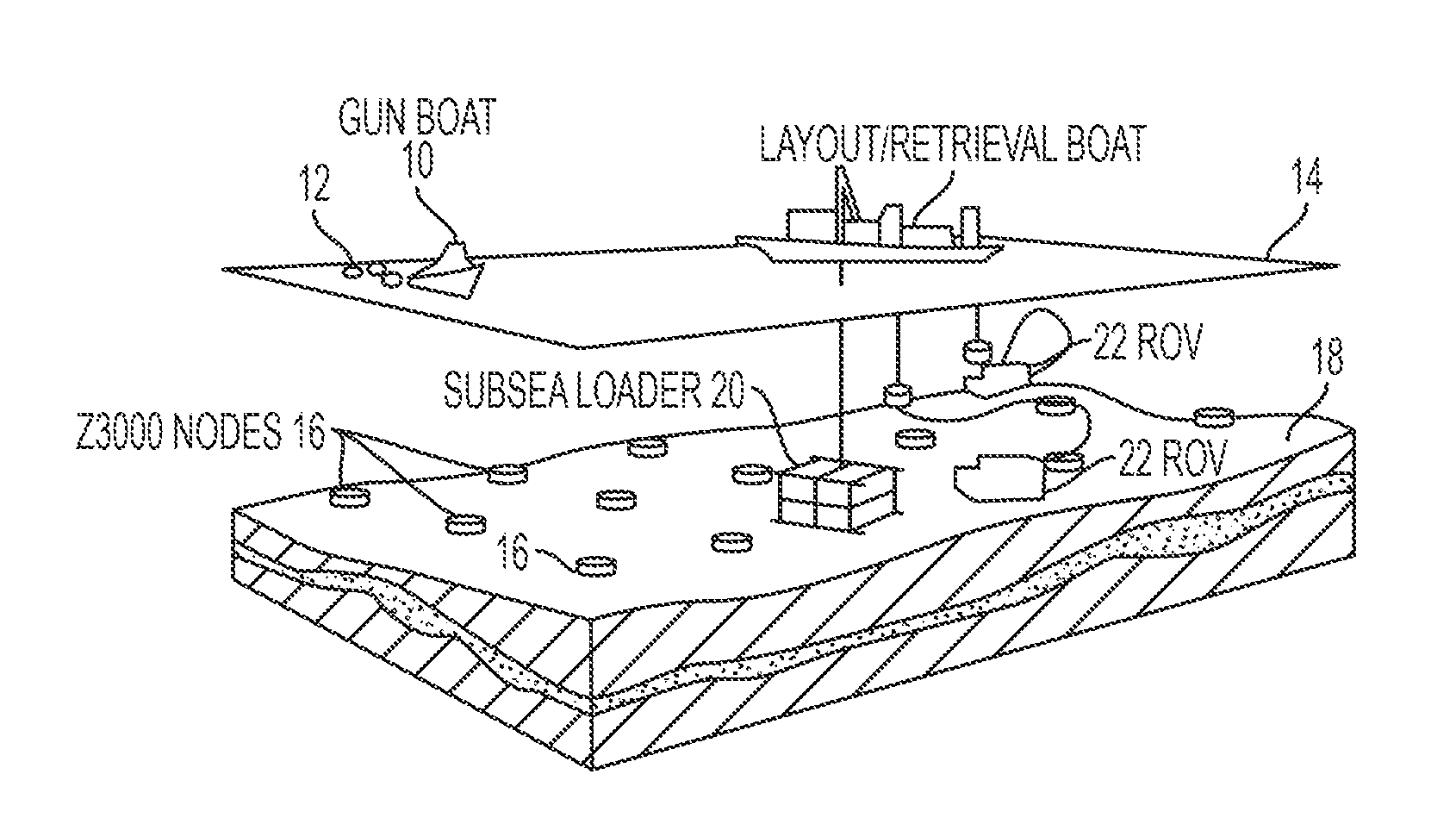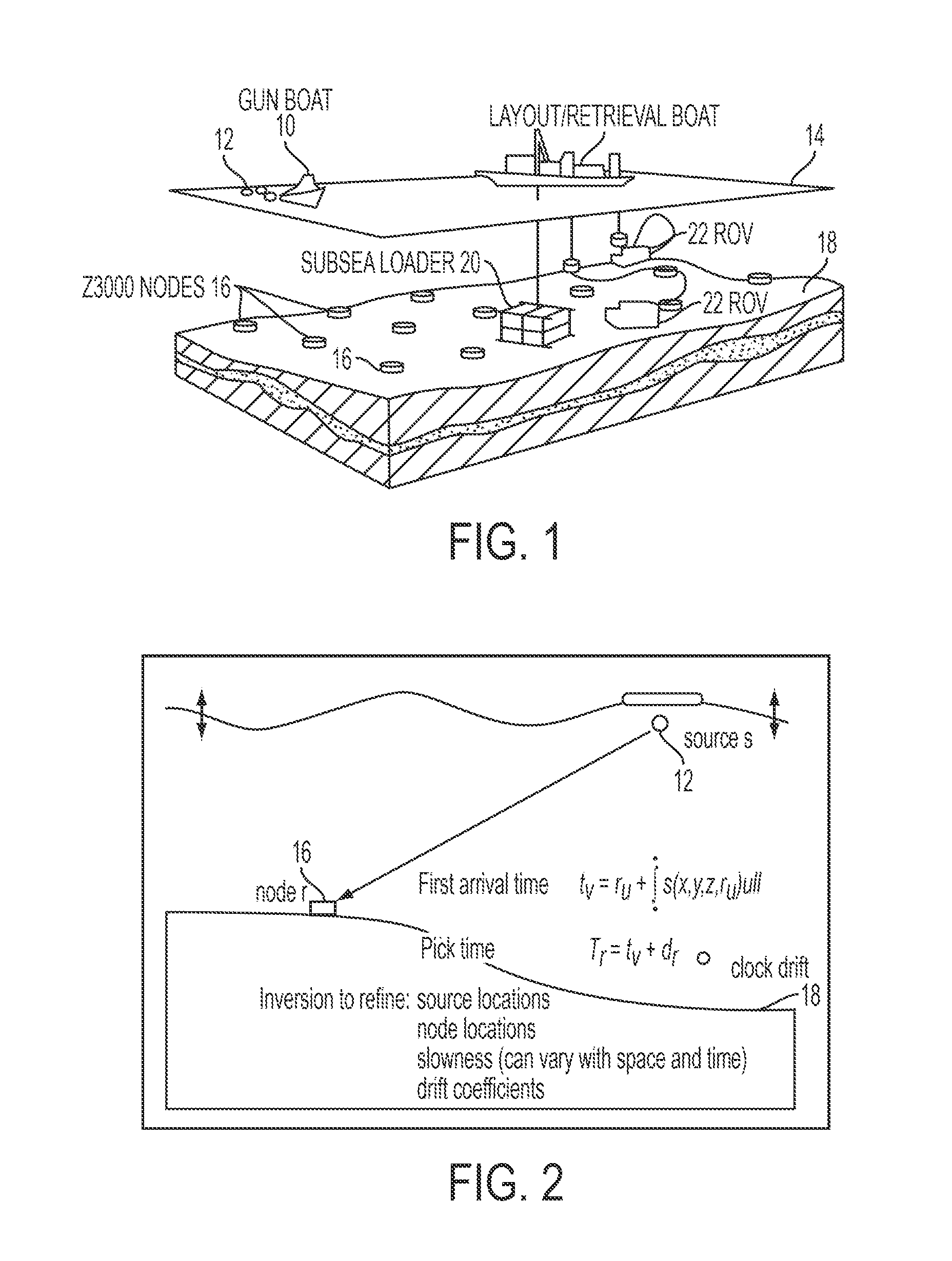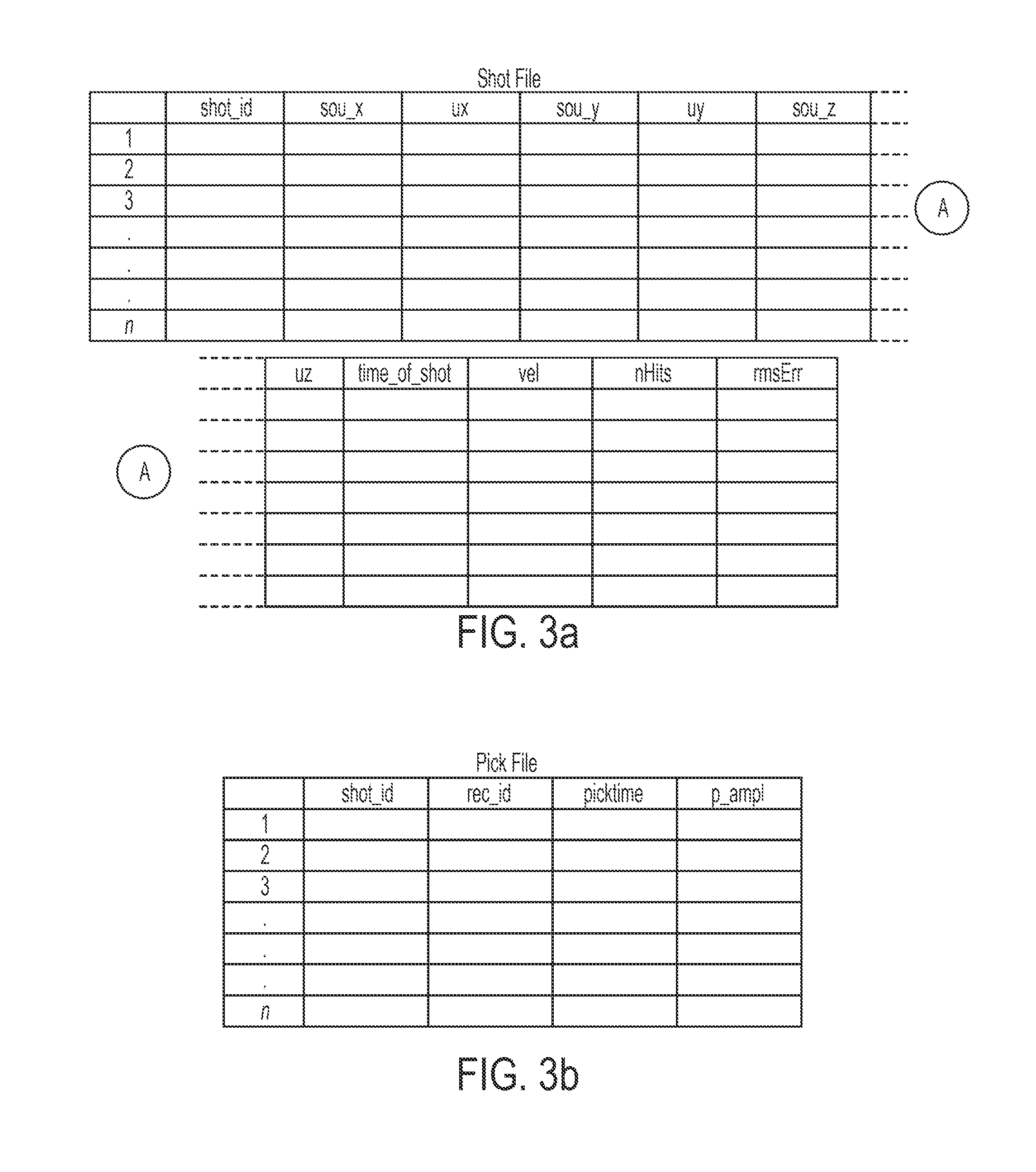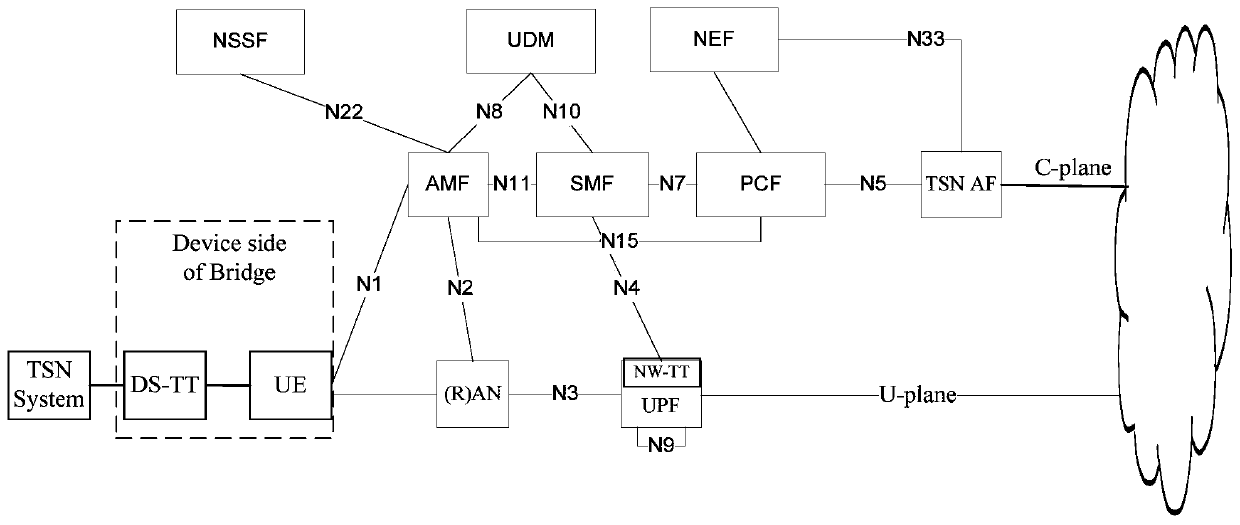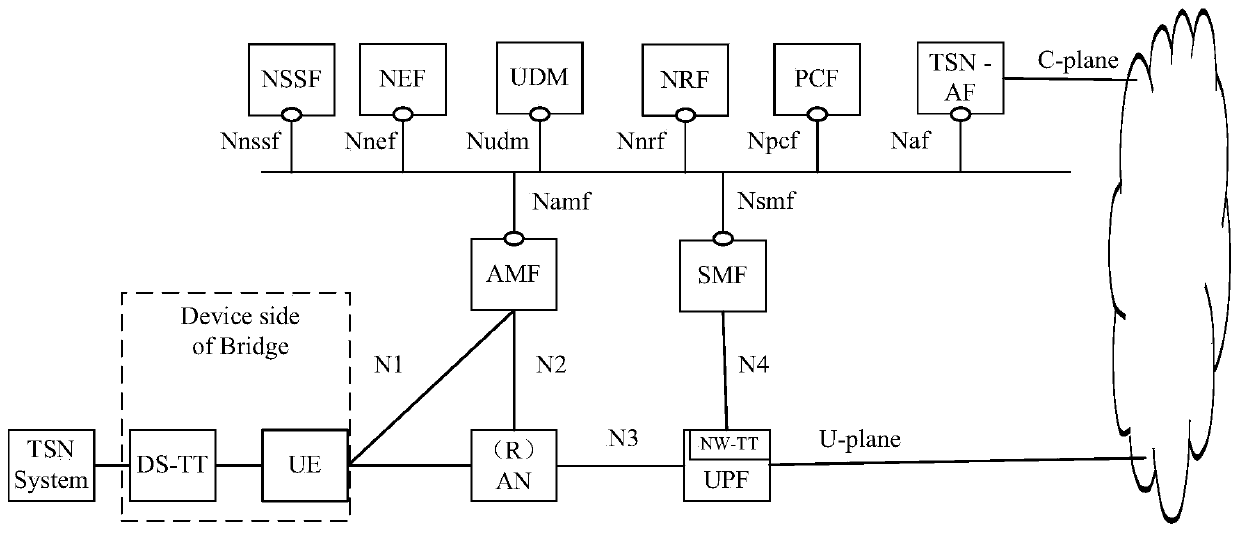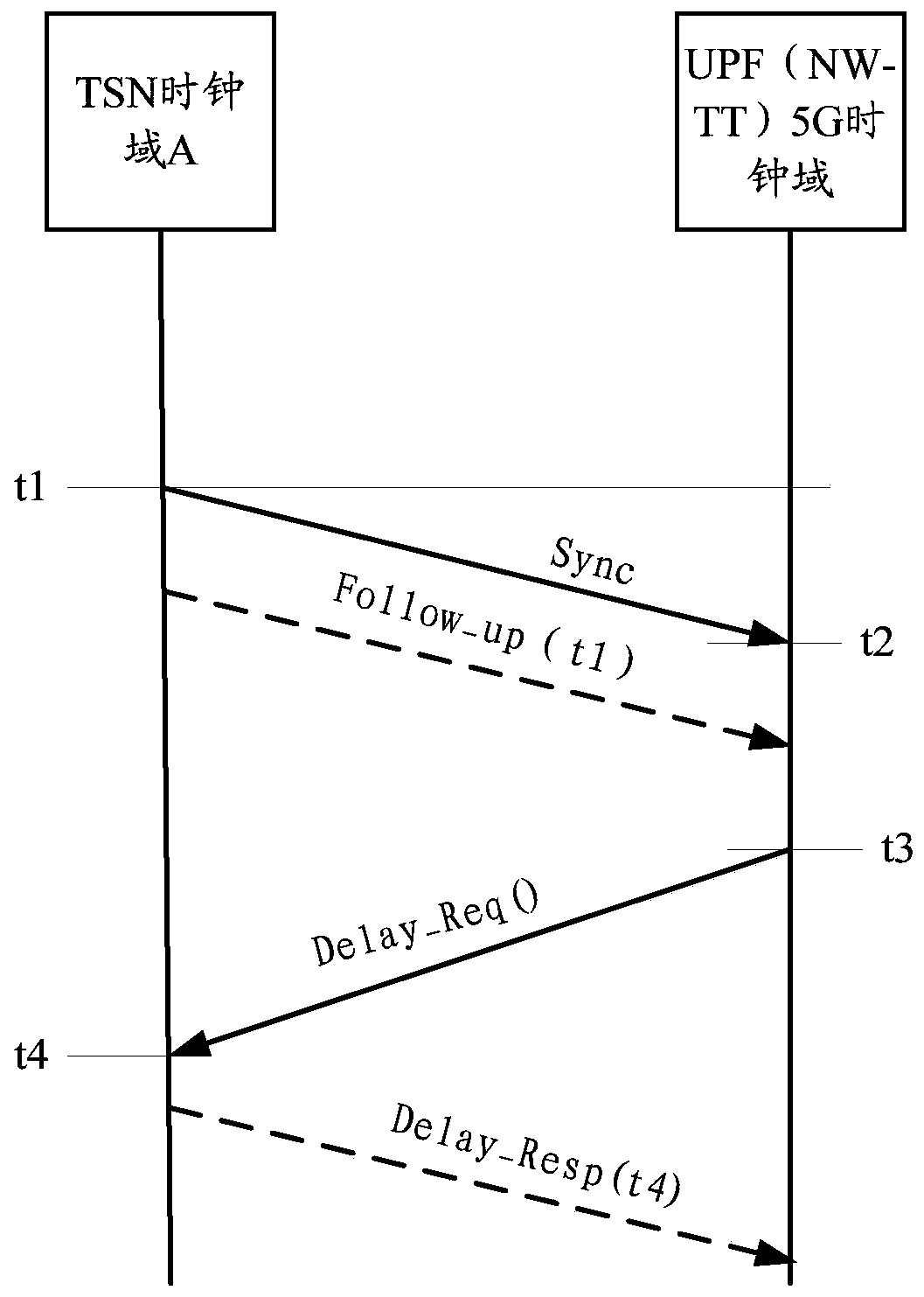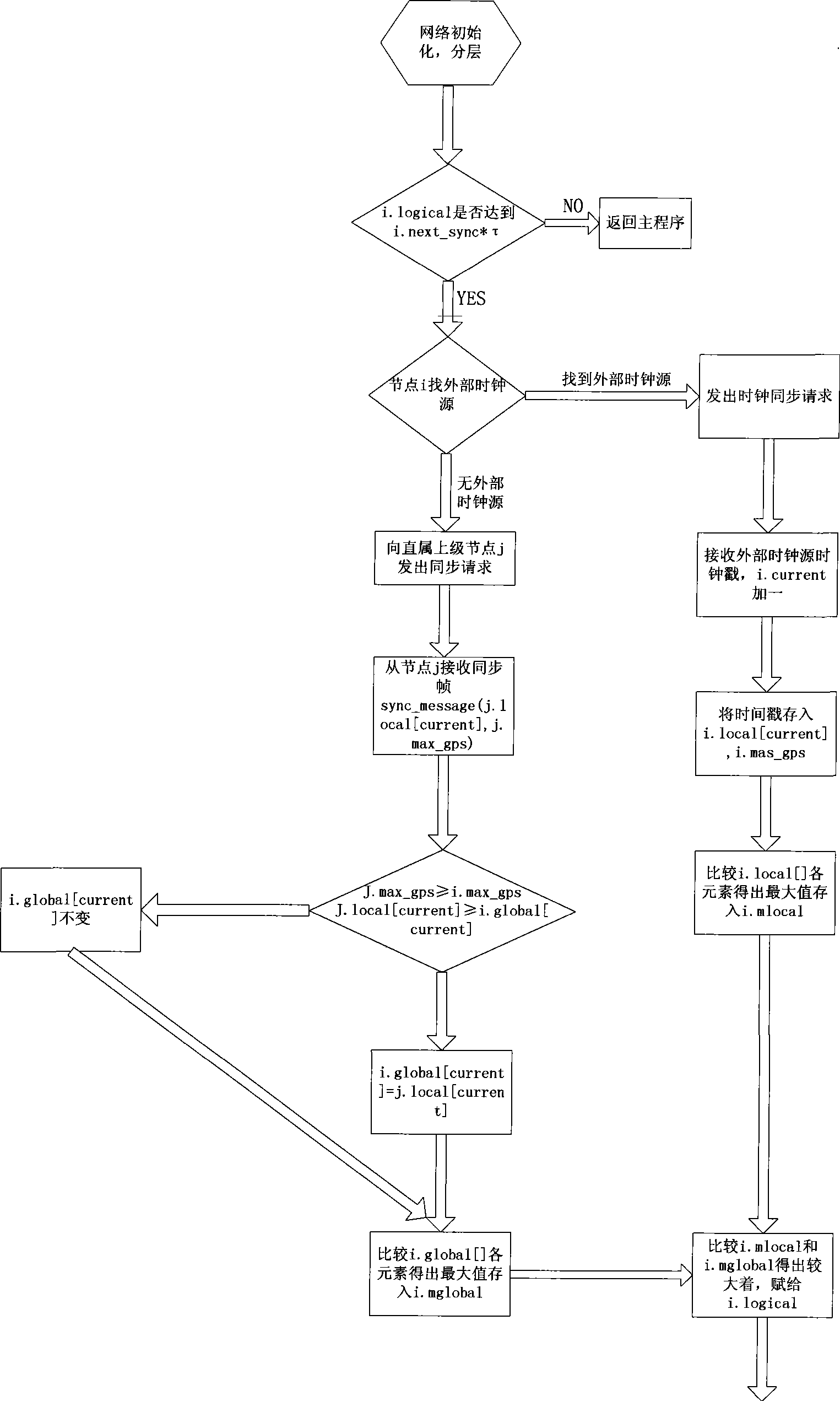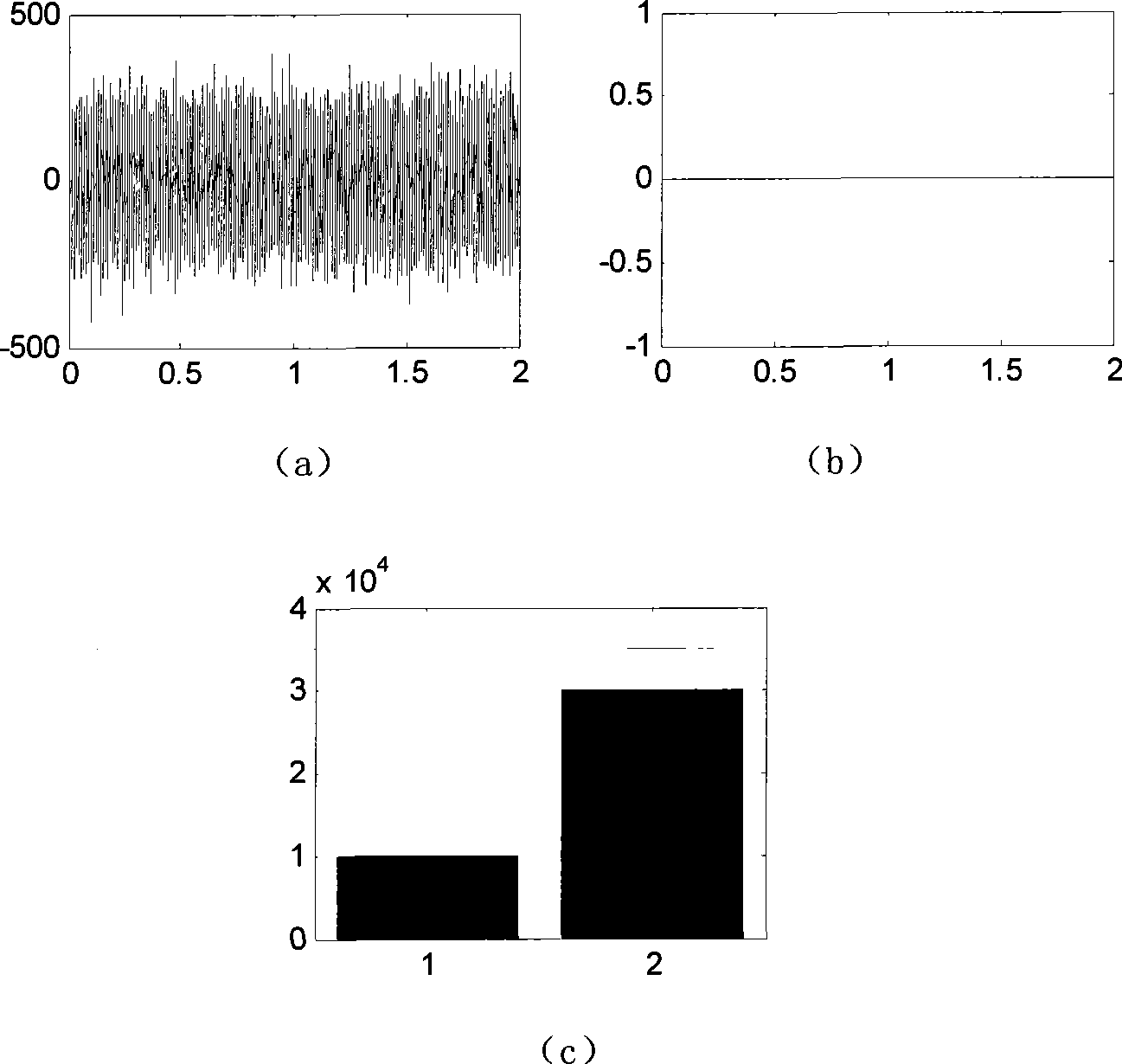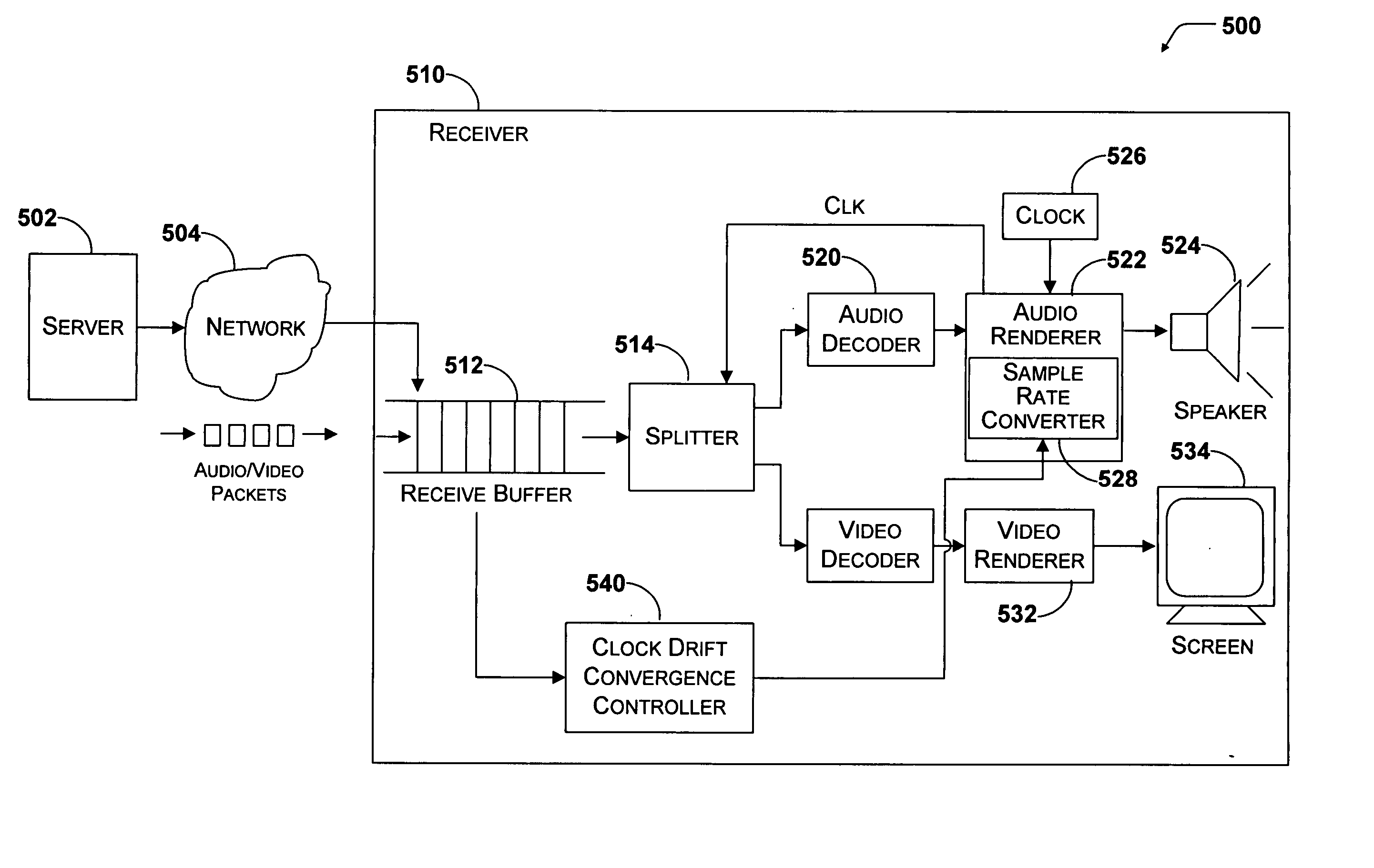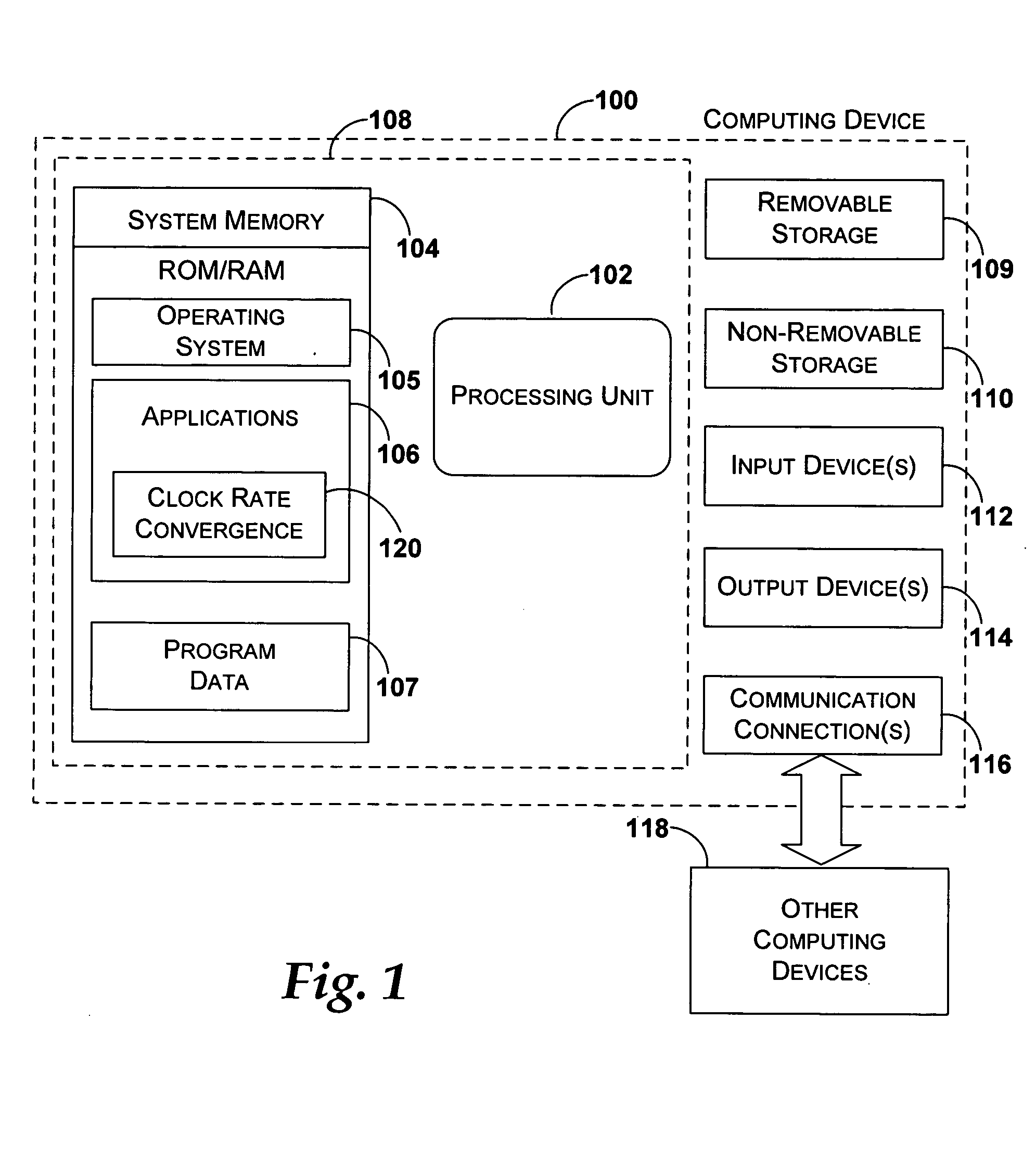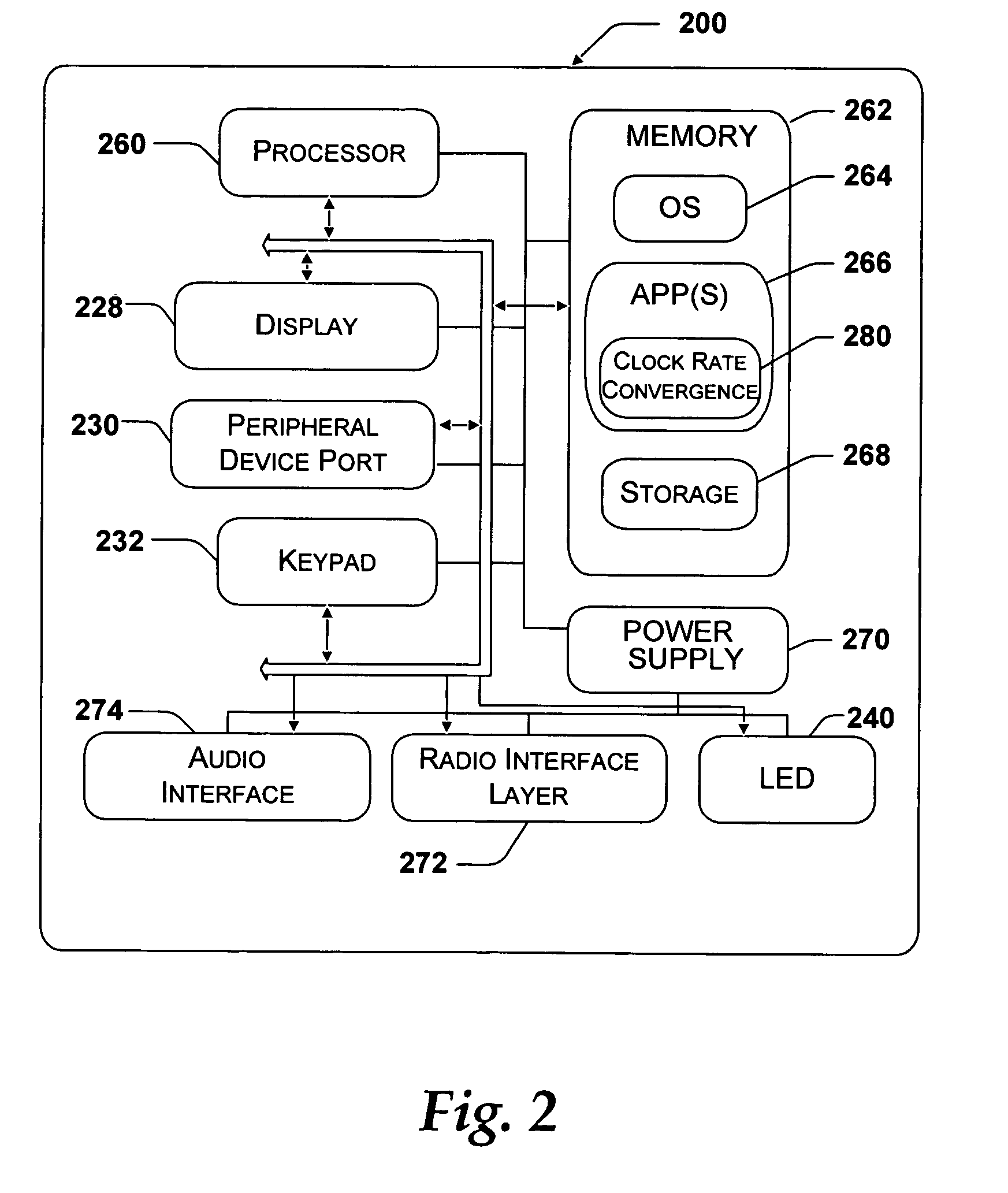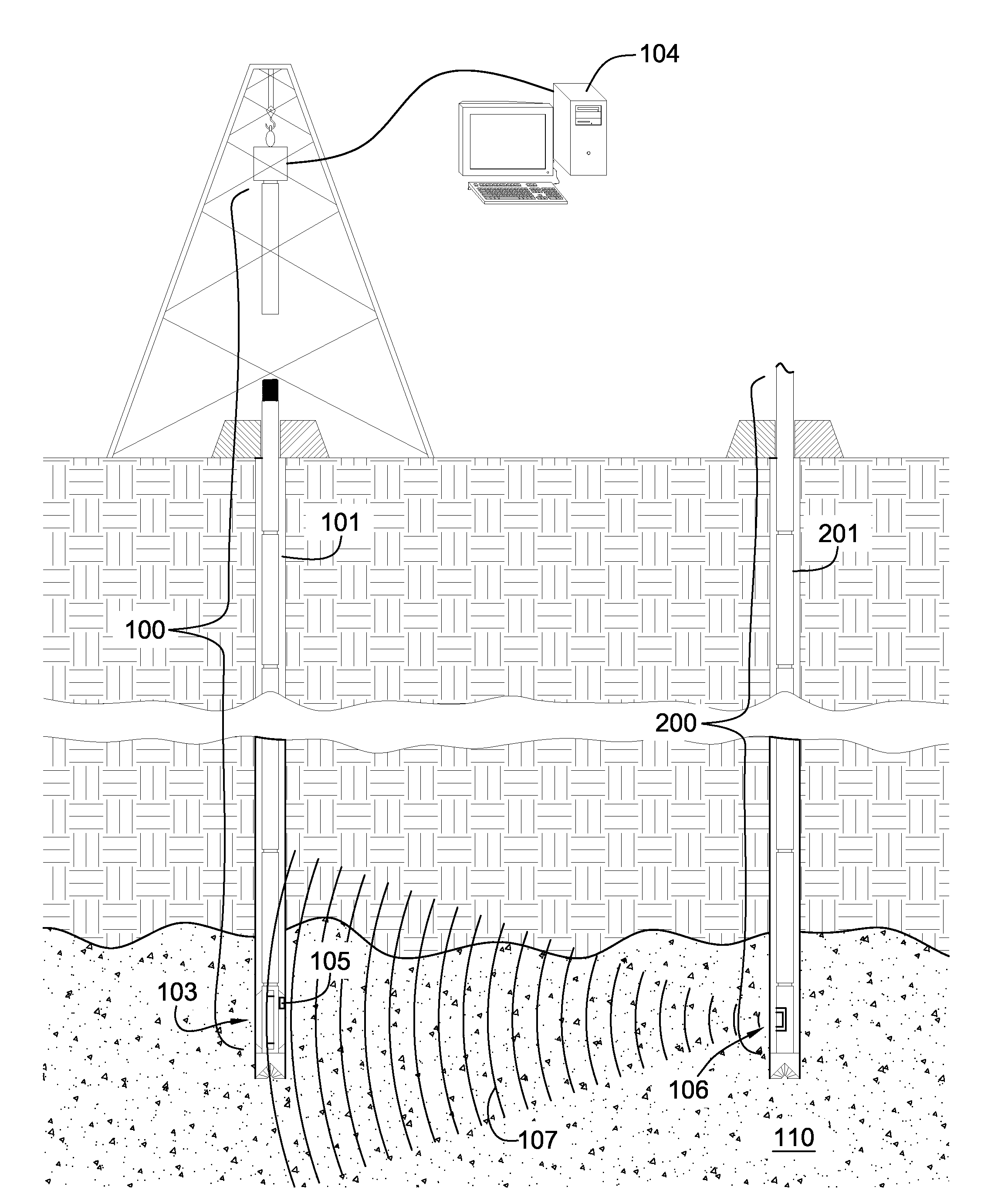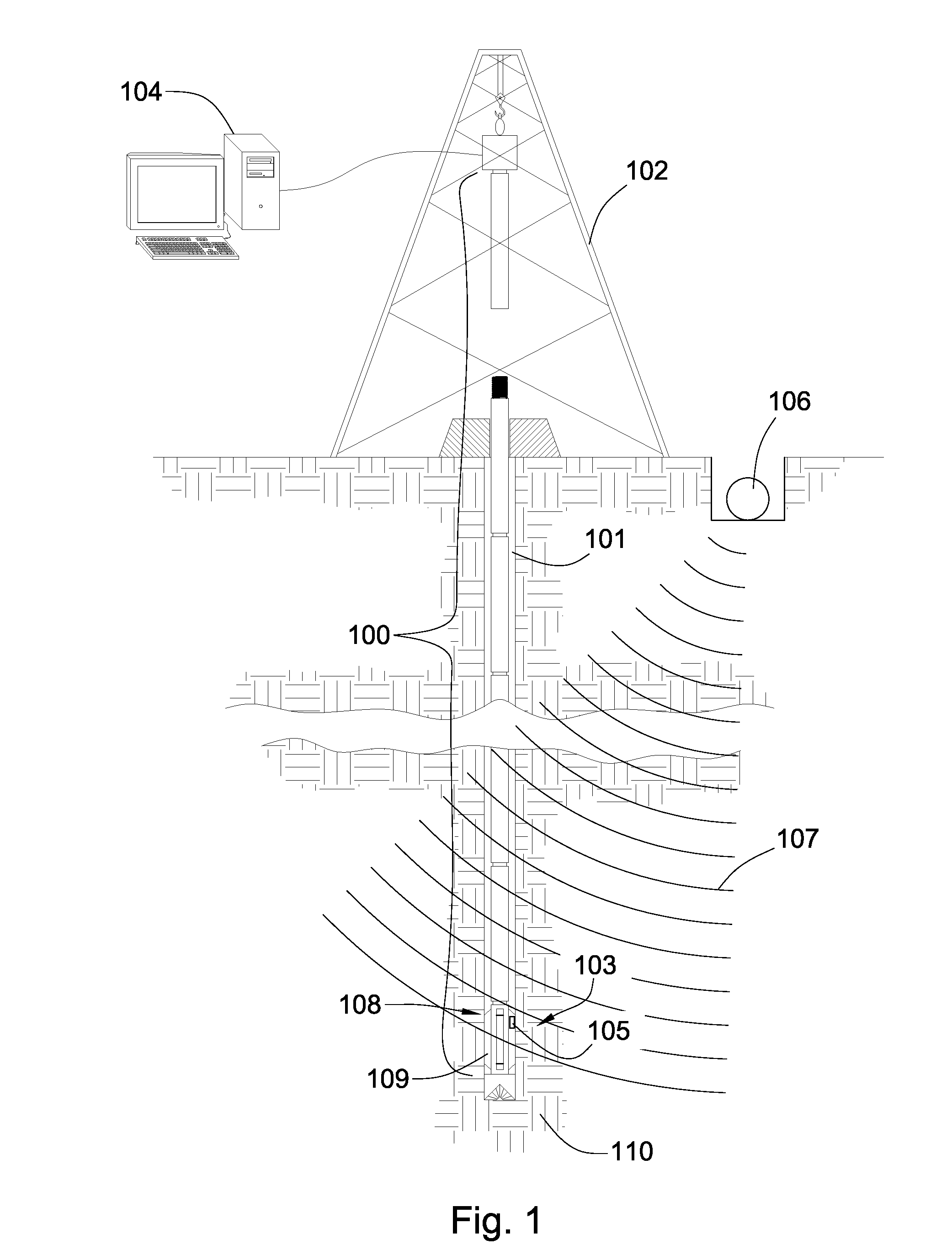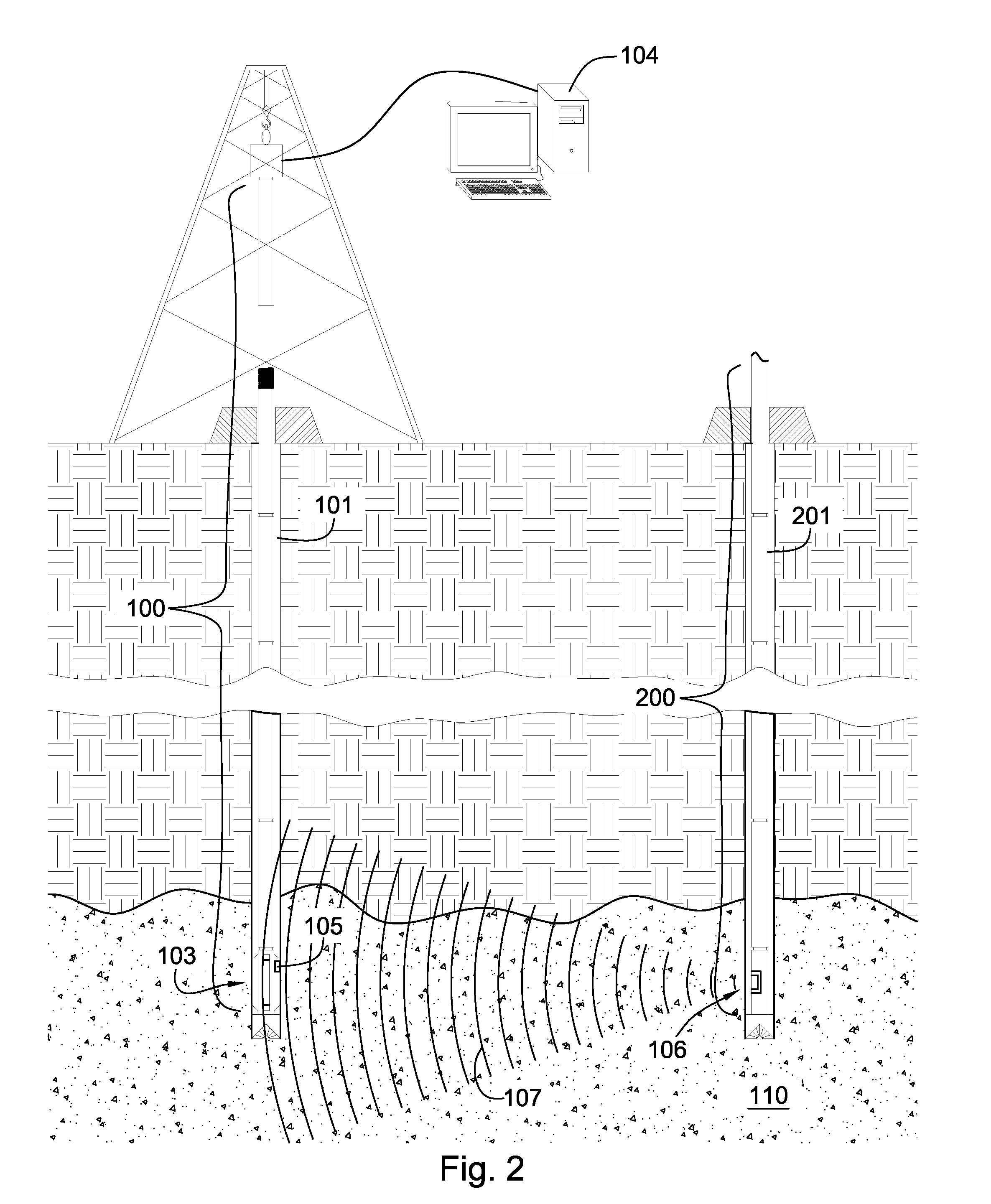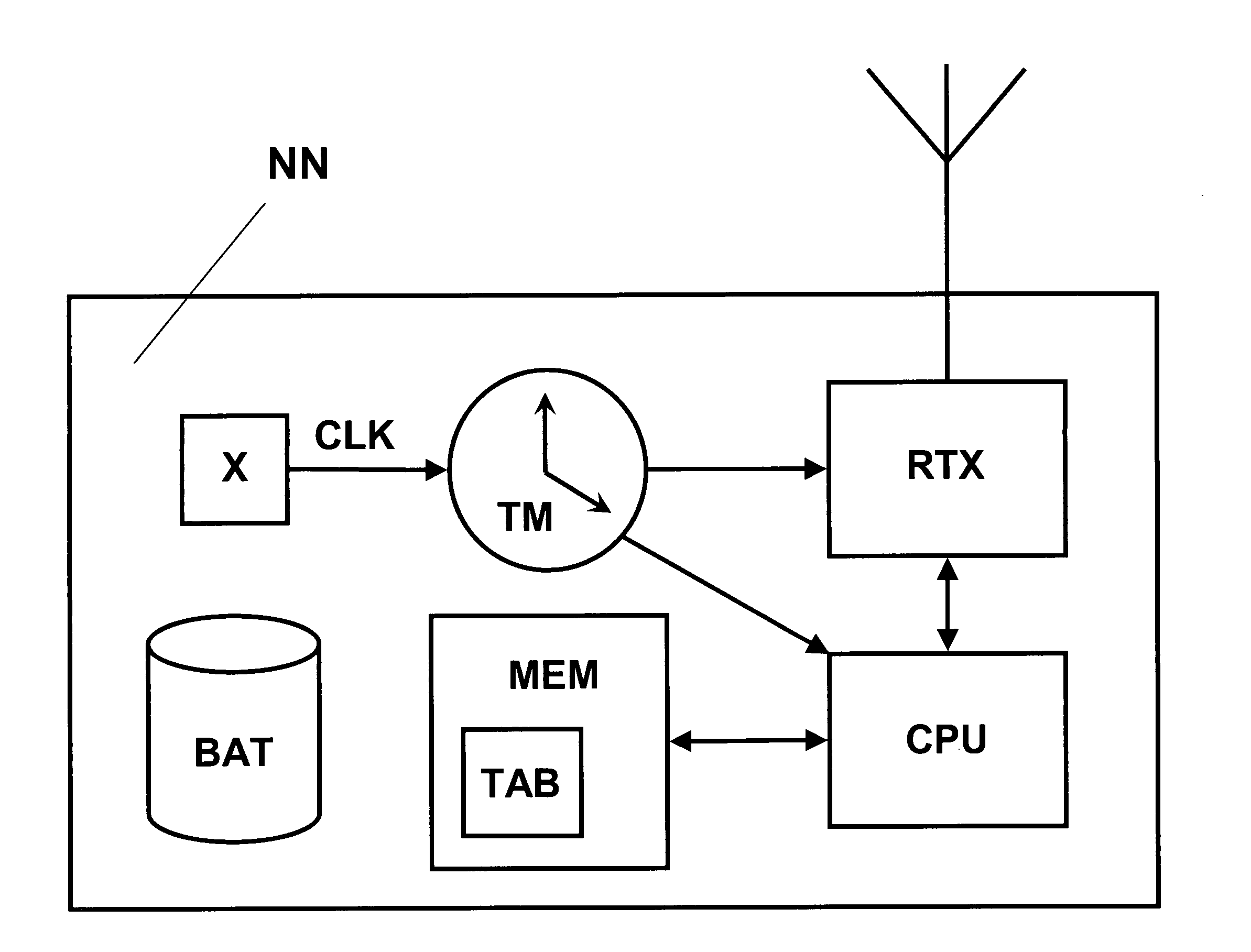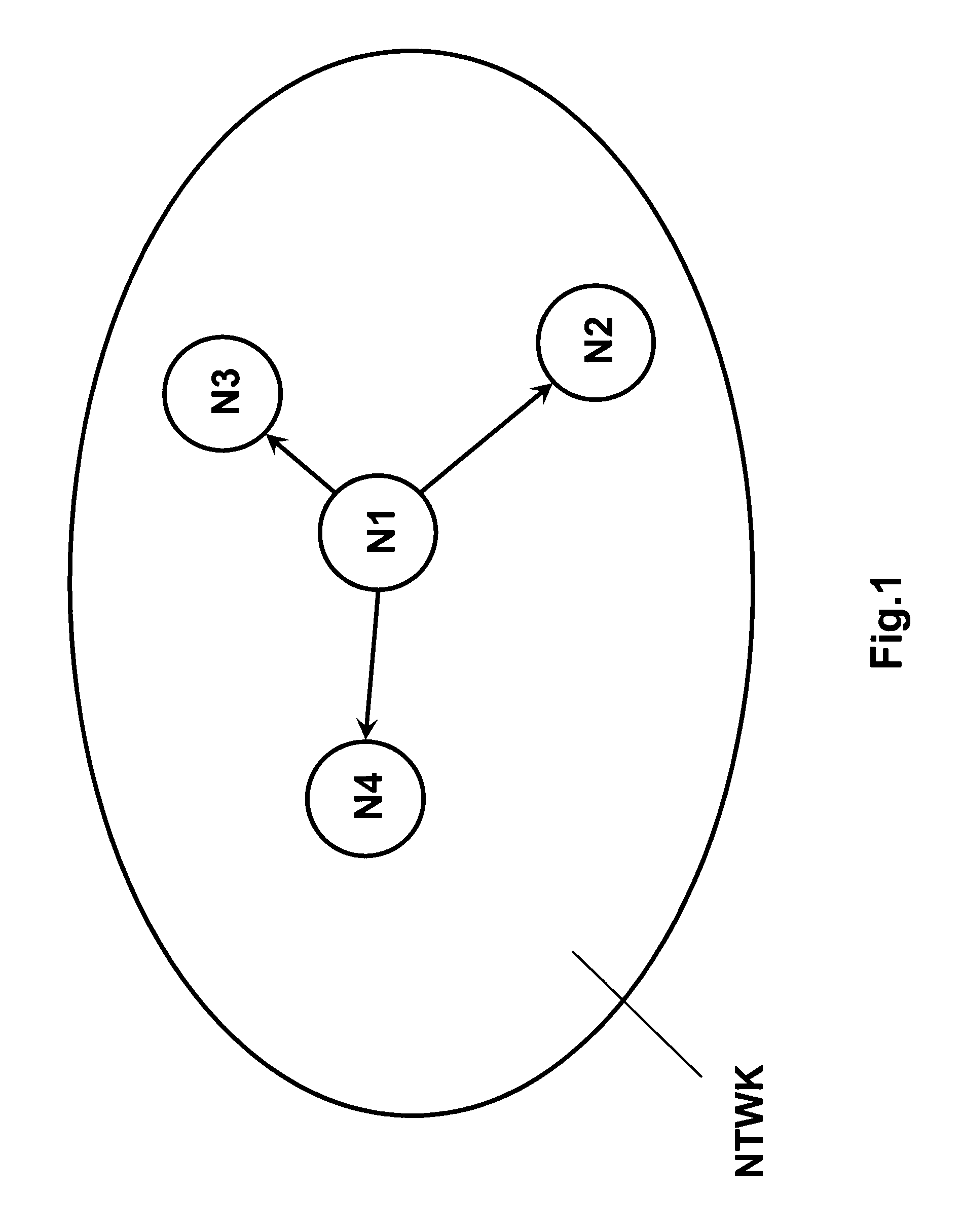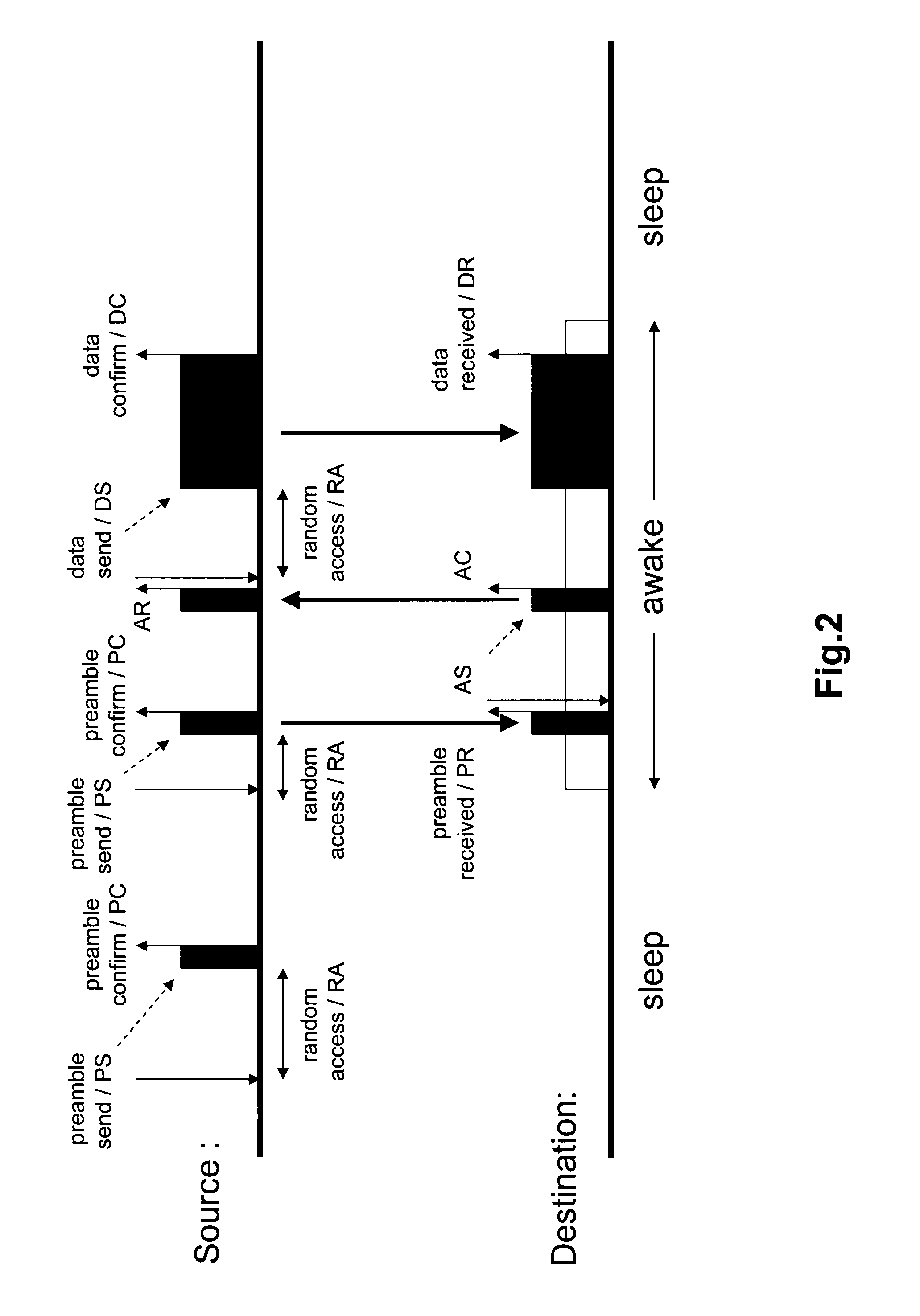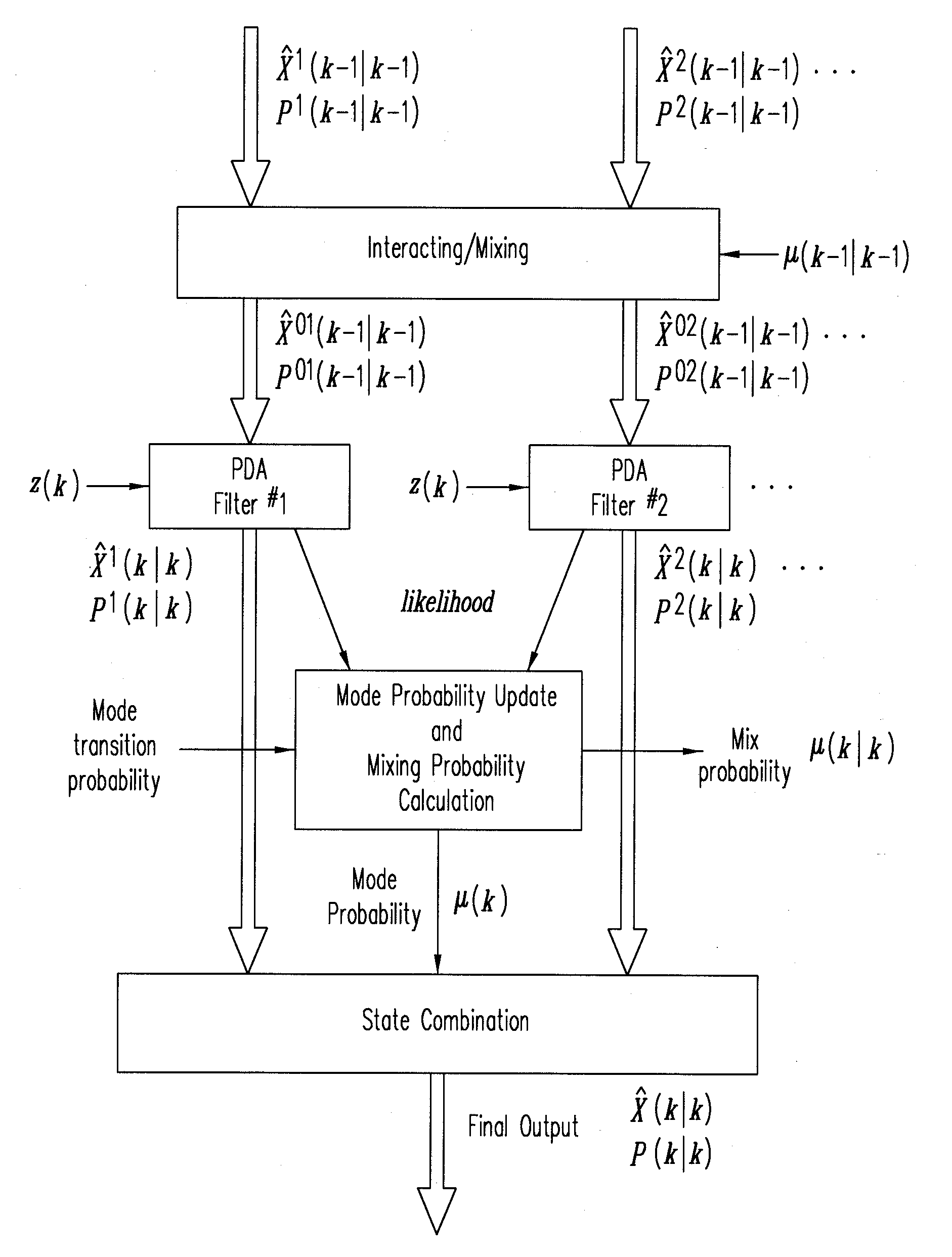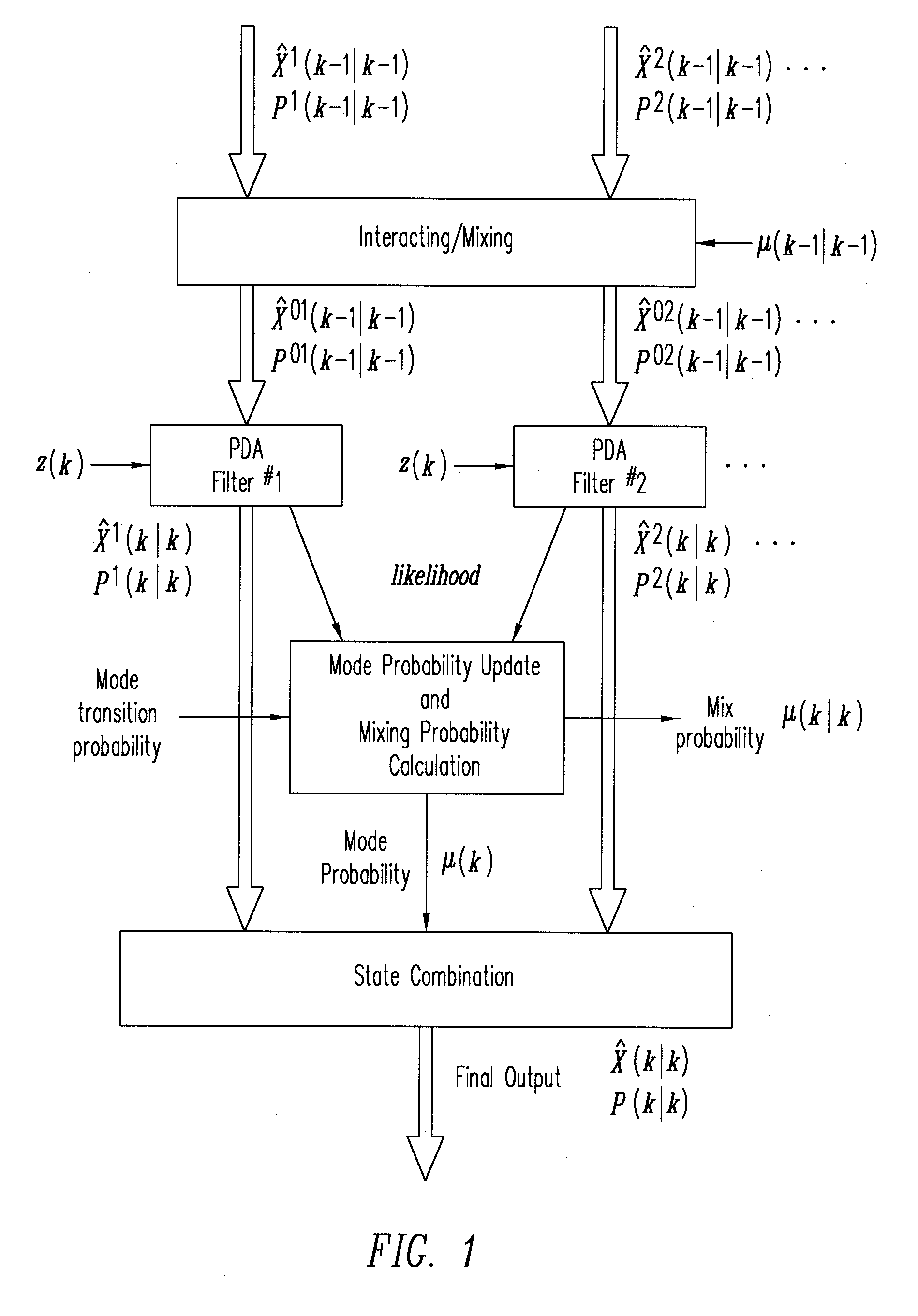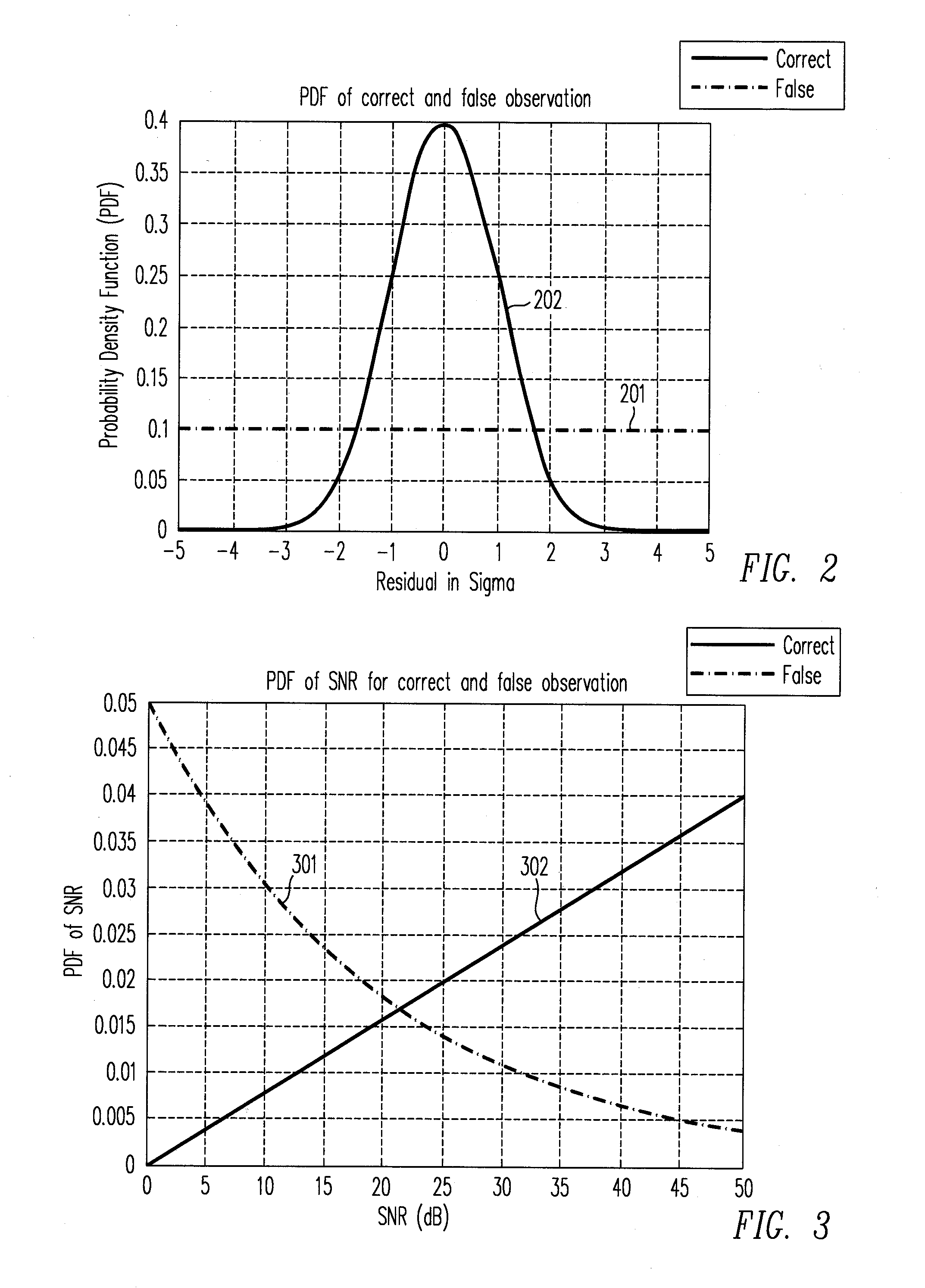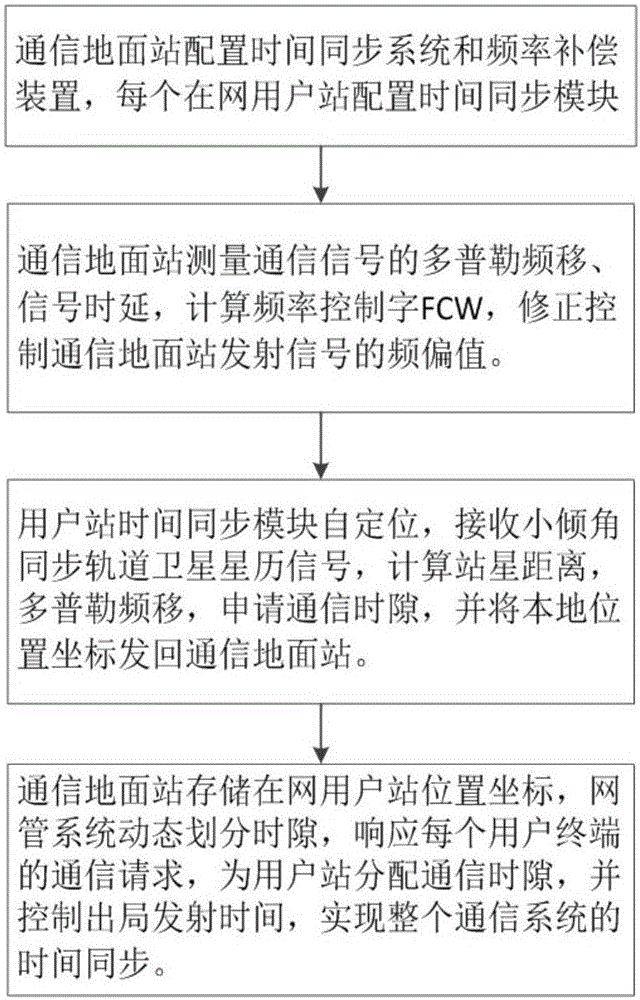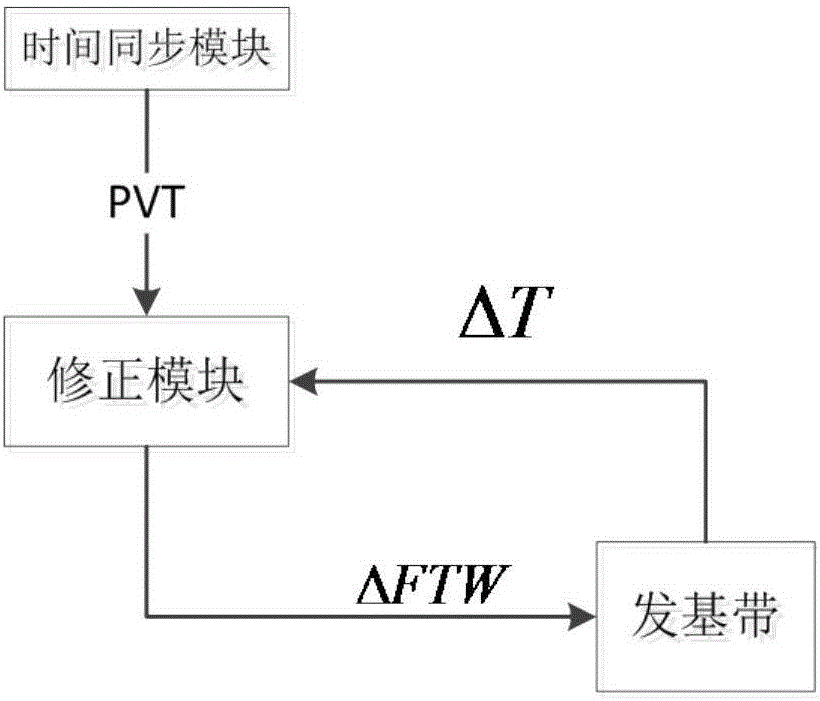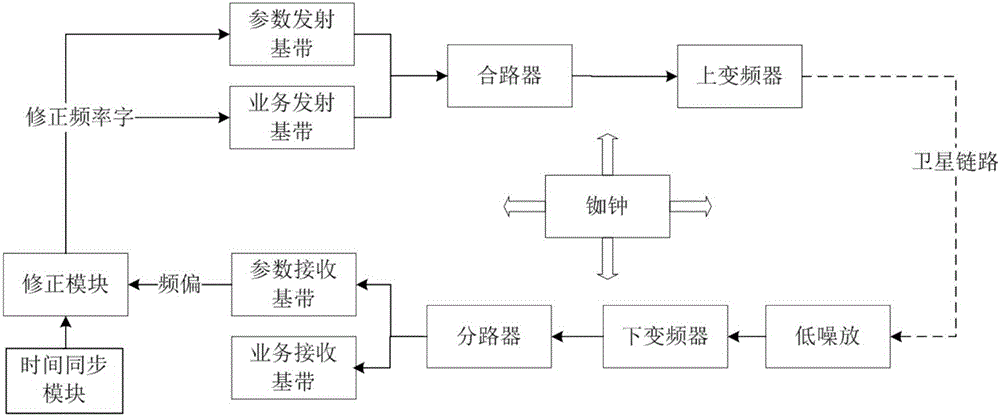Patents
Literature
303 results about "Clock drift" patented technology
Efficacy Topic
Property
Owner
Technical Advancement
Application Domain
Technology Topic
Technology Field Word
Patent Country/Region
Patent Type
Patent Status
Application Year
Inventor
Clock drift refers to several related phenomena where a clock does not run at exactly the same rate as a reference clock. That is, after some time the clock "drifts apart" or gradually desynchronizes from the other clock i.e. the crystal-based clocks used in computers, like any other clocks, subject to clock drift, which means that they count time at different rates and so they diverge. This phenomenon is used, for instance, in computers to build random number generators. On the negative side, clock drift can be exploited by timing attacks.
Ranging system and method
ActiveUS20070200759A1Improve accuracyAccount for uncertaintyDirection finders using radio wavesBeacon systemsClock driftImage resolution
A system and method for estimating the range between two devices performs two or more ranging estimates with subsequent estimates performed using a clock that is offset in phase with respect to a prior estimate. The subsequent estimate allows estimate uncertainties due to a finite clock resolution to be reduced and can yield a range estimate with a higher degree of confidence. In one embodiment, these additional ranging estimates are performed at n / N (for n=1, . . . N−1, with N>1 and a positive integer) clock-period offset introduced in the device. The clock-period offset can be implemented using a number of approaches, and the effect of clock drift in the devices due to relative clock-frequency offset can also be determined. To eliminate the bias due to clock-frequency offset, a system and method to estimate the clock-frequency offset is also presented.
Owner:SAMSUNG ELECTRONICS CO LTD
System and method for synchronizing playback of audio and video
ActiveUS20080187282A1Television system detailsPulse modulation television signal transmissionComputer hardwareVideo player
A system and method for providing a digital In-Flight Entertainment (IFE) system in a vehicle, such as an aircraft, that is capable of presenting a video program and associated audio in a synchronized manner to a large number of individual video monitors and speakers. The system and method employ processing operations in at least one decoder of the IFE system, to perform operations such as adjusting a local clock based on a master clock, setting a delay time in relation to a master clock, and adjusting video and audio playback based on the delay, to substantially synchronize playback of the audio and video data by the audio and video players, to thus eliminate or at least minimize the negative effects of source and load based jitter, network delays, clock drifts, network errors and decoder buffering differences, on synchronizing video and audio playback.
Owner:THALES AVIONICS INC
Systems and methods for interference mitigation with respect to periodic interferers in short-range wireless applications
InactiveUS7079812B2Improve service qualityAvoid interferenceData switching by path configurationTransmission monitoringQuality of serviceTelecommunications link
Several techniques are provided for use by wireless devices to avoid interference with signals that are of a periodic or quasi-periodic nature that may operate in the same frequency band and proximity. In some cases, the periodic signals are detected and their timing is determined so as to predict when a next interfering event will occur. Devices that are affected by the periodic signal (such as an affected device with information to be transmitted or devices that have information to be transmitted to the affected device) are controlled to prevent transmissions during the interfering intervals. In addition, a process is provided to dynamically fragment a transmit frame of information to transmit part of the information before the interfering interval and the remainder of the information after the interfering interval, rather than waiting to transmit the entire frame until after the interfering interval. Moreover, techniques are provided to correct for clock drift between the periodic signal and a device affected by the periodic signal, as well as for clock drift between a device affected by the periodic signal and other devices that communicate with that device. These techniques prevent interference with periodic signals and in so doing, improve the quality of service of the communication link for both the interfering devices and the other devices.
Owner:CISCO TECH INC
Position determination with reference data outage
ActiveUS7576690B2Improve accuracyReduce data volumePosition fixationBeacon systemsClock driftLocation determination
Owner:TRIMBLE NAVIGATION LTD
System and method for correcting the clock drift and maintaining the synchronization of low quality clocks in wireless networks
A system and method for establishing and maintaining node clock synchronization in a wireless network. The system and method calculates the clock shift, clock drift and propagation delay values using a series of message exchanges and control algorithms between a selected reference node and a client node in a wireless network, then uses these values to synchronize the client node clock to the reference node clock.
Owner:ARRIS ENTERPRISES LLC
Adaptive estimation and compensation of clock drift in acoustic echo cancellers
A system and method for adaptive estimation and compensation of clock drift in echo cancellers is provided. The invention includes an acoustic echo cancellation system with a built in adaptive clock drift compensation system. The acoustic echo cancellation system has an AEC component that performs acoustic echo cancellation on data from a capture buffer, by also using information derived from a render buffer. The clock drift compensation system has access to this capture buffer and render buffer. The clock drift compensation system includes a clock drift compensator that calculates, based on the current location of the capture data being processed by the AEC component as well as additional information, the ideal location in the render buffer from which the AEC component should process data. The clock drift compensator further adjusts the current location in the render buffer from which the AEC component processes data based, at least in part, upon this ideal location. The clock drift compensator can further detect and correct for glitches in the hardware positions received from the render and capture devices.
Owner:MICROSOFT TECH LICENSING LLC
Time synchronization method and system for wireless sensor network
ActiveCN102355319AReduce consumptionAvoid consumptionSynchronisation arrangementTime-division multiplexData synchronizationClock drift
The invention discloses a time synchronization method for a wireless sensor network. The method comprises the following steps of: generating a synchronous data packet, and marking a transmission timestamp in the synchronous data packet; transmitting the synchronous data packet to a child node; receiving the synchronous data packet, and marking a receiving timestamp in the synchronous data packet; and compensating for the clock drift of the child node according to the transmission timestamp and the receiving timestamp in the synchronous data packet. By the time synchronization method and the time synchronization system for the wireless sensor network, clock drift compensation between a parent node and the child node is realized only by transmitting the synchronous data packet to the child node to realize regional time synchronization in a region formed by the parent node and the child node, and compared with conventional all-network time synchronization, the regional time synchronization reduces network energy consumption and also can avoid the energy consumption caused by crosstalk interference as much as possible.
Owner:SHENZHEN INST OF ADVANCED TECH CHINESE ACAD OF SCI
Adaptive estimation and compensation of clock drift in acoustic echo cancellers
A system and method for adaptive estimation and compensation of clock drift in echo cancellers is provided. The invention includes an acoustic echo cancellation system with a built in adaptive clock drift compensation system. The acoustic echo cancellation system has an AEC component that performs acoustic echo cancellation on data from a capture buffer, by also using information derived from a render buffer. The clock drift compensation system has access to this capture buffer and render buffer. The clock drift compensation system includes a clock drift compensator that calculates, based on the current location of the capture data being processed by the AEC component as well as additional information, the ideal location in the render buffer from which the AEC component should process data. The clock drift compensator further adjusts the current location in the render buffer from which the AEC component processes data based, at least in part, upon this ideal location. The clock drift compensator can further detect and correct for glitches in the hardware positions received from the render and capture devices.
Owner:MICROSOFT TECH LICENSING LLC
Software time synchronization method for position and orientation system
InactiveCN102183253AHigh precisionImprove time synchronization accuracySynchronous motors for clocksNavigation by speed/acceleration measurementsClock driftCoordinate time
The invention provides a software time synchronization method for a position and orientation system (POS). The POS comprises an inertial measurement unit, a POS navigation computer, a GPS (Global Positioning System) receiver and the like. The time synchronization method comprises the following steps of: firstly synchronizing system time of the POS navigation computer to world coordinated time by using a GPS second pulse sent by the GPS receiver and a time counter; and synchronizing the data acquisition time of the inertial measurement unit with the world coordinated time through a method of correcting a frequency division period of a data acquisition pulse clock of the inertial measurement unit so as to complete the time synchronization of the POS. In the invention, the problem of reducing of synchronization accuracy of the POS in a short time due to the clock drift is solved through the method of changing the frequency division period of the data acquisition pulse clock, and the software time synchronization method has the characteristics of high accuracy and high anti-interference capacity.
Owner:BEIHANG UNIV
Position determination with reference data outage
ActiveUS20090109090A1Improve accuracyReduce data volumePosition fixationBeacon systemsClock driftLocation determination
Position determination at a rover station on the basis of positioning signals from a plurality of positioning satellites. During normal operation a position of the rover station is determined on the basis of the positioning signal from the positioning satellites and reference data received via a separate connection from a reference station. Upon detecting an outage of the reference data from the reference station, error data at least including satellite clock drifts is obtained from error data transmitter and applied in the determination process in order to eliminate positioning errors introduced by satellite clock drifts that cannot be compensated on the basis of the reference data due to the outage.
Owner:TRIMBLE NAVIGATION LTD
Memory systems and methods for dynamically phase adjusting a write strobe and data to account for receive-clock drift
A memory system includes a memory controller that writes data to and reads data from a memory device. A write data strobe accompanying the write data indicates to the memory device when the write data is valid, whereas a read strobe accompanying data from the memory device indicates to the memory controller when the read data is valid. The memory controller adaptively controls the phase of the write strobe to compensate for timing drift at the memory device. The memory controller uses the read strobe as a measure of the drift.
Owner:RAMBUS INC
System and method for precision acoustic event detection
ActiveUS20060161339A1High precisionImprove accuracyInstruments for road network navigationDirection finders using ultrasonic/sonic/infrasonic wavesSensor arrayClock drift
A system and method for providing precision locations for sensors which make up an array of sensors in a gunshot detection system. In a preferred embodiment sensors employ a commercial GPS which reports a sensor position or a group of pseudoranges to GPS satellites. A server collects differential information from a differential node and, in one preferred embodiment, calculates a precision position for each sensor by adjusting the reported position or pseudoranges with the differential information. In another preferred embodiment differential information is sent from the host to individual sensors which calculate their own precision positions. Differential information may be latitude and longitude corrections, pseudorange corrections, ionospheric delay, GPS satellite clock drift, or other corrective term which will improve the accuracy of a sensor position.
Owner:SHOTSPOTTER
Maintaining Time of Day Synchronization
A technique for maintaining time synchronization between network nodes involves broadcasting a timing signal from a source node to its neighbors. The timing signal is transmitted in a dedicated source time slot of a super epoch comprising a number of epochs each having a number of time slots. A reply timing signal is received at the source node from a neighboring node designated as the destination node, where the reply timing signal is received in a dedicated destination time slot of the super epoch. The clock drift and propagation delay between the source and destination nodes are computed at the source node. At the neighboring nodes other than the destination node, clock drift can be computed using previous estimates of propagation delay. RTS and CTS exchanges from PTP packets can also be used to estimate the propagation delay in the source node and the clock drift in the destination node.
Owner:HARRIS GLOBAL COMM INC
Position attitude system hardware time synchronizing method
InactiveCN101067656AHigh data time synchronization accuracyHigh synchronization accuracyPosition fixationFluid speed measurement using thermal variablesClock driftGps receiver
The invention is a hardware synchronizing method for position and orientation system (POS), relating to a method for synchronizing various sensor data in the POS, firstly using GPS receiver-outputted GPS second pulse signal accurately synchronous with UTC time (Coordinate Universal Time) to synchronize the system time of the POS with the UTC time, then generating UTC time-containing hardware synchronous pulse through system timer and collecting various sensor data, and then implementing synchronization of various sensor data in the POS. And the invention uses GPS second pulse to real-timely correct system clock drift and implements GPS signal monitoring and thus has features of high synchronizing accuracy, good adaptability and high reliability.
Owner:BEIHANG UNIV
Method for precisely synchronizing time of industrial wireless network on basis of prediction and compensation
The invention relates to technologies for industrial wireless networks, in particular to a method for precisely synchronizing time of an industrial wireless network on the basis of prediction and compensation. The method includes constructing the factory-automation-oriented industrial wireless network into a star network on the basis of an IEEE (institute of electrical and electronics engineers) 802.11 single-hop basic service set (BBS) structure; setting a master clock and slave clocks according to types and functions of nodes in the industrial wireless network; enabling a master clock side and slave clock sides to interact with one another via two-way timestamp information and computing a time deviation value of a current synchronizing cycle; predicting a time deviation value of a next synchronizing cycle by the aid of the time deviation value of the current synchronizing cycle; compensating clock drift by the aid of the predicted time deviation value of the next synchronizing cycle and correcting the clocks. The method has the advantages that the method is implemented on the premise that application requirements of factory automation are sufficiently considered, so that high time synchronization precision can be realized by the aid of few wireless communication resources, and purposes of high precision, high efficiency, low expenditure and easiness in implementation can be achieved.
Owner:SHENYANG INST OF AUTOMATION - CHINESE ACAD OF SCI
System and method for accurate determination of ocean bottom seismometer positioning and timing
ActiveUS20110273958A1Extension of timeImprove accuracySeismology for water-covered areasOcean bottom seismometerClock drift
There is provided herein a system and method of seismic exploration that produces improved locations and timings for ocean bottom seismometers. The instant method utilizes linearized inversion in conjunction with a conventionally accurate clock to provide both time and positioning for each OBS unit with high accuracy as compared with the prior art approach. Inversion is one mathematical tool that effectively performs the requisite triangulation. Furthermore, the clock drift can be accounted for in the inversion scheme. The inversion not only determines the OBS position and shot timing errors, but also estimates the accuracy of the position and timing determination.
Owner:BP CORP NORTH AMERICA INC +1
Method and system for clock drift compensation
ActiveUS20090185695A1Solve problemsTwo-way loud-speaking telephone systemsEar treatmentClock timeTime domain
Different sampling rates between a playout unit and a capture unit are compensated for via a system, method and computer program product. The playout unit receives samples from a computational unit, and the capture unit sends samples to the computational unit. A playout FIFO buffer operates in a playout time domain, and a capture FIFO buffer operates in a capture time domain. The computational unit is synchronized to a common clock. A first relationship is calculated between the common clock and a playout fifo buffer read pointer, and a second relationship is calculated between the common clock and a capture FIFO buffer write pointer. For each sample in the playout time domain a corresponding sample in the samples from said computational unit is found and sent to the playout FIFO buffer. For each sample in the common clock time domain the corresponding sample in the capture time domain is found and sent to the computational unit.
Owner:CISCO TECH INC
Method an apparatus for adjusting the time of a clock if it is determined that the degree of adjustment is within a limit based on the clocks initial time
InactiveUS7266714B2Digital data processing detailsError detection/correctionComputer hardwareClock drift
A free-running secure clock in a computing device that is adjustable by a user of the device so long as cumulative adjustments do not exceed a predicted clock drift. The clock may be initially set by the user or by a trusted time authority or the like. Such a clock may be required in a trust-based system that measures a temporal requirement against the clock.
Owner:DOLBY LAB LICENSING CORP
Byzantine fault quantifying clock synchronization
InactiveUS20050089131A1Counters with additional facilitiesCounting objects on conveyorsClock driftRemote computing
The clocks of remote computing devices are synchronized within a range of certainty through the determination of an upper bound and a lower bound around a reference time. A message from a computing device is propagated up a network tree of devices to a device having a reference time, which encodes the reference time and returns the message down the tree. Each receiving device can determine that the reference time could not have occurred before their transmission of the message, nor could it have occurred after their receipt of the return message. Cryptographic hashes can be used to guard against malicious computing devices. Alternate paths and scheduling of messages can be used to provide a narrower spread between the upper and lower bounds, and clock drift can be accounted for by increasing the spread over time.
Owner:MICROSOFT TECH LICENSING LLC
Processing method for streaming media buffer
InactiveCN101662676AGuaranteed reasonable useReduce latency issuesPulse modulation television signal transmissionTwo-way working systemsClock driftBuffer zone
The invention relates to web television streaming media technology, in particular to a processing method for streaming media buffer. The invention discloses a processing method streaming media bufferand solves the problem that a signaling feedback mode adopted for processing the synchronization of the streaming media in the prior art increases the burden of a server and affects the quality and efficiency of the video display. The processing method has the technical scheme that the processing method comprises the following steps: a. capturing video streaming, resolving and obtaining video streaming code rate and network average rate; b. setting three threshold values and dividing a buffer zone into four sections; c. computing the maximal length of the buffer zone and the usage rate of thecurrent buffer zone; d. carrying out on decoding play rate adjustment on a decoding playback module according to the section positions of the usage rate of the current buffer zone in the four sectionsof the buffer zone. The invention has the beneficial effects that the processing method can effectively relieve network time delay and vibration phenomenon and solves the clock drift problem, thus increasing the quantity and efficiency of the video play and being suitable for streaming media play.
Owner:SICHUAN CHANGHONG ELECTRIC CO LTD
Virtual loop carrier system with network clock recovery
InactiveUS6982993B1Lower unit costGood serviceTime-division multiplexNetwork connectionsClock driftTelecommunications link
A loop carrier system includes a home local area network having plural telephone modules and a hub coupled to in-home telephone wiring. The telephone modules and the hub communicate voice signals over the in-home wiring in a dedicated frequency band above baseband POTS. The hub converts between voice signals and voice packets and is connected to a network access device for transferring the voice packets from the home local area network to a telecommunications network which routes the voice packets to a gateway. The gateway converts between the voice packets and a circuit format compatible with a local digital voice switch. The home local area network includes a timing recovery mechanism which in the absence of a clock that is traceable to the Primary Reference Clock on the public network is robust to clock drift, cell delay variation and cell impairments.
Owner:CISCO TECH INC
System and method for precision acoustic event detection
ActiveUS7420878B2High positioning accuracyImprove accuracyDirection finders using ultrasonic/sonic/infrasonic wavesPosition fixationSensor arrayClock drift
A system and method for providing precision locations for sensors which make up an array of sensors in a gunshot detection system. In a preferred embodiment sensors employ a commercial GPS which reports a sensor position or a group of pseudoranges to GPS satellites. A server collects differential information from a differential node and, in one preferred embodiment, calculates a precision position for each sensor by adjusting the reported position or pseudoranges with the differential information. In another preferred embodiment differential information is sent from the host to individual sensors which calculate their own precision positions. Differential information may be latitude and longitude corrections, pseudorange corrections, ionospheric delay, GPS satellite clock drift, or other corrective term which will improve the accuracy of a sensor position.
Owner:SHOTSPOTTER
Seismic data analysis using ocean bottom node data collection
ActiveUS20150168576A1Error minimizationSeismic signal processingSeismology for water-covered areasOcean bottomTime error
The present invention permits RMS traveltime error in a seismic data acquisition to be minimized. Field measurements of source and receiver coordinates, speed of sound in water as a function of depth and time, receiver timing, and clock drift are first collected. The seismic data is then examined to measure travel time from each source to each reciever. A model travel time can then be computed based on the field measurements. By iteratively perturbing at least one of the field measured data using a look-up table and calculating the travel time after each perturbation until an acceptable RMS error has been achieved, conditioned seismic data that takes into account the dynamic nature of the water column will provide the basis for creating an accurate seismic map that is unaffected by the changing water conditions.
Owner:FAIRFIELD INDUSTRIES INC
Clock drift processing method, network function network element and storage medium
ActiveCN110213007AReduce overheadSynchronisation arrangementTime-division multiplexData streamWireless mesh network
The invention discloses a clock drift processing method. The SMF network element can obtain the drift amplitude value of the clock domain of the data network relative to the clock domain of the wireless network. Then, the drift amplitude value is sent to a UPF network element; the UPF network element sends a notification message to the SMF network element only when detecting that the drift maximumvalue is greater than the drift amplitude value; in this way, the process that the SMF network element initiates PDU session modification is triggered, the updated TSCAI is sent to the RAN device, and therefore when precise time control over the data flow of the clock domain of the data network is achieved, signaling expenditure can be saved.
Owner:TENCENT TECH (SHENZHEN) CO LTD
Synchronization method for layered time comparative clock in wireless sensor network
InactiveCN101466142AReduce overheadReduce synchronization errorSynchronisation arrangementNetwork topologiesClock driftTimestamp
Disclosed is a layered time comparative clock synchronized method in the wireless sensor network, which belongs to the wireless network technology field. The method comprises the following steps: step one, the network initialization is started, and the network is layered from a basic station / a coordinator according to the signal intensity and the device category; step two, the whole network is divided into outer clock source synchronization and inner clock source synchronization, the nodes are synchronized by adopting the timestamp comparative method, and the upper-level nodes and the lower-level nodes respectively take the outer clock source synchronization and the inner clock source synchronization; step three, the synchronizing cycle and the clock drift parameter are regulated according to previous synchronization effects; step four, the old timestamp is automatically discarded. Compared with prior art, the method can better correspond with the accuracy of the wireless sensor network time synchronization method, and has the advantages of low cost and solidity.
Owner:SHANGHAI JIAO TONG UNIV
System and method for clock drift correction for broadcast audio/video streaming
InactiveUS20060104397A1Add depthError preventionFrequency-division multiplex detailsStreaming dataClock drift
A clock rate used in rendering broadcast streaming audio / video data is adjusted to converge on a clock rate associated with broadcasting the streaming data. The clock rate is adjusted by monitoring the buffer depth associated with a receive buffer that stores the incoming streaming data. The buffer depth provides an estimate of clock drift between the two clock rates. From the estimate of clock drift, the clock rate used in rendering broadcast streaming data is adjusted to avoid the clock drift causing skips or pauses in the rendered audio / video data.
Owner:MICROSOFT TECH LICENSING LLC
Method for taking seismic measurements
InactiveUS20080217057A1Enhanced couplingImprove collection efficiencySurveySeismology for water-loggingClock driftSignal source
In one aspect of the present invention a method has steps for taking downhole measurements. A network integrated into a downhole tool string in a well bore may be in communication with a downhole sensor, the downhole sensor having a downhole clock that may be in communication over the network with and synchronized with a top-hole clock source. A signal source may be within a transmitting distance of the downhole sensor and may be activated. The downhole sensor records signals from the signal source at a recorded time when the network is disconnected from the top-hole clock source. When the network is reconnected, the downhole clock and the top-hole clock source are re-synchronized. The clock drift that occurred during the disconnection may be calculated. The recorded time may be adjusted to reflect what it would have been if the downhole clock had been synchronized with the top-hole clock source.
Owner:SCHLUMBERGER TECH CORP
Method for transmitting information packets within an asynchronous wireless communication network and network node implementing it
ActiveUS20110128869A1Accurate start timeEnhance information transmissionPower managementSynchronisation arrangementClock driftStart time
A source node estimates not only the schedule time offset of the destination node but also the clock drift of the destination node. In this way, the source node may choose very accurately the transmission start time of an information packet to this destination node so that typically only one very short preamble needs to be transmitted. The estimation of time offset and clock drift between two nodes is achieved through tone or more previous transmissions between these two nodes, in particular, information relating to these parameters is transmitted from the destination node to the source node in reply to a preamble transmitted by the source node to the destination node.
Owner:TELECOM ITALIA SPA +1
GPS navigation using interacting multiple model (IMM) estimator and probabilistic data association filter (PDAF)
InactiveUS20080246653A1Improve navigation performancePosition fixationNavigation instrumentsClock driftAlgorithm
A method for GPS navigation which uses an interacting multiple-model (IMM) estimator with a probabilistic data association filter (PDAF) improves navigation performance. The method includes (a) providing two or more models of GPS navigation, with each model characterized by a model state vector which is updated periodically, (b) providing for each model a corresponding filter for deriving, for each period, a current value for the corresponding model state vector based on current measurements made on parameters affecting the corresponding state vector; and (c) applying an interacting multiple model (IMM) estimator to provide, for each period, a current value for a system state vector using the current values of the model state vectors for that period and their corresponding filters. Each model state vector may include one or more of the following: variables: 3-dimensional position, 3-dimensional velocity, satellite clock bias, satellite clock drifts and one or more other satellite parameters. The current value of the system state vector may be a weighted average of the current values of the model state vectors, where the weights are a set of mode probabilities. In addition, one or more of the filters is a probabilitic data association filter (PDAF).
Owner:CSR TECH INC
Time synchronization method, communication ground station and user terminal
ActiveCN105871495ARealize network-wide time synchronizationHigh speedTime-division multiplexClock driftSystem capacity
The invention discloses a time synchronization method and a time synchronization device based on small inclination synchronous orbit satellite communication system. The time synchronization device provided by the invention comprises a communication ground station and a user terminal, used for performing Doppler frequency compensation on received and transmitted signals, time synchronization on the whole network and pre-deviation on frequency of the transmitted signal. According to the method and device, the variation of a path and the Doppler frequency deviation of signals between the user terminal and the SIGSO satellite can be compensated based on the terminal; the communication ground station measures and compensates the path delay, Doppler frequency deviation and satellite transponder clock drifting between the communication ground station and the satellite; via time synchronization and pre-deviation on transmitting frequency, the communication ground station and the transmitter of the user terminal ensure that the time when the signal arrives the communication ground station or the terminal is just the begin of a communication time slot distributed by the system, which can greatly improve the capture speed of the communication signal, and thus the system capacity of the communication system is improved, and the unit communication cost is reduced.
Owner:NAT ASTRONOMICAL OBSERVATORIES CHINESE ACAD OF SCI
Features
- R&D
- Intellectual Property
- Life Sciences
- Materials
- Tech Scout
Why Patsnap Eureka
- Unparalleled Data Quality
- Higher Quality Content
- 60% Fewer Hallucinations
Social media
Patsnap Eureka Blog
Learn More Browse by: Latest US Patents, China's latest patents, Technical Efficacy Thesaurus, Application Domain, Technology Topic, Popular Technical Reports.
© 2025 PatSnap. All rights reserved.Legal|Privacy policy|Modern Slavery Act Transparency Statement|Sitemap|About US| Contact US: help@patsnap.com
